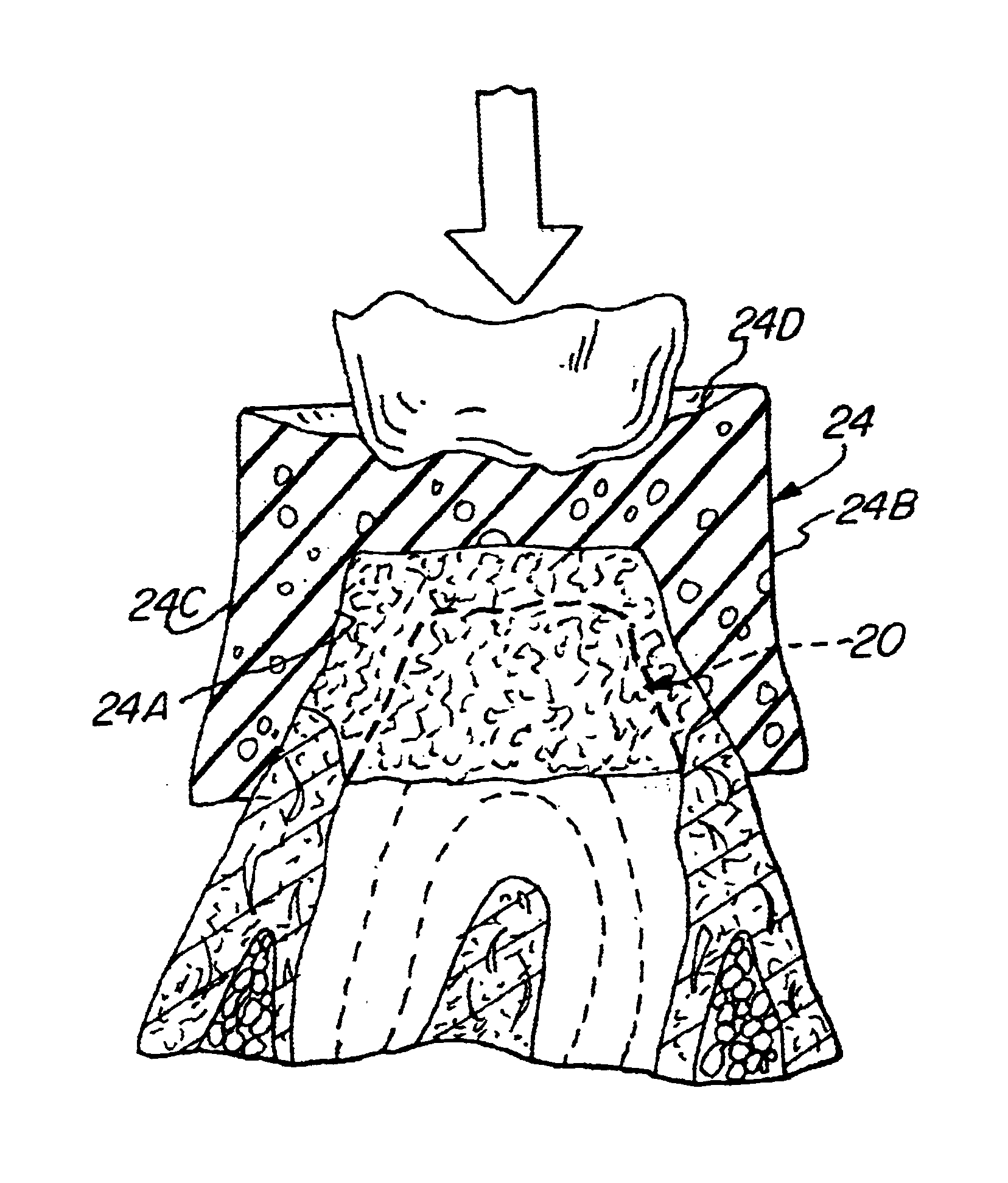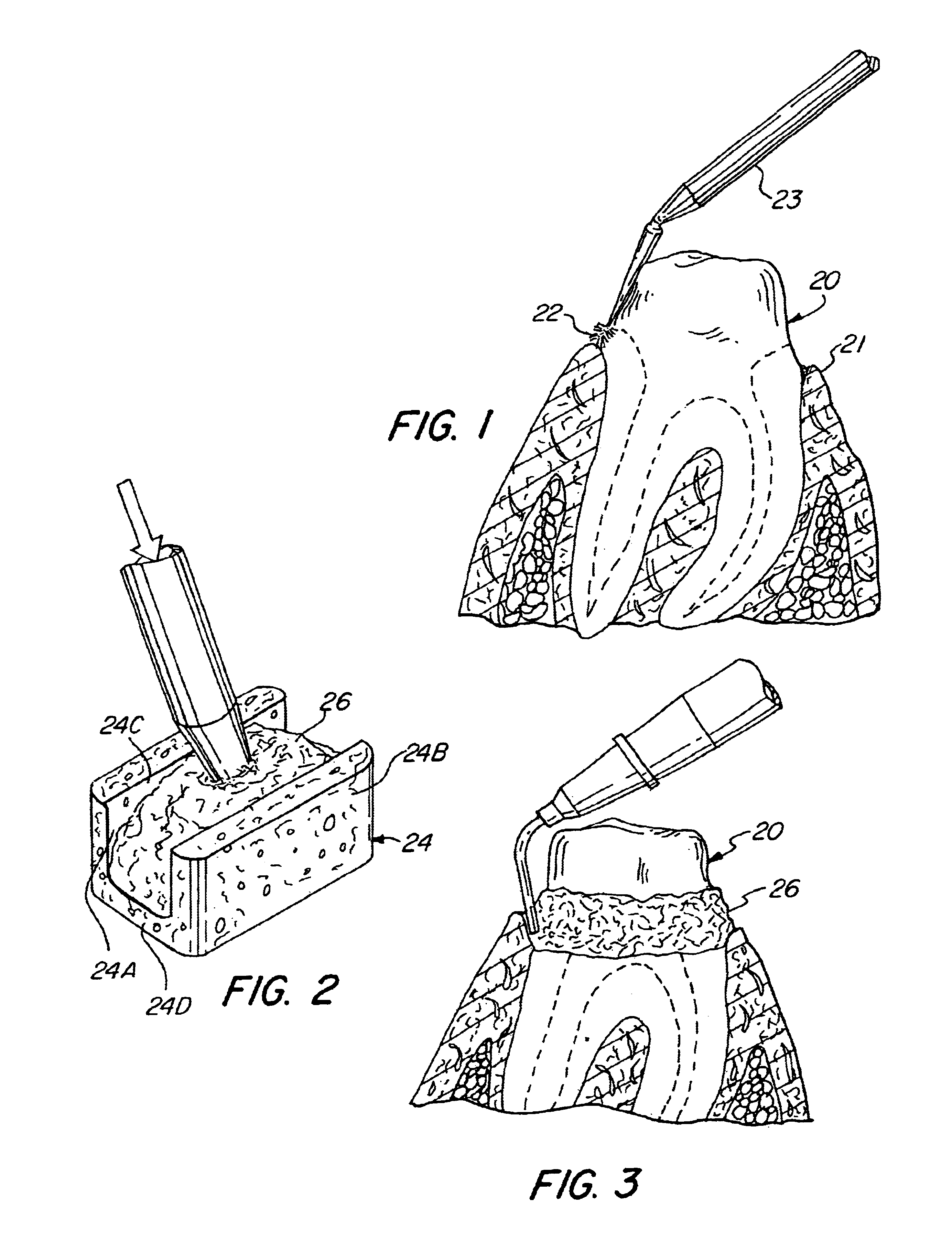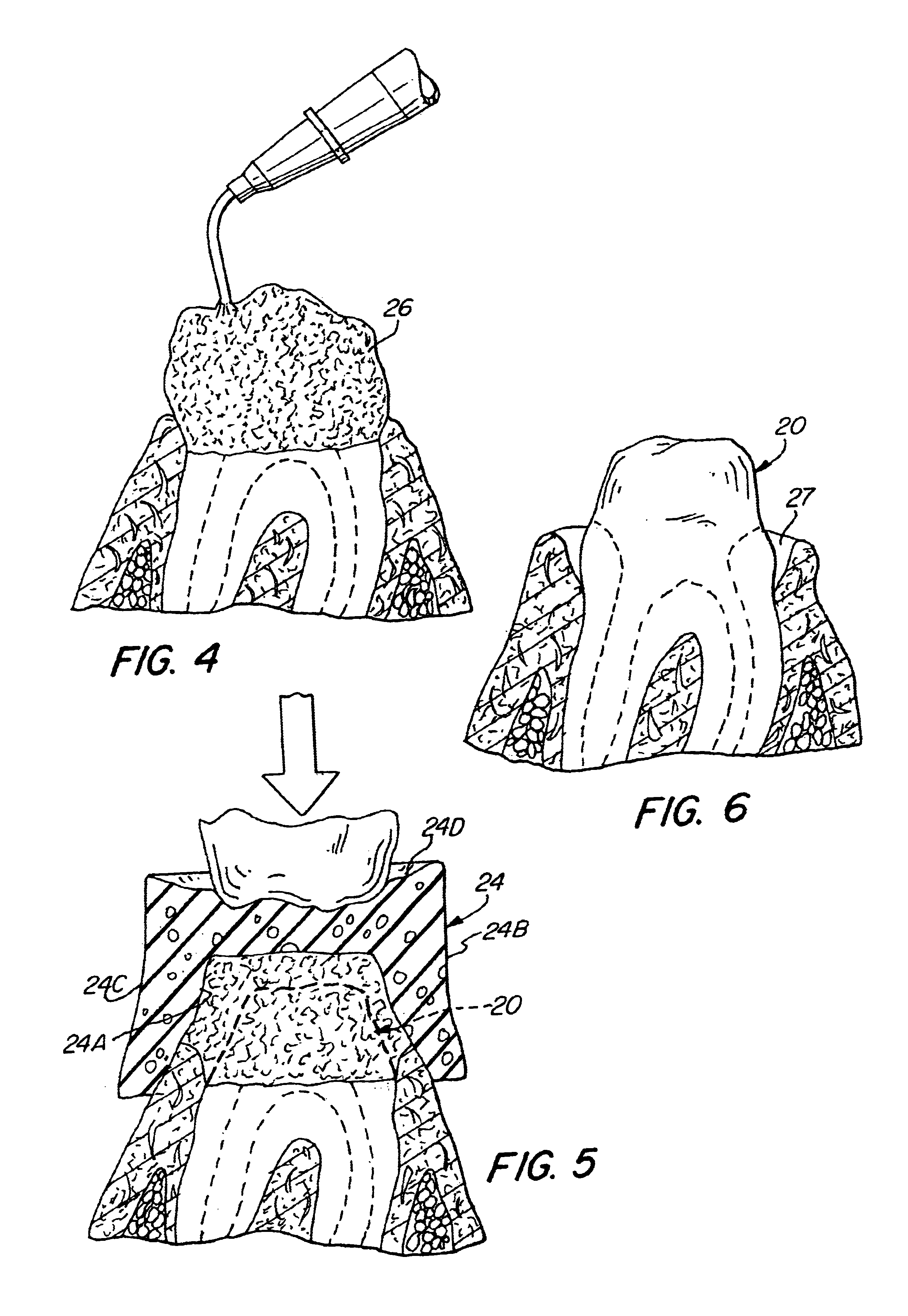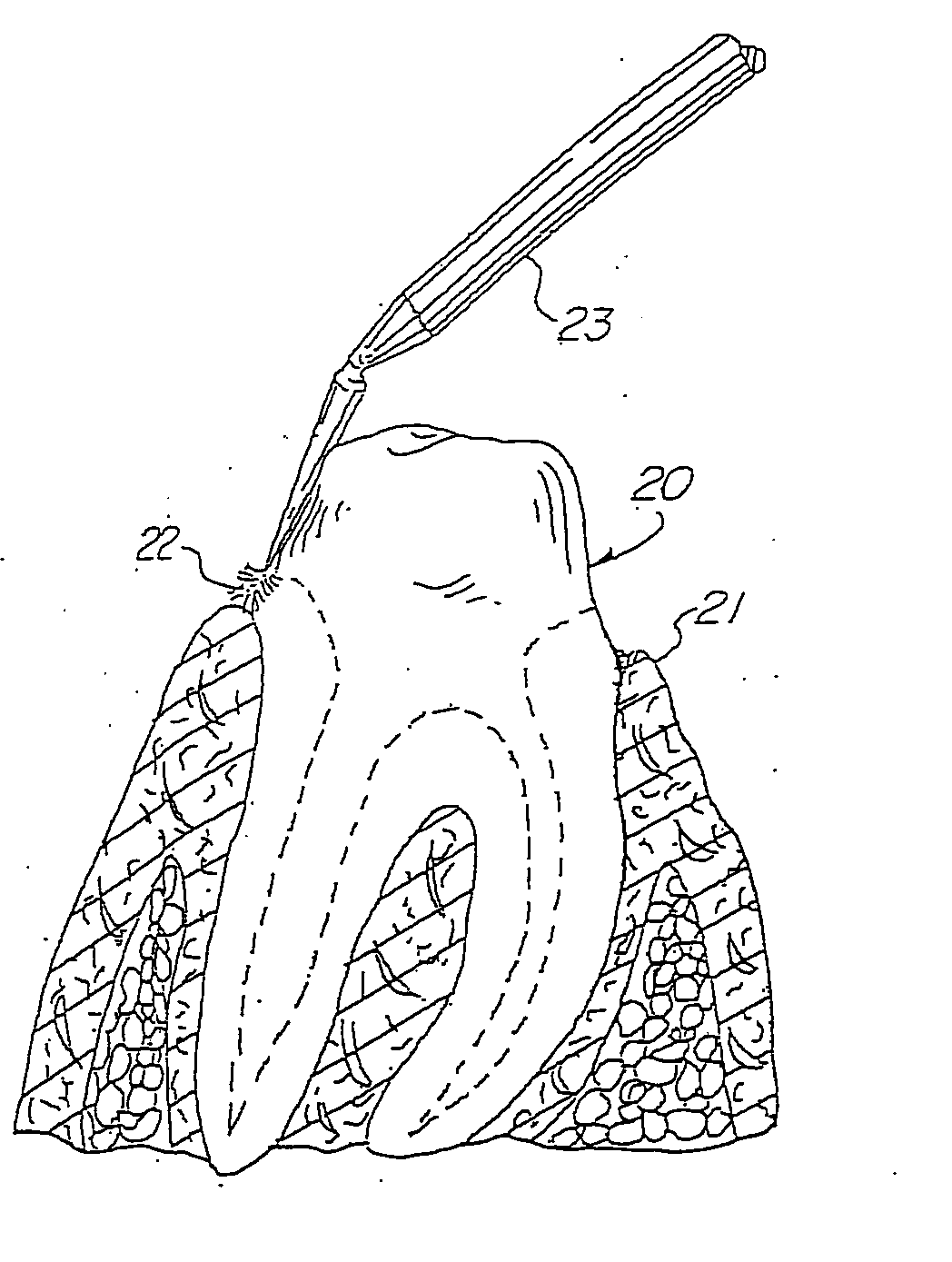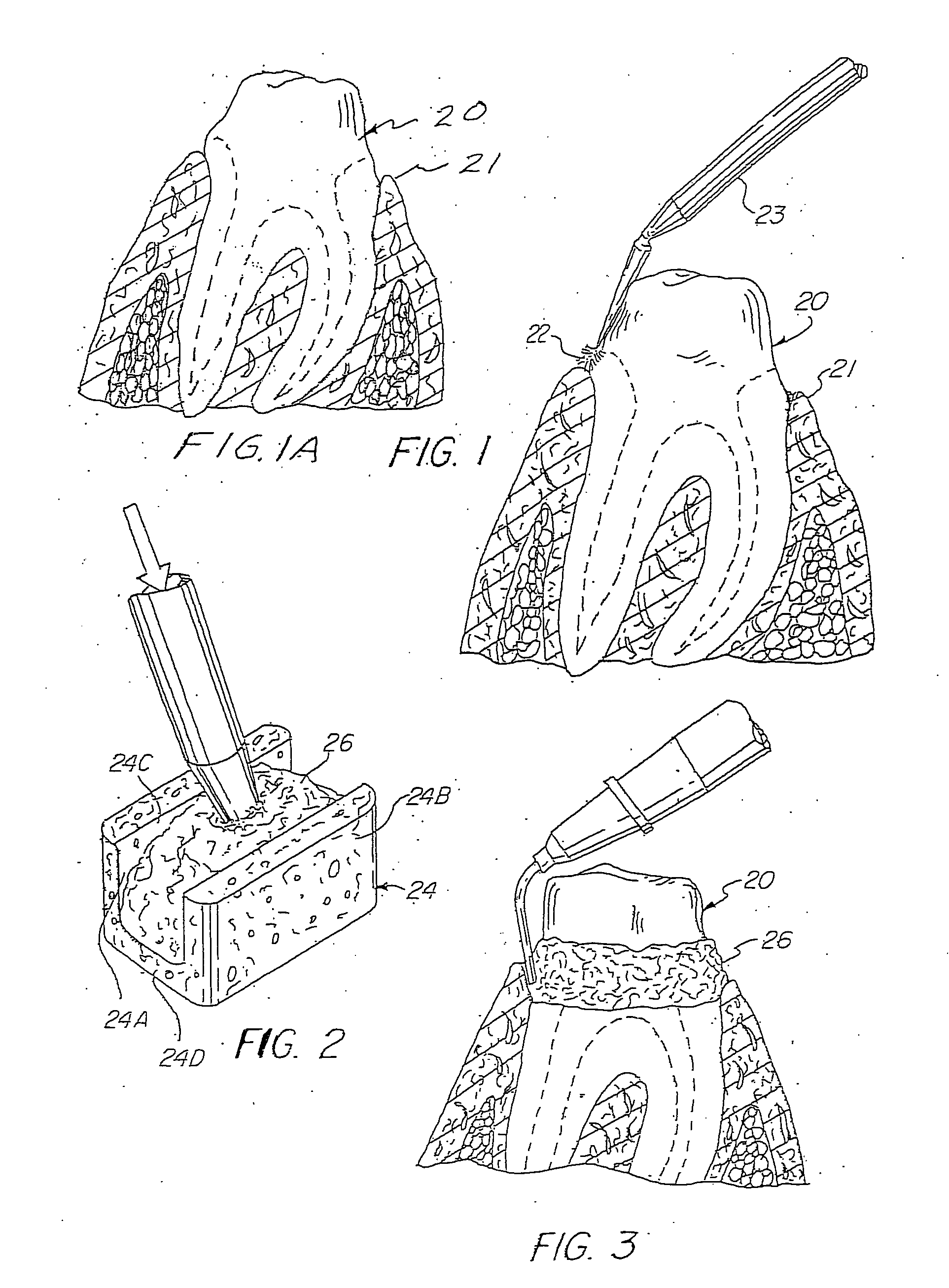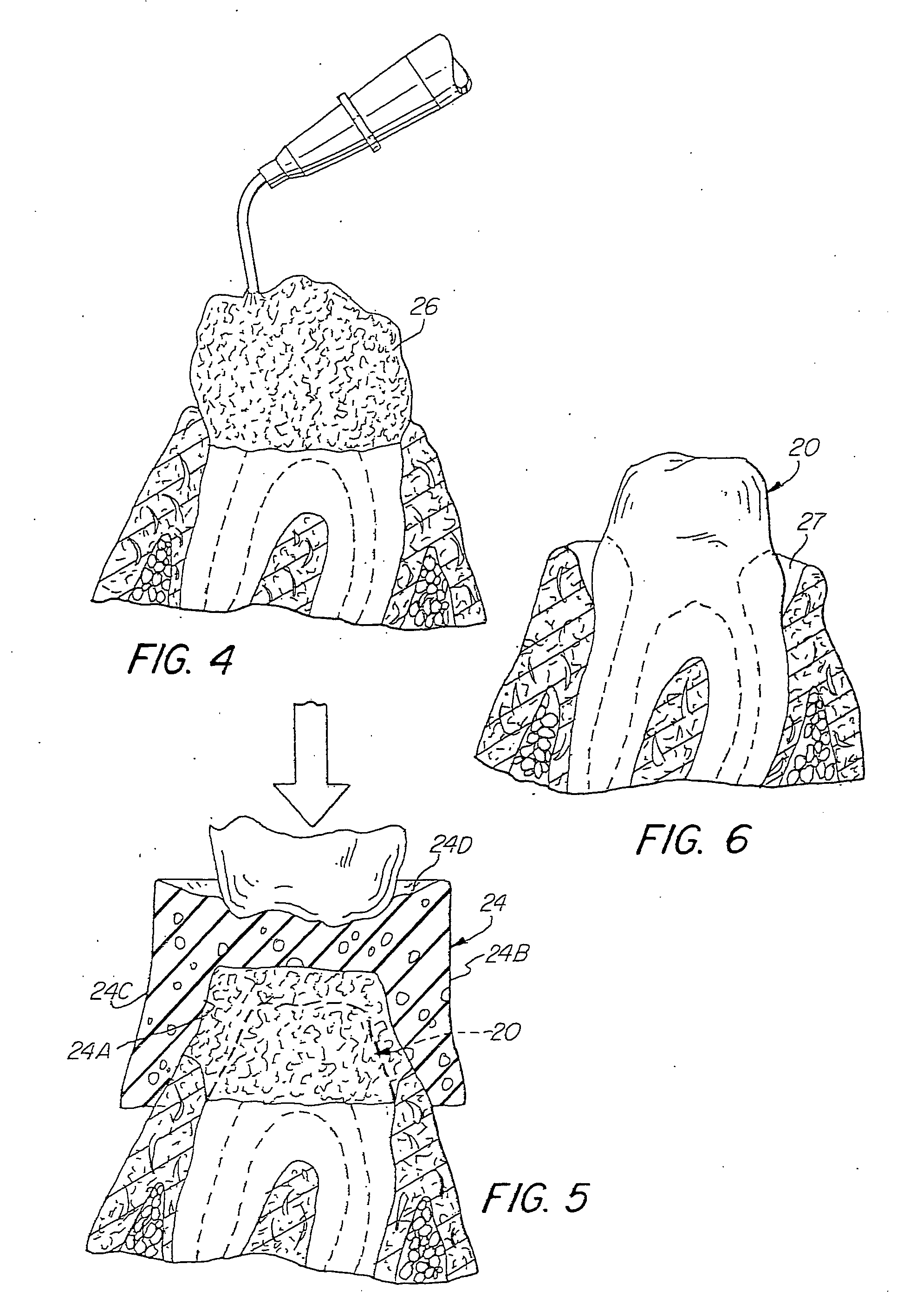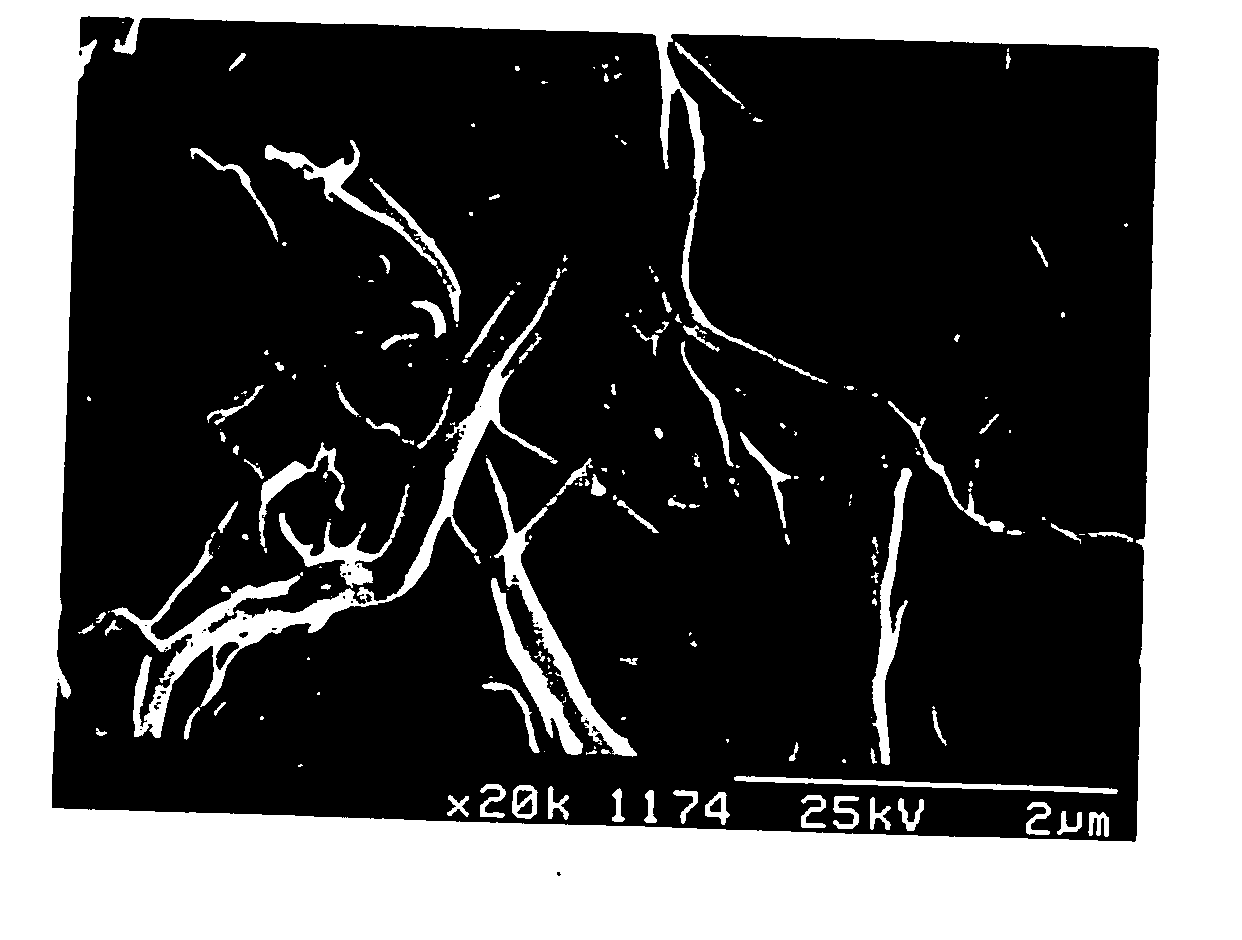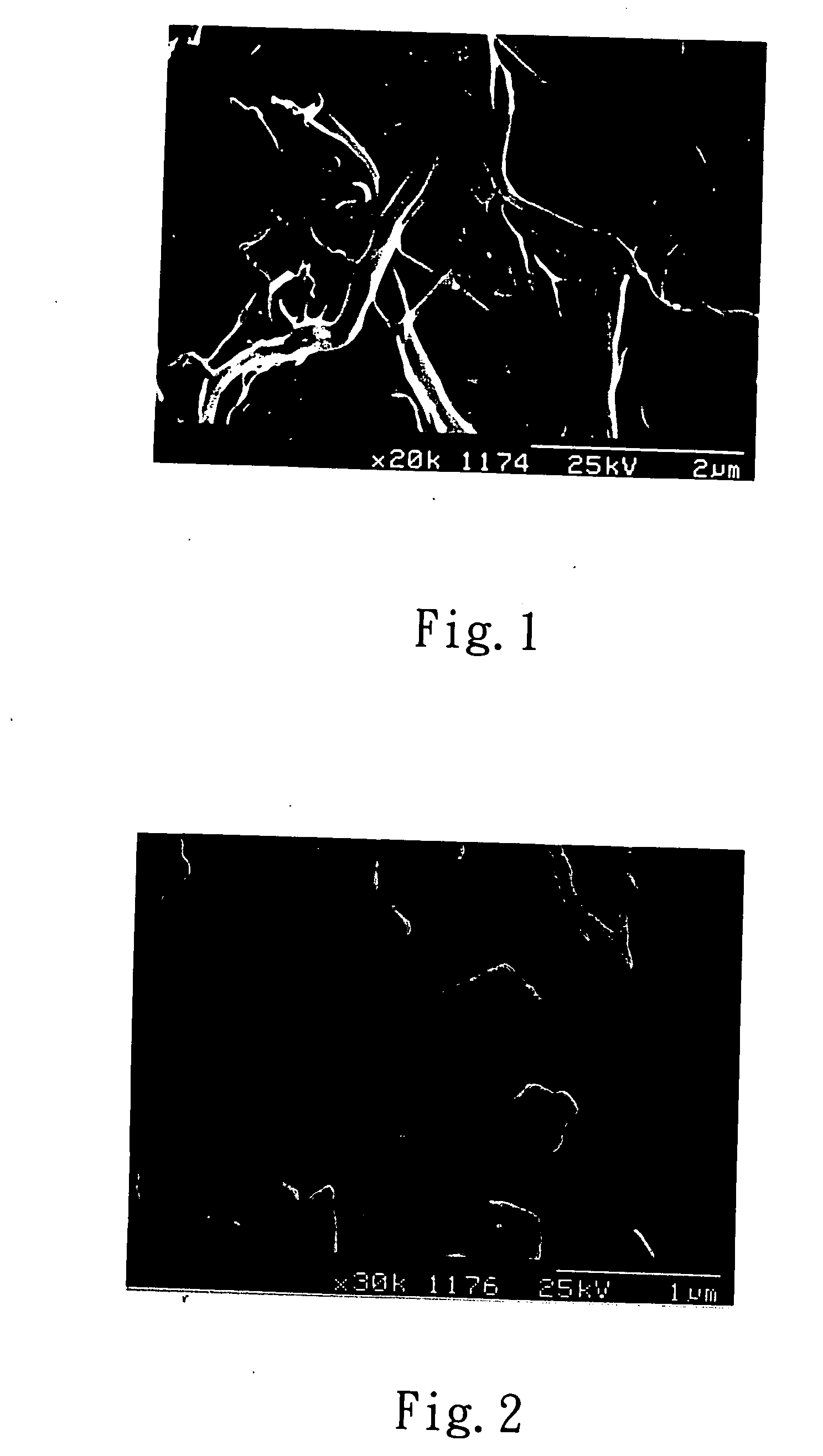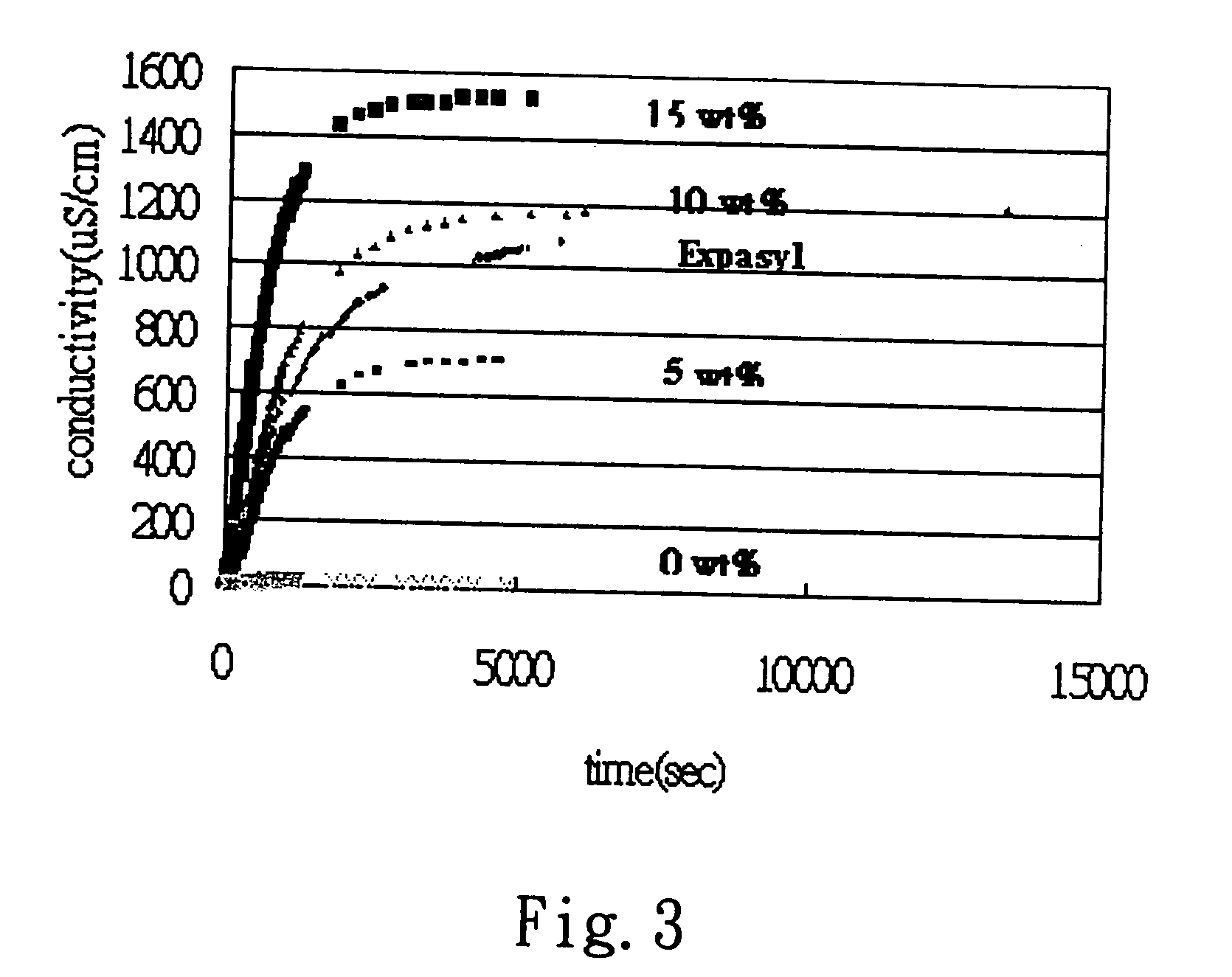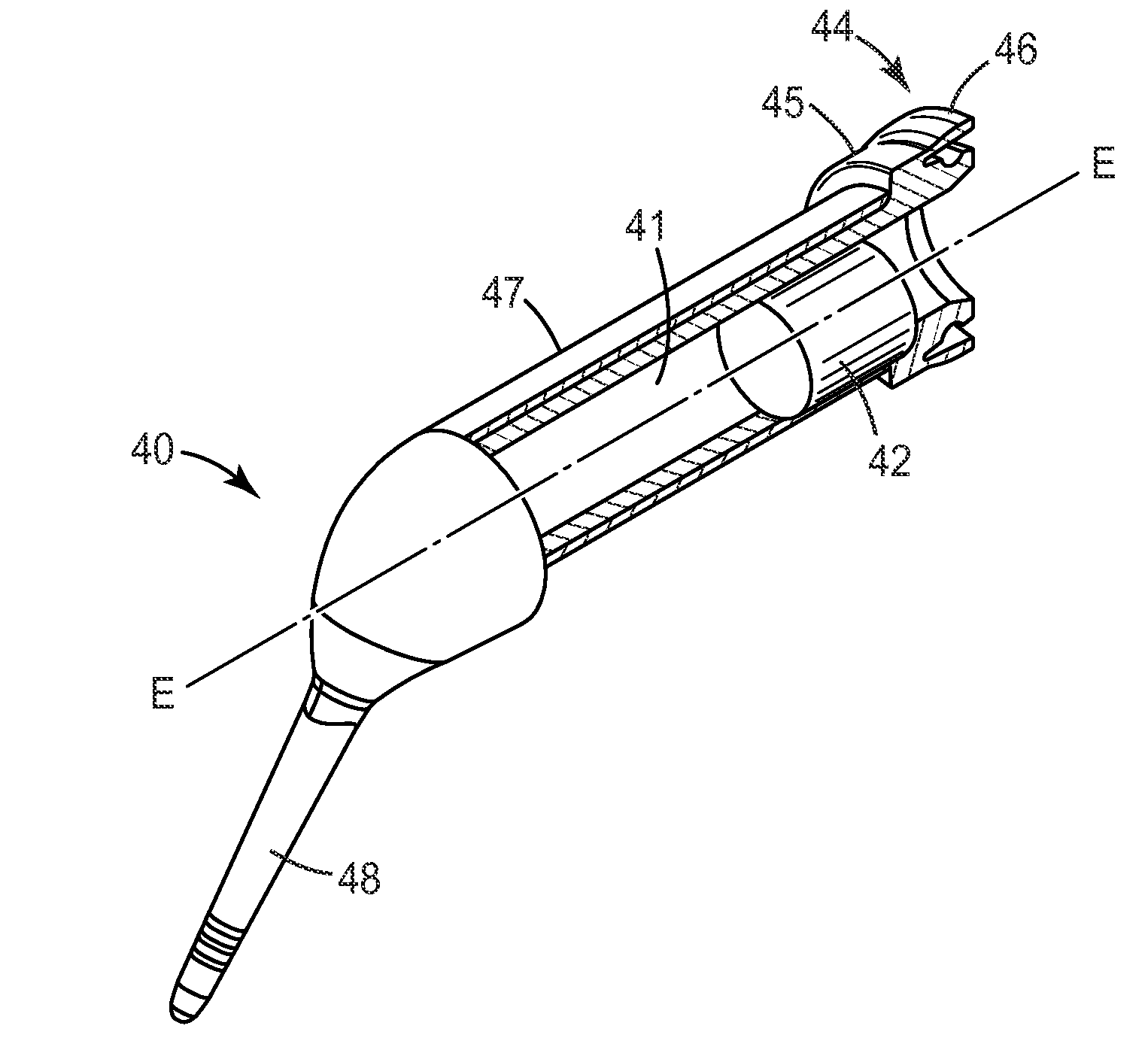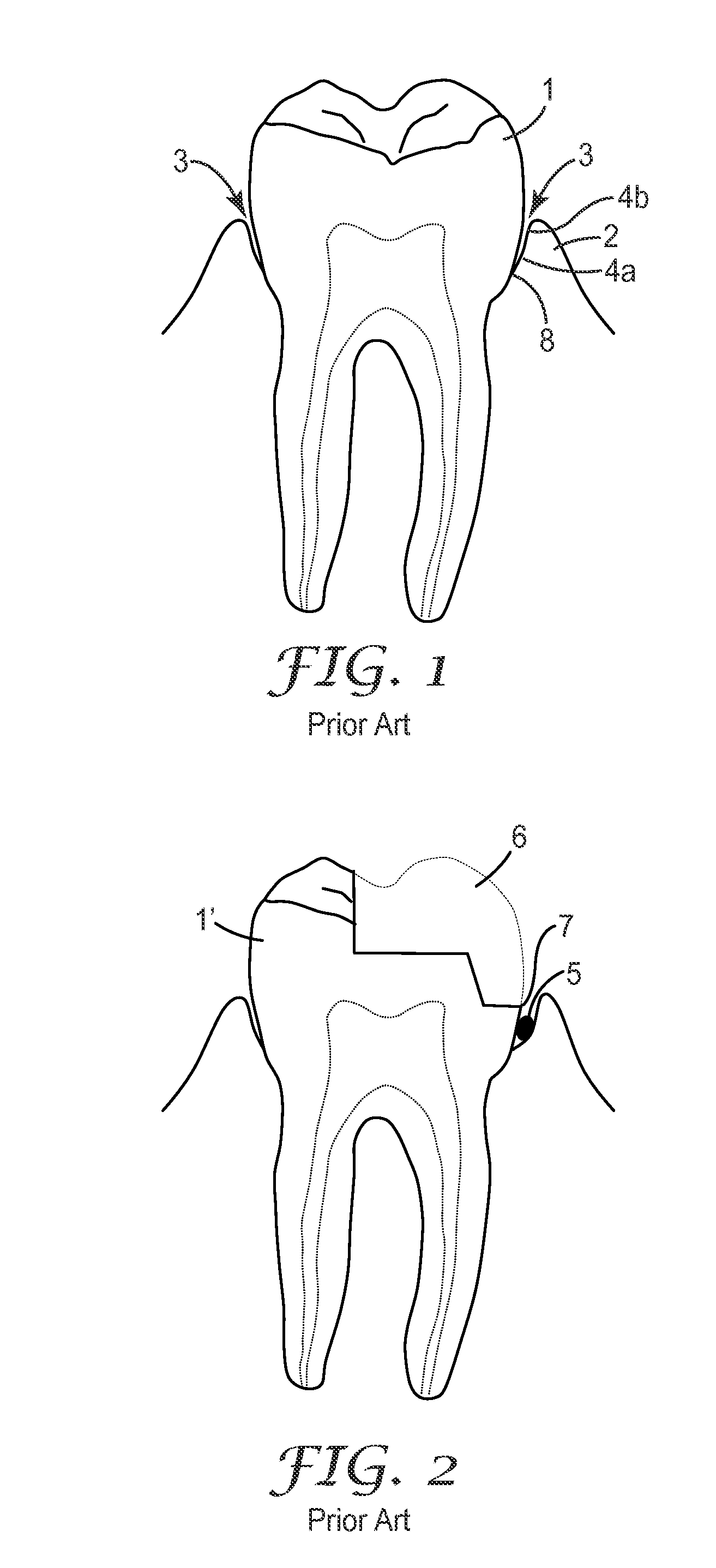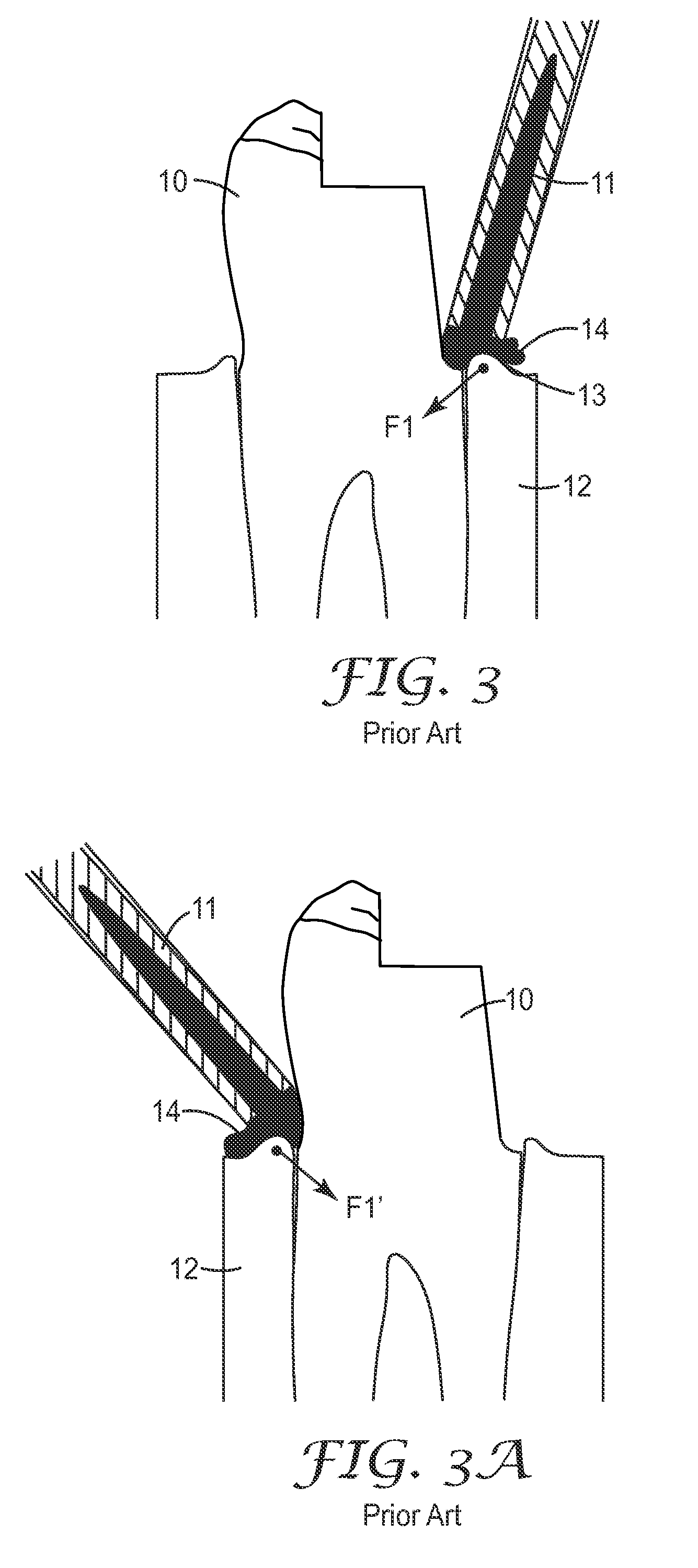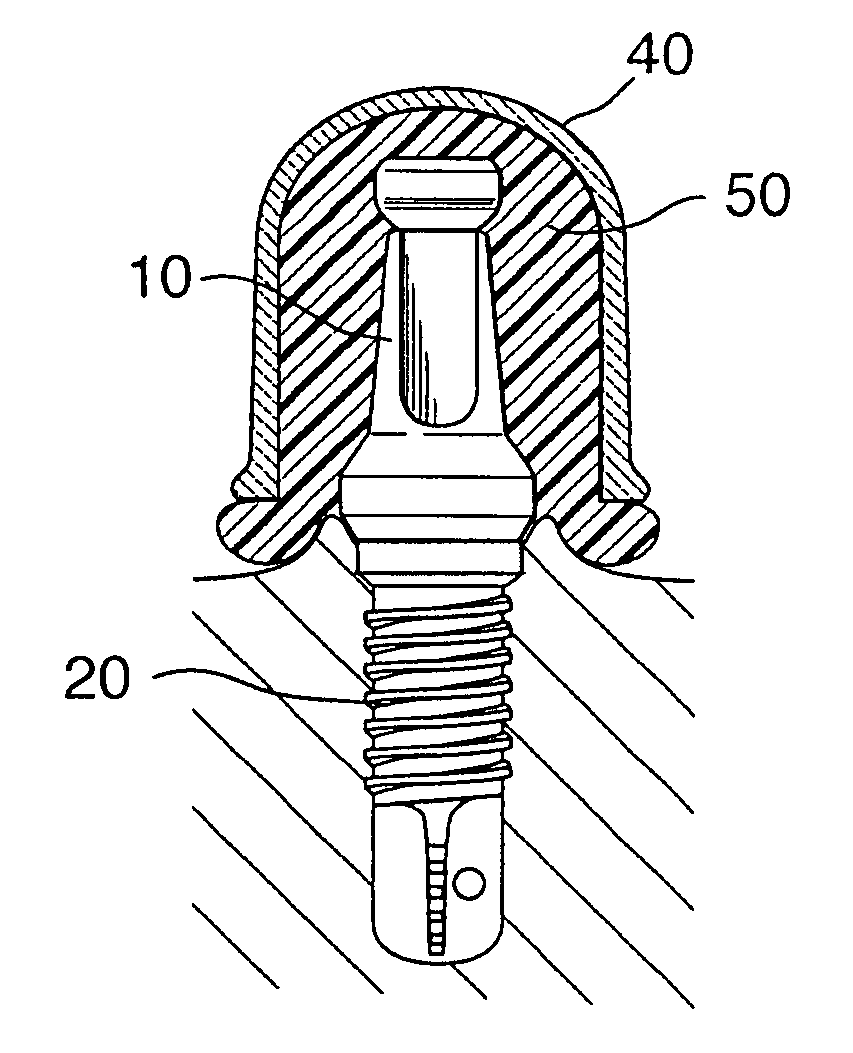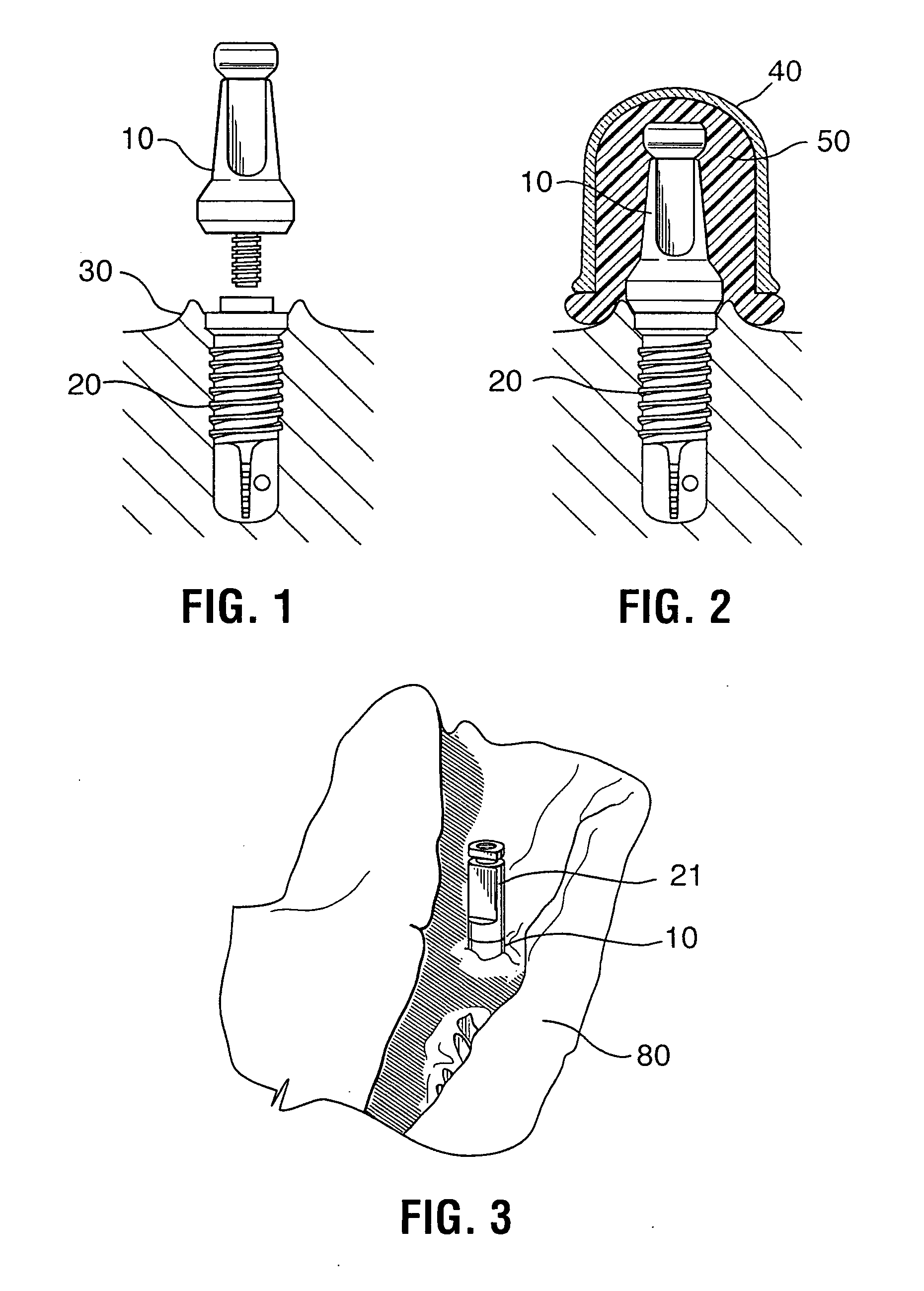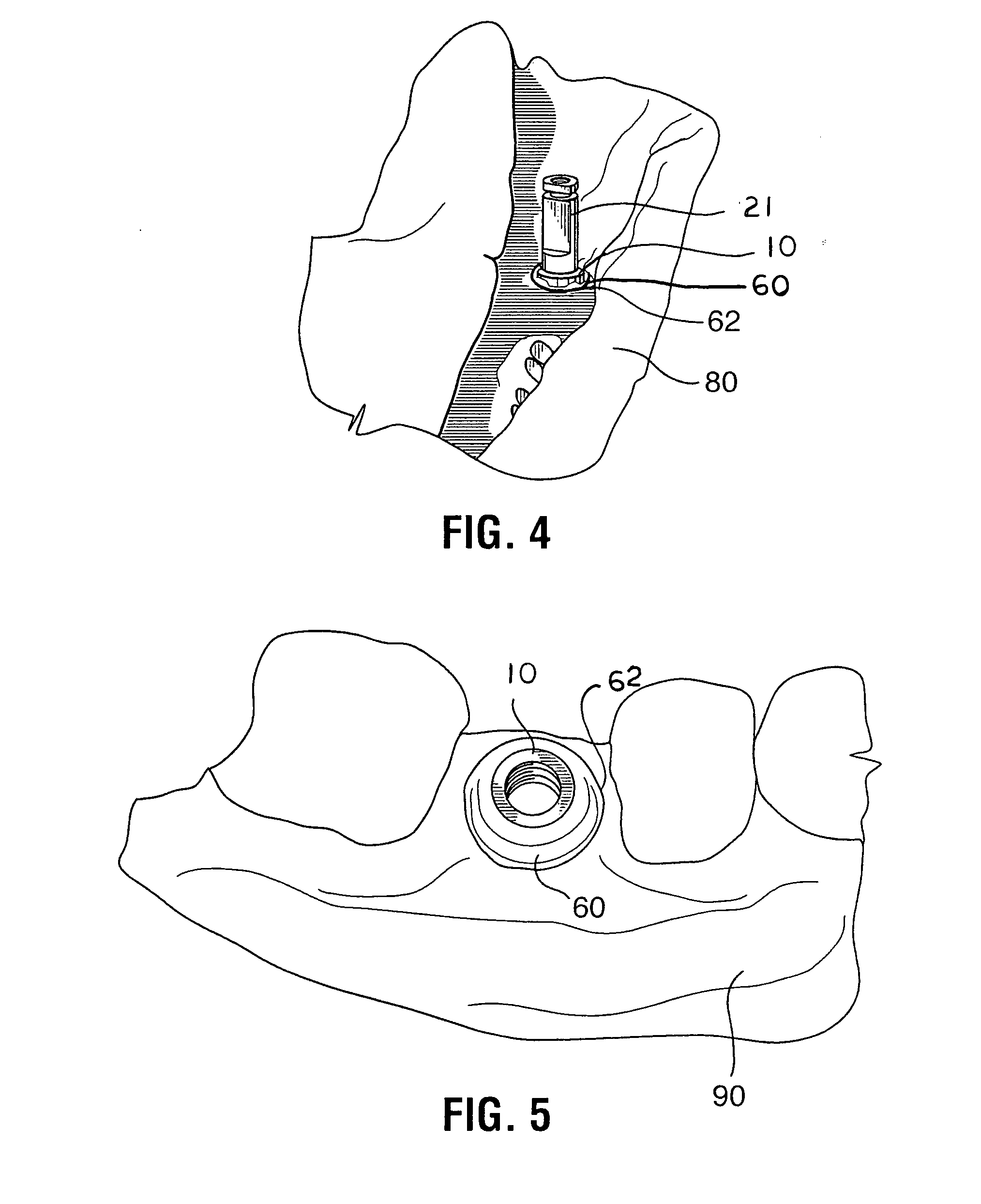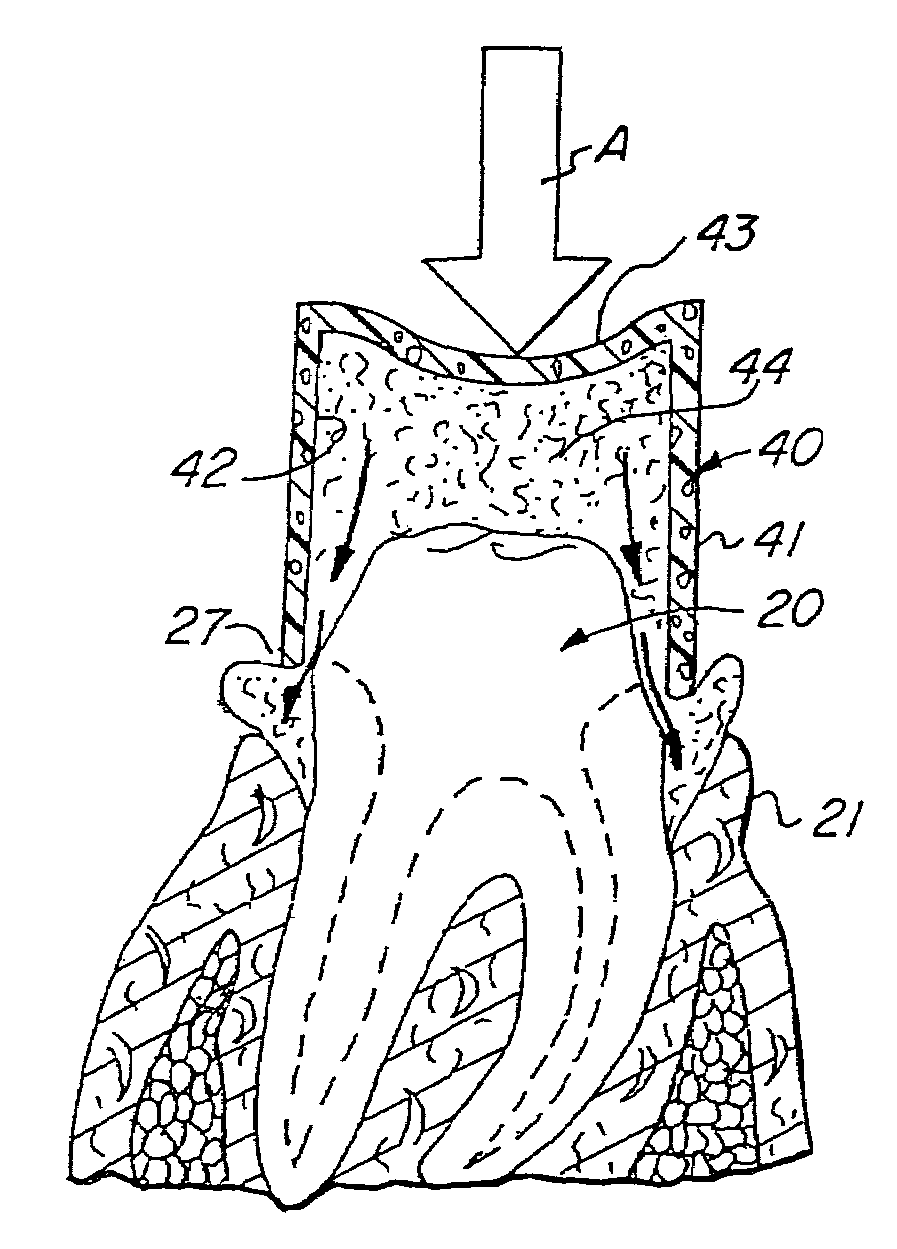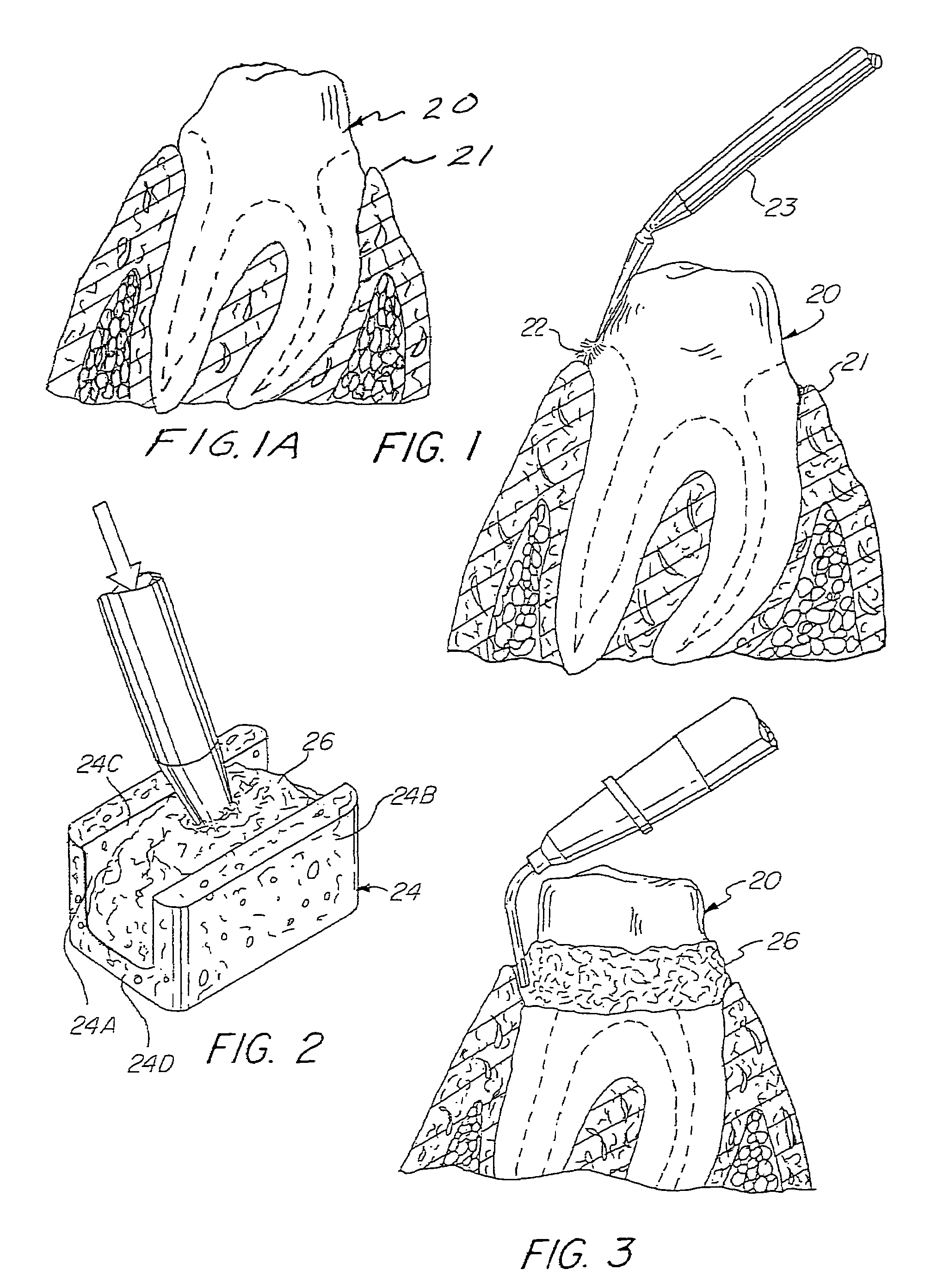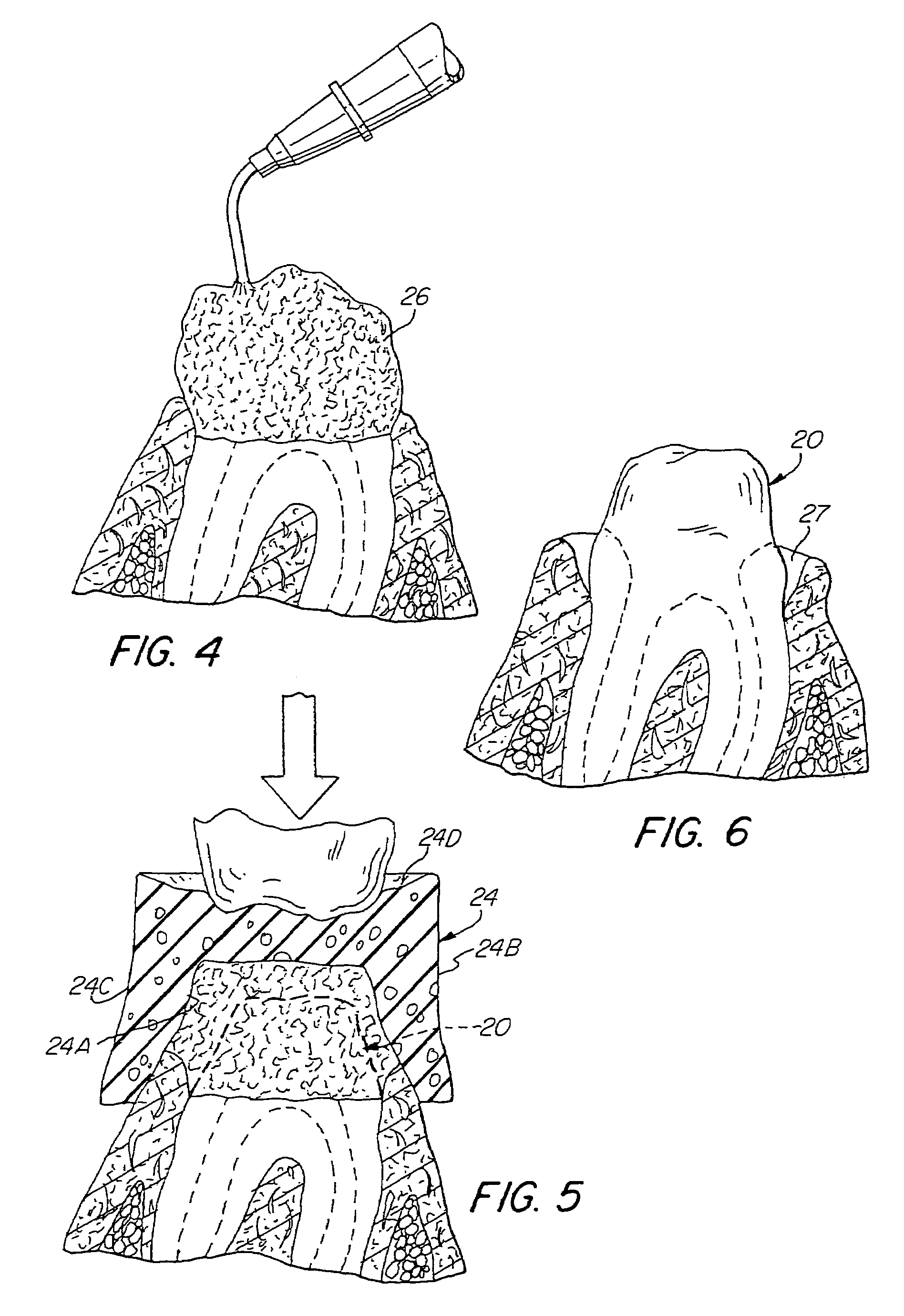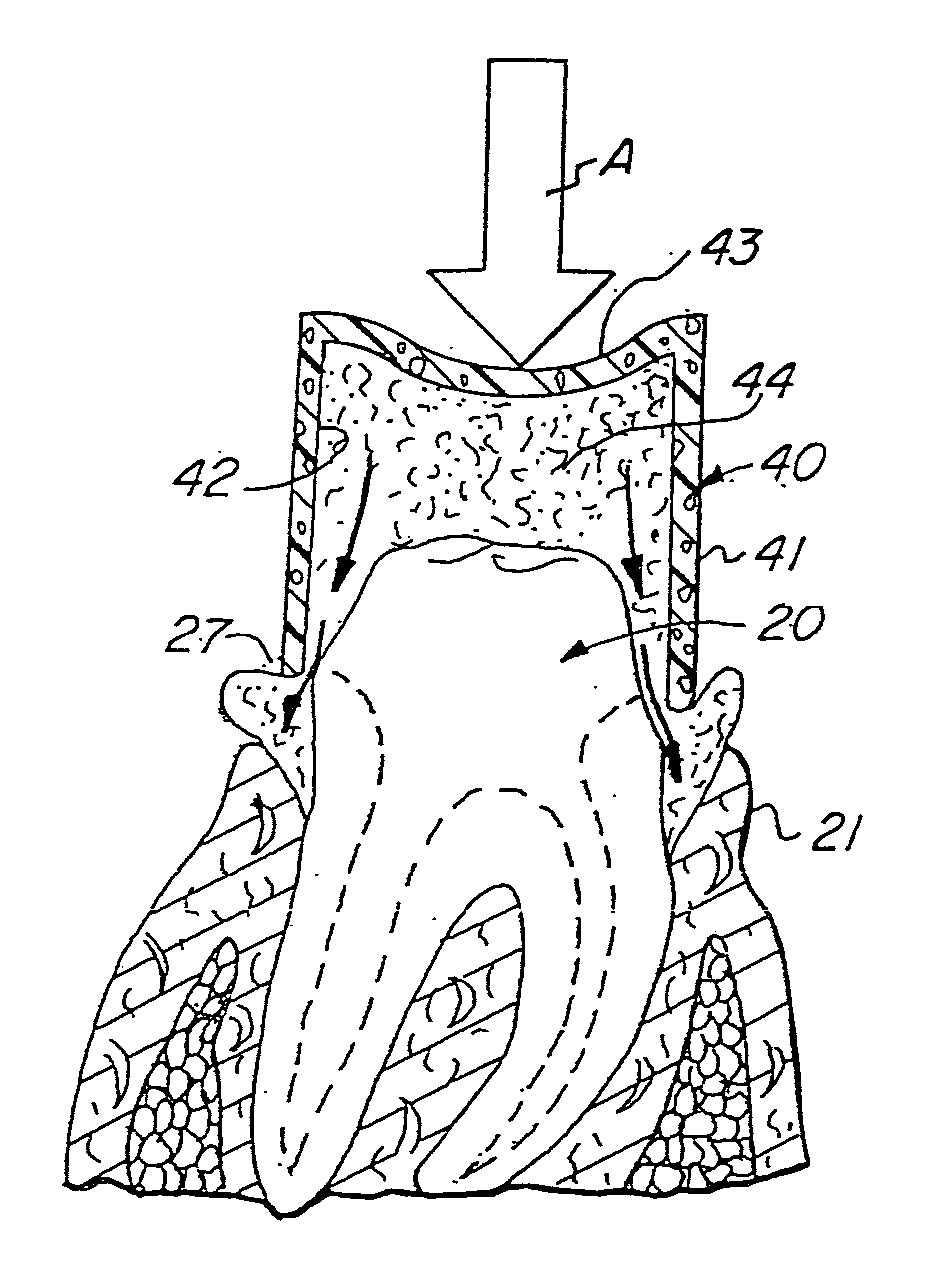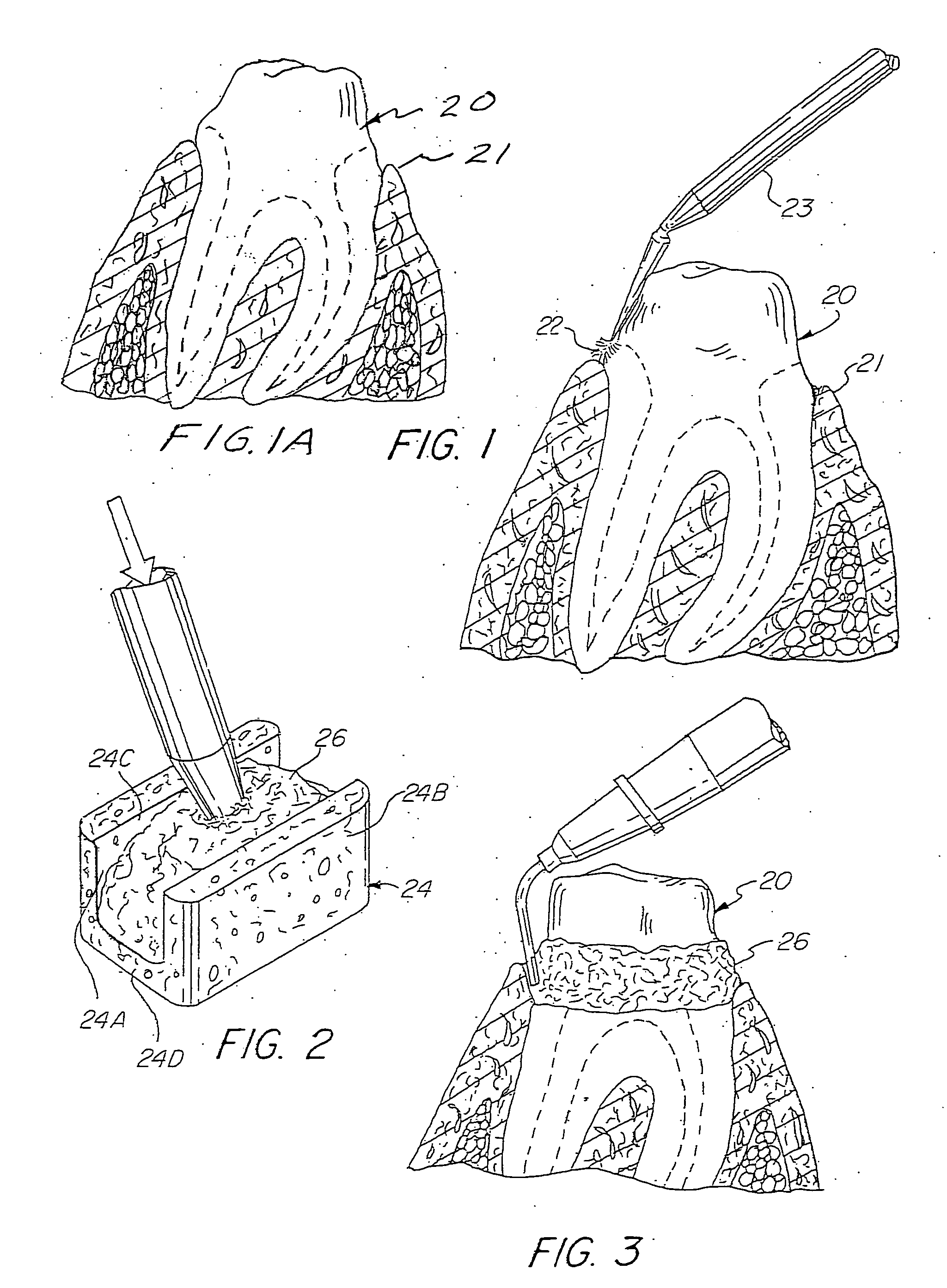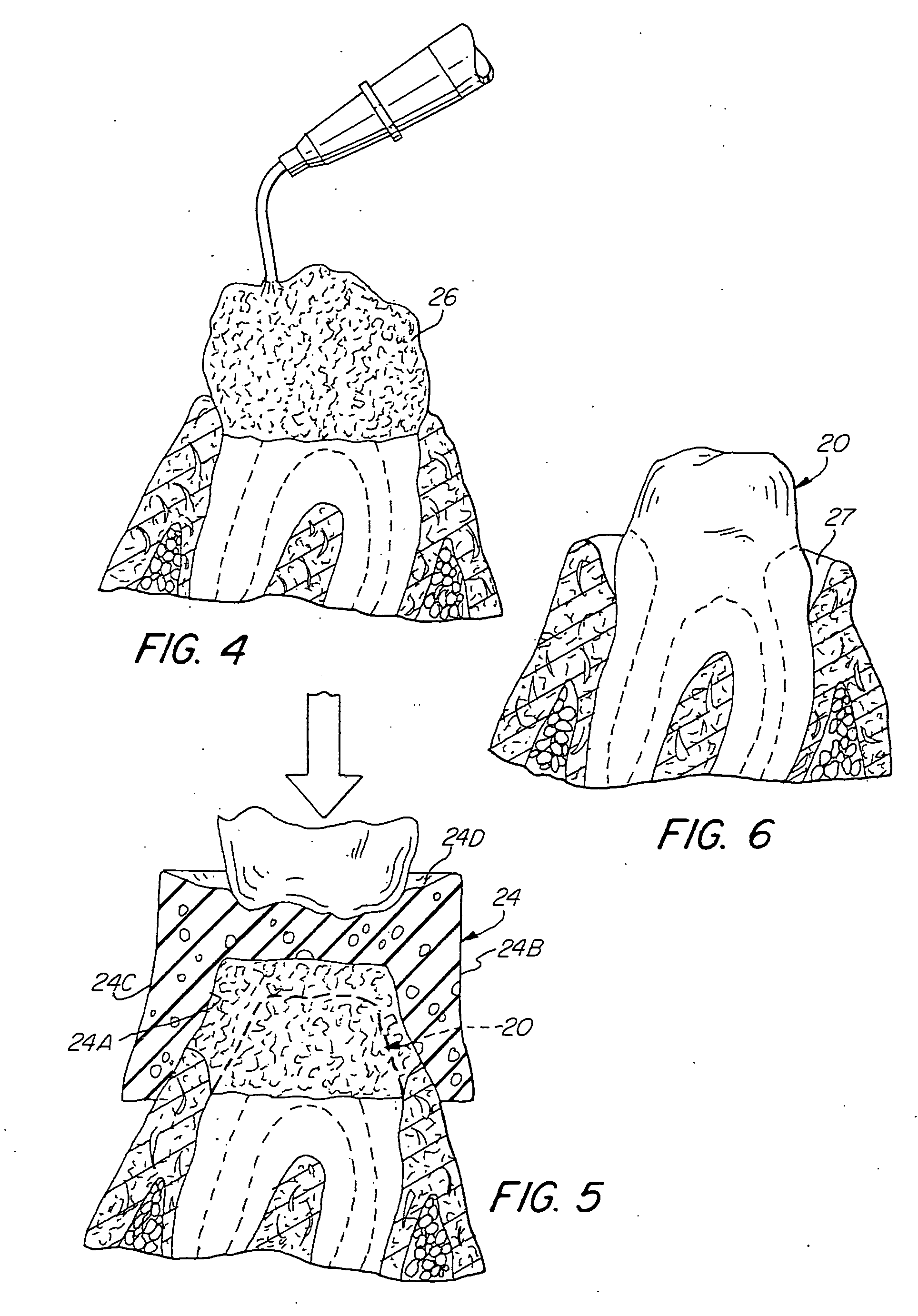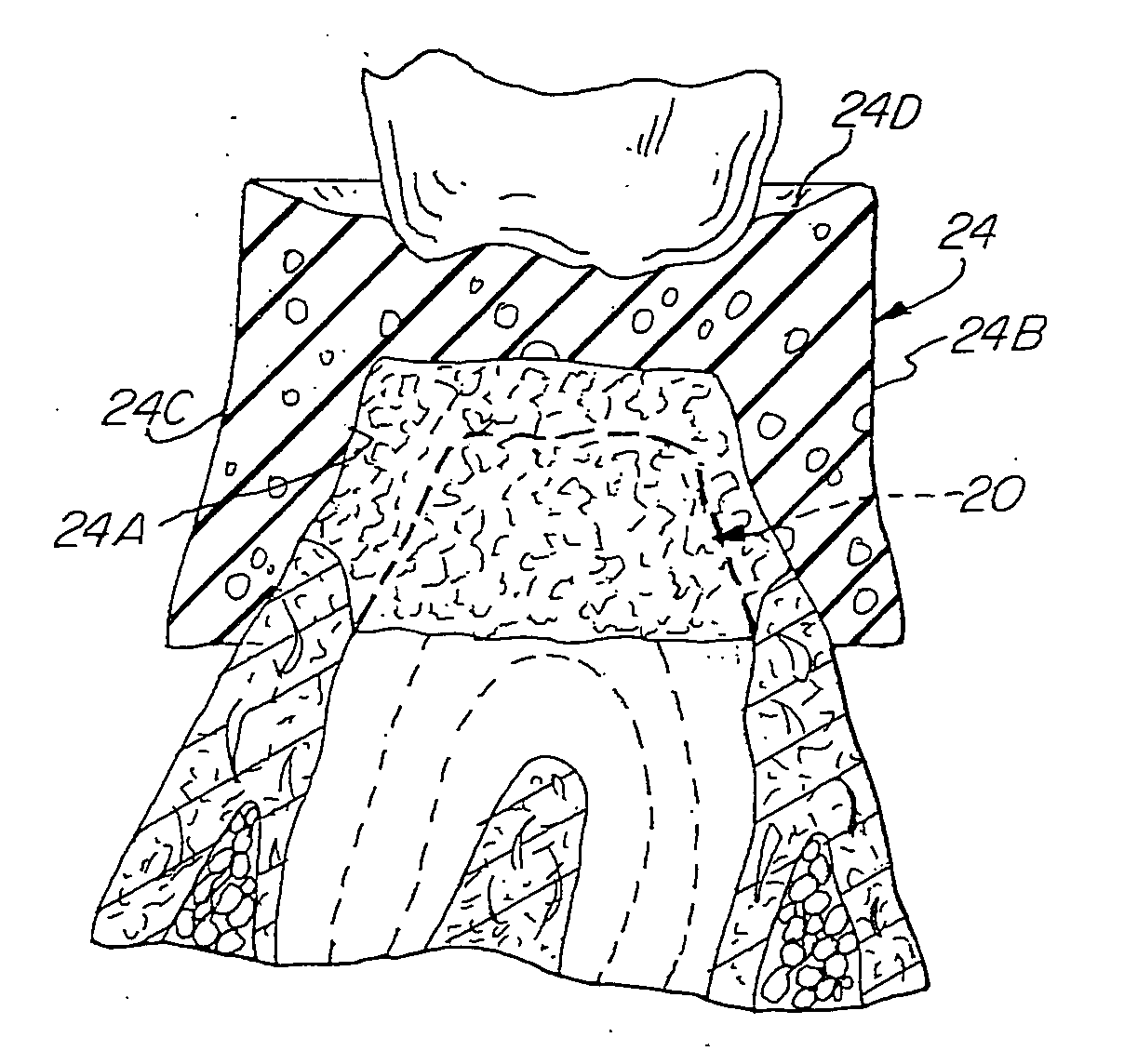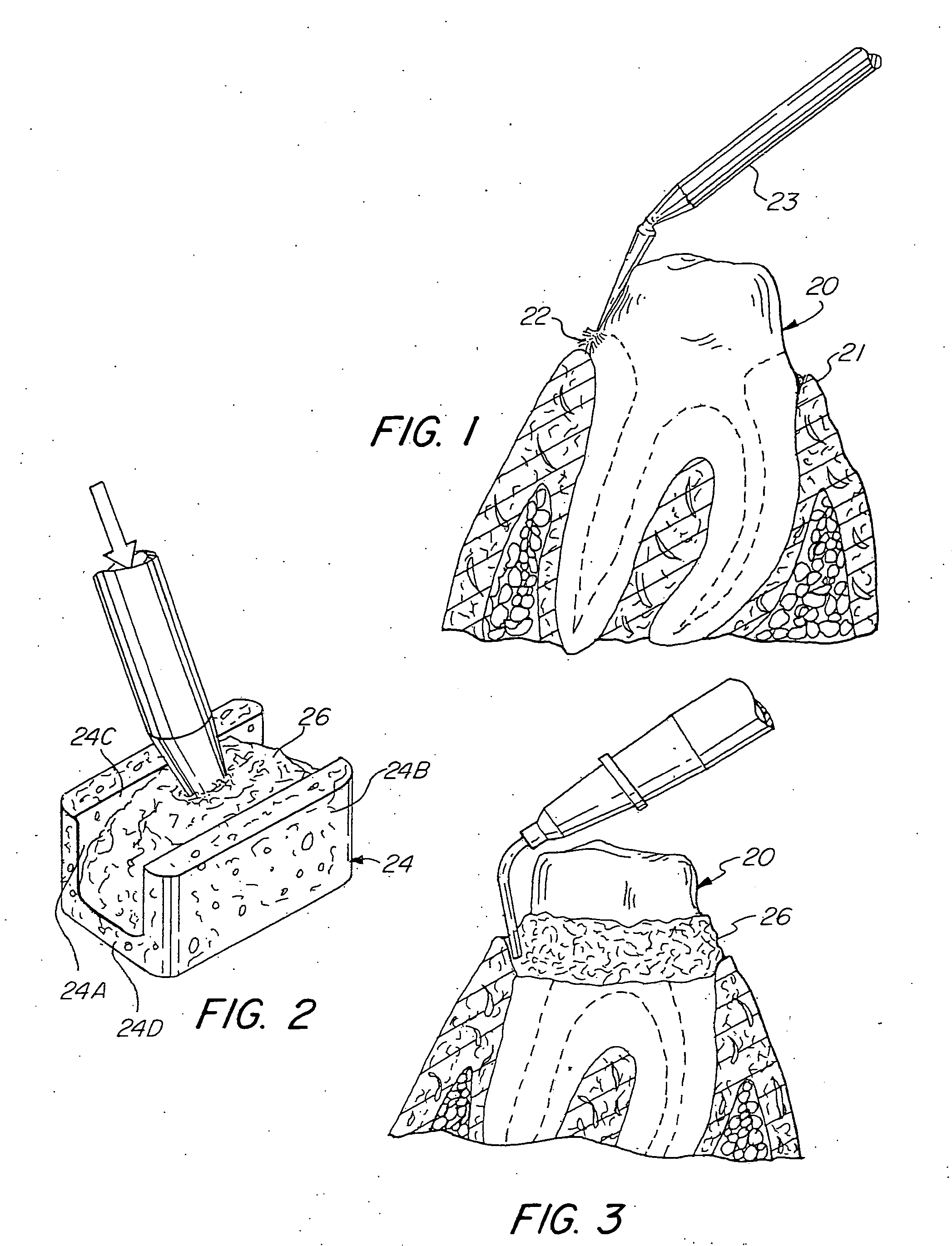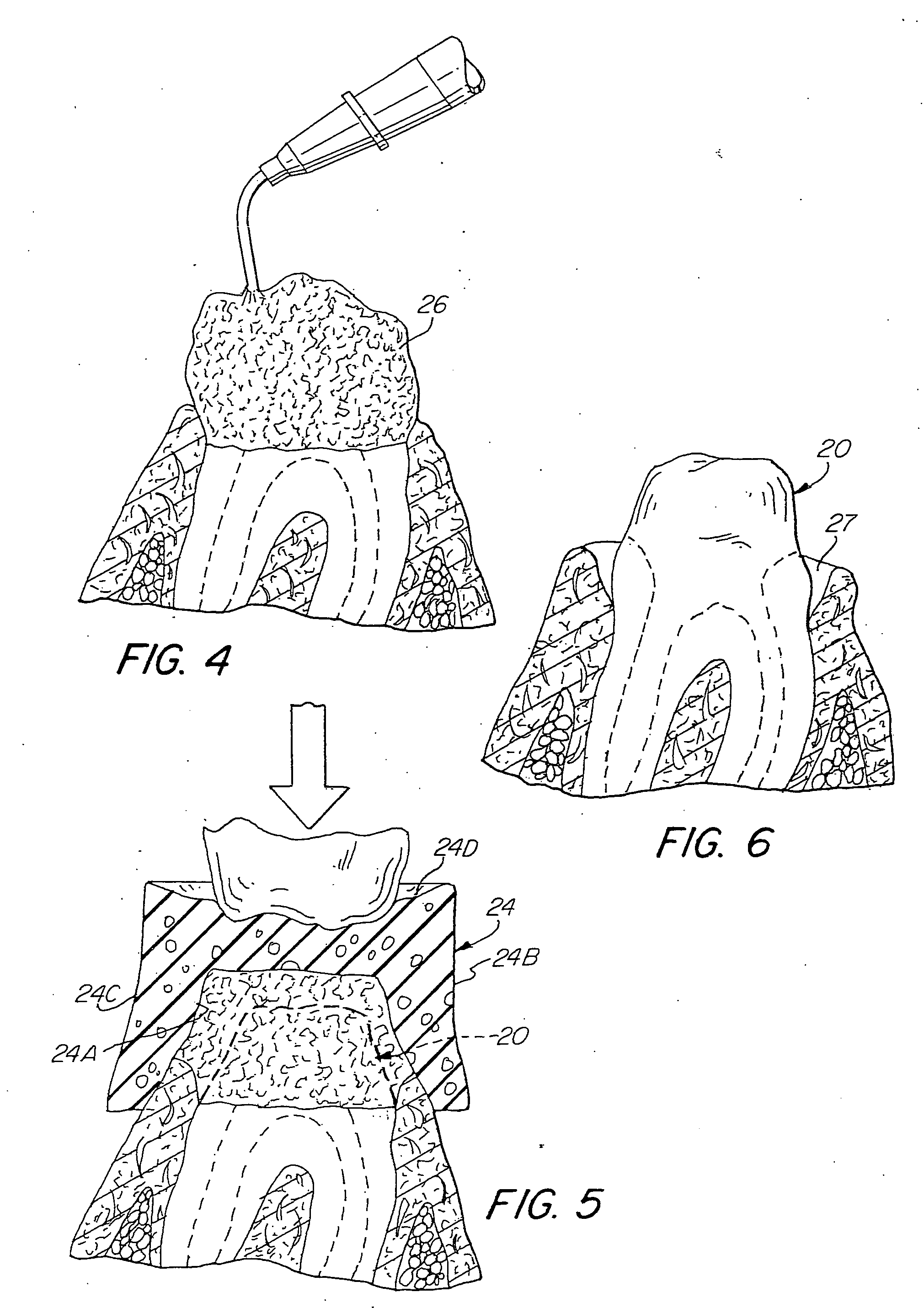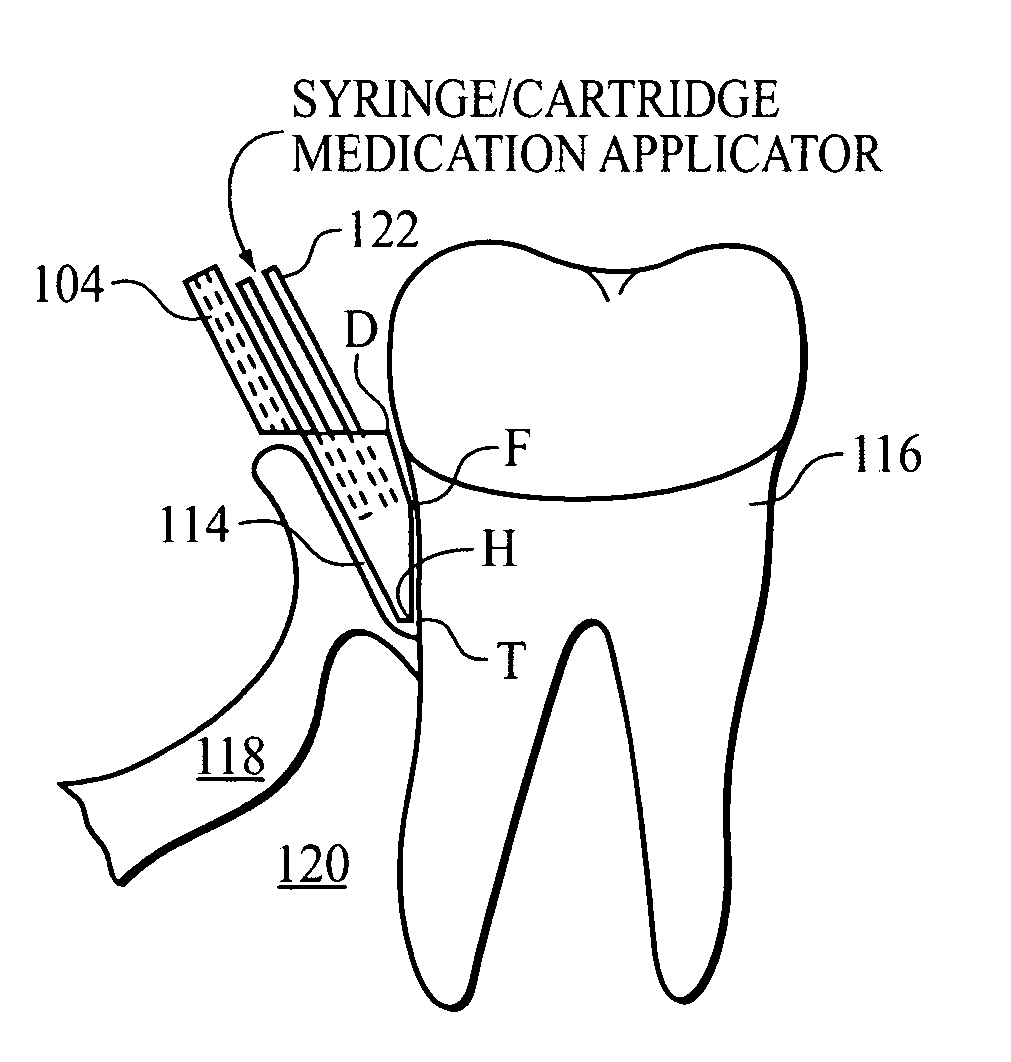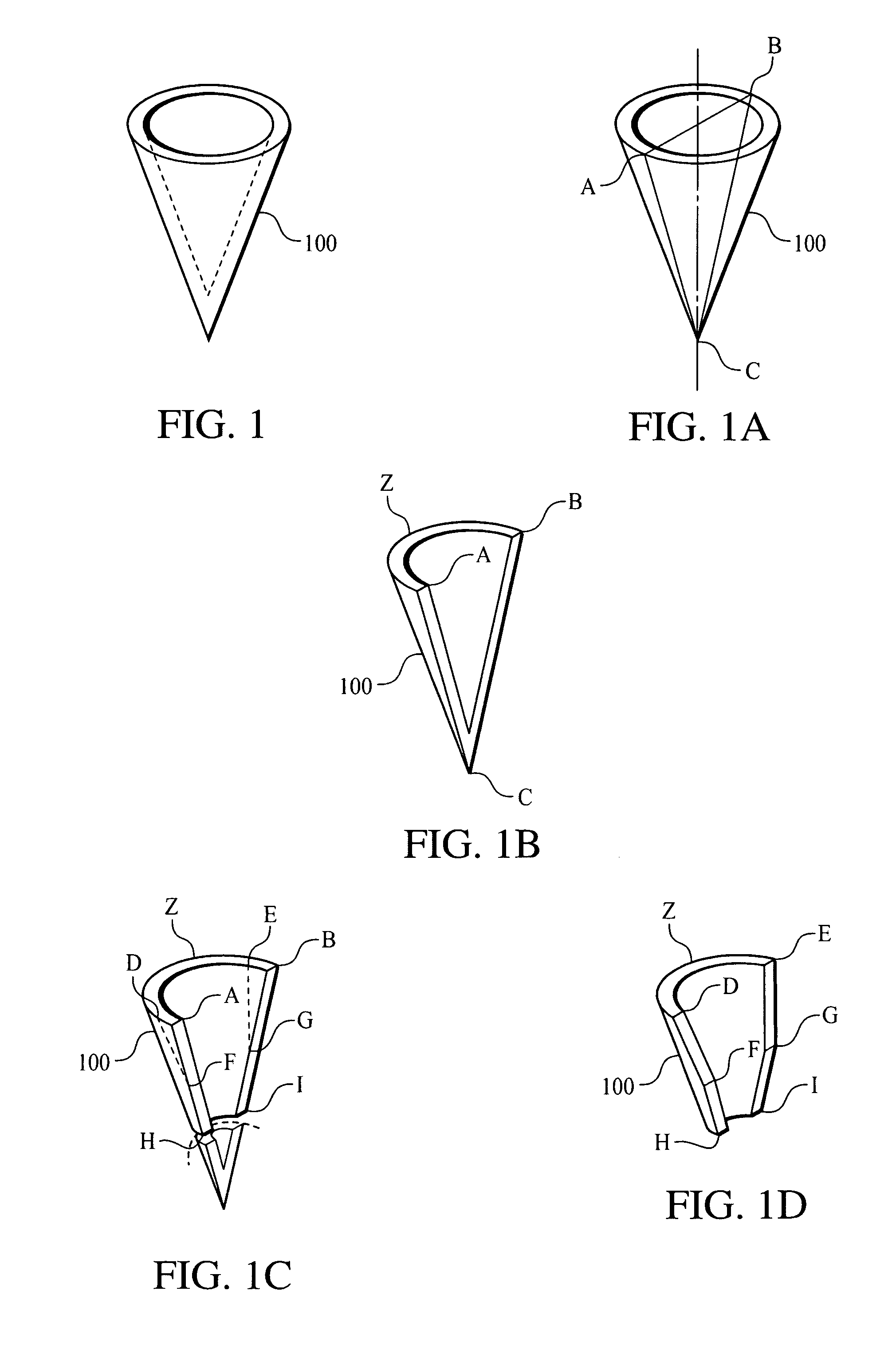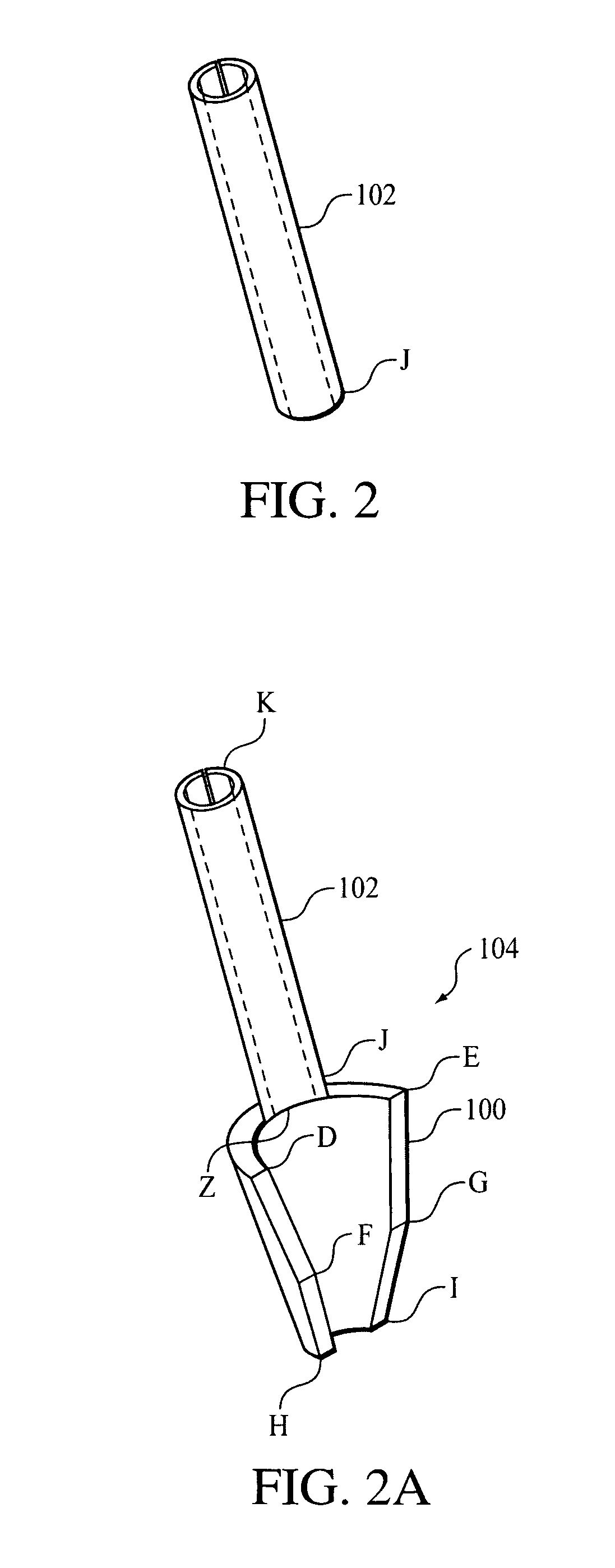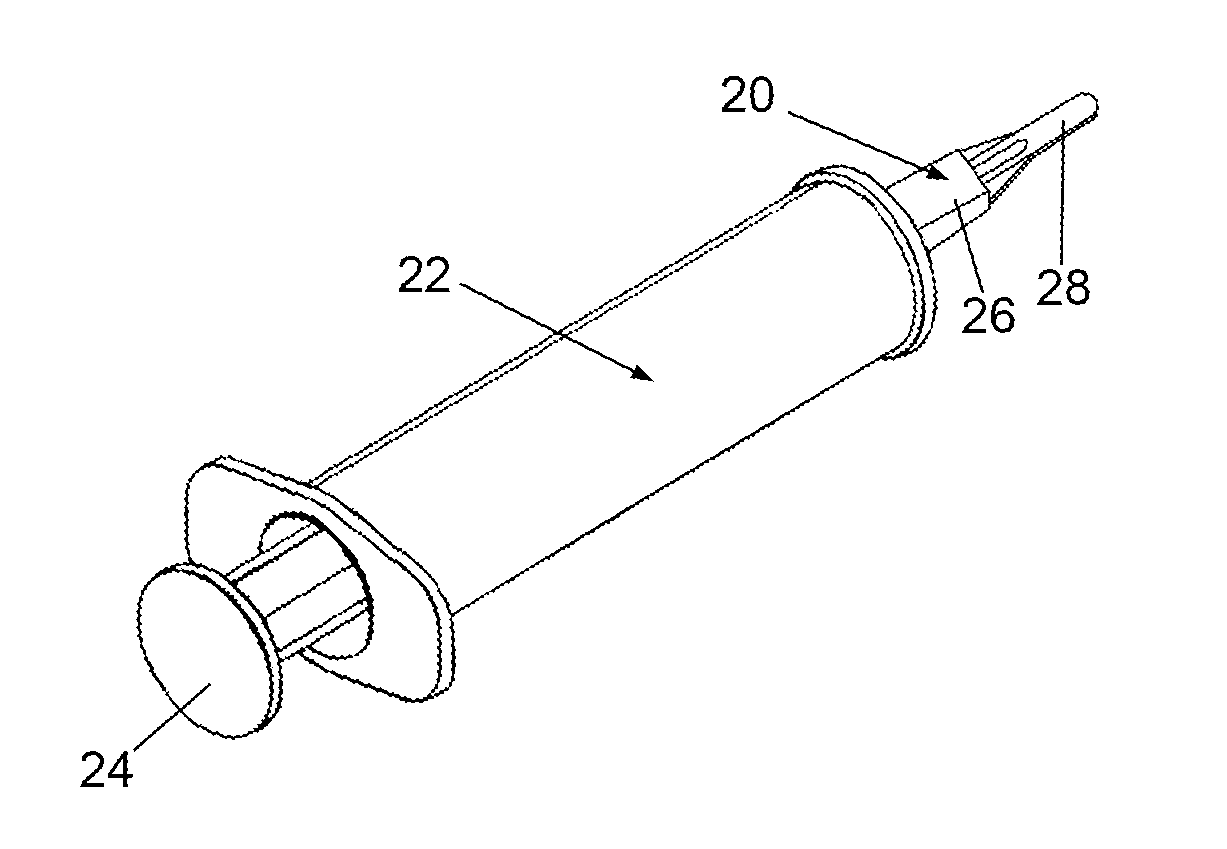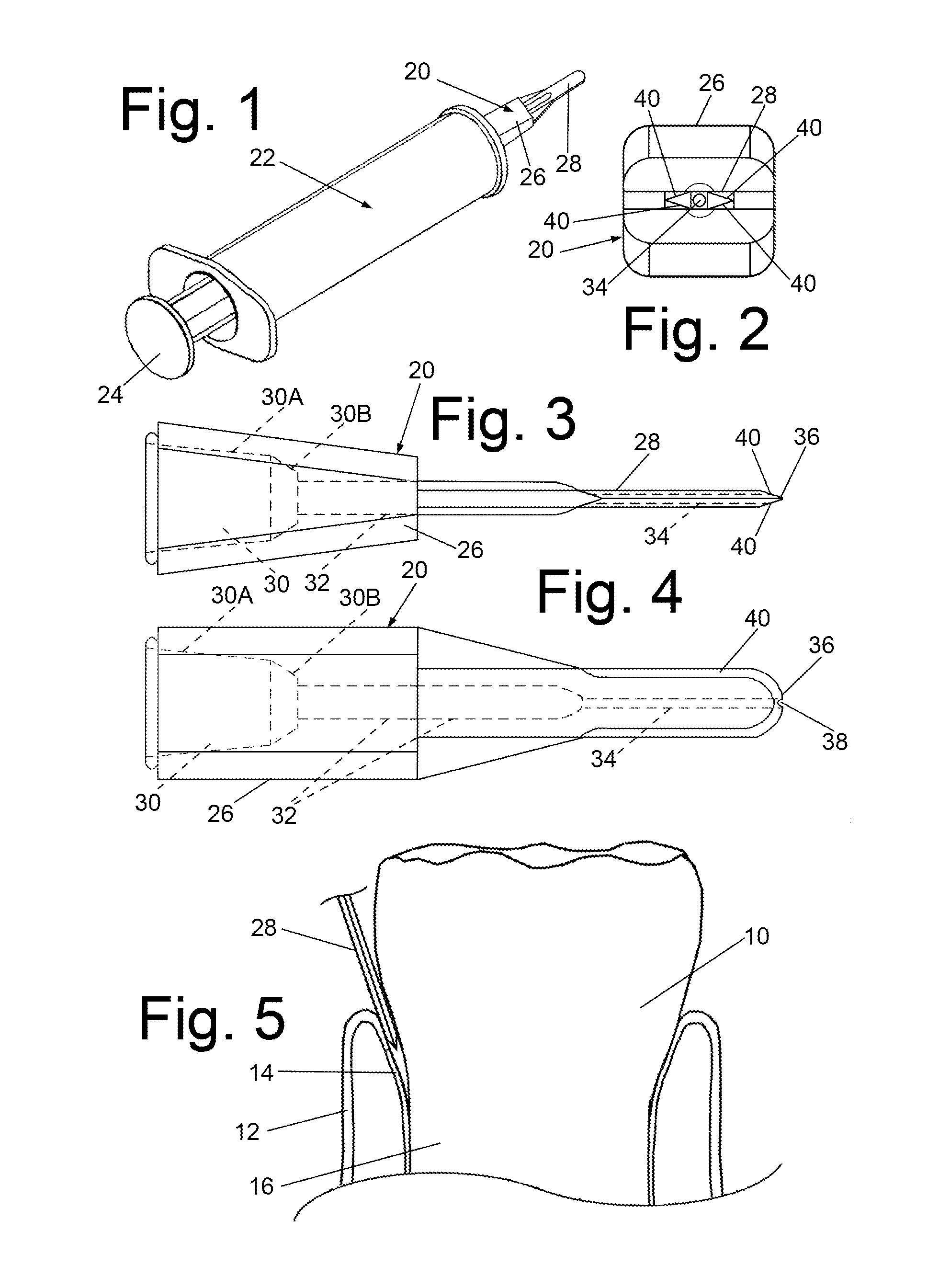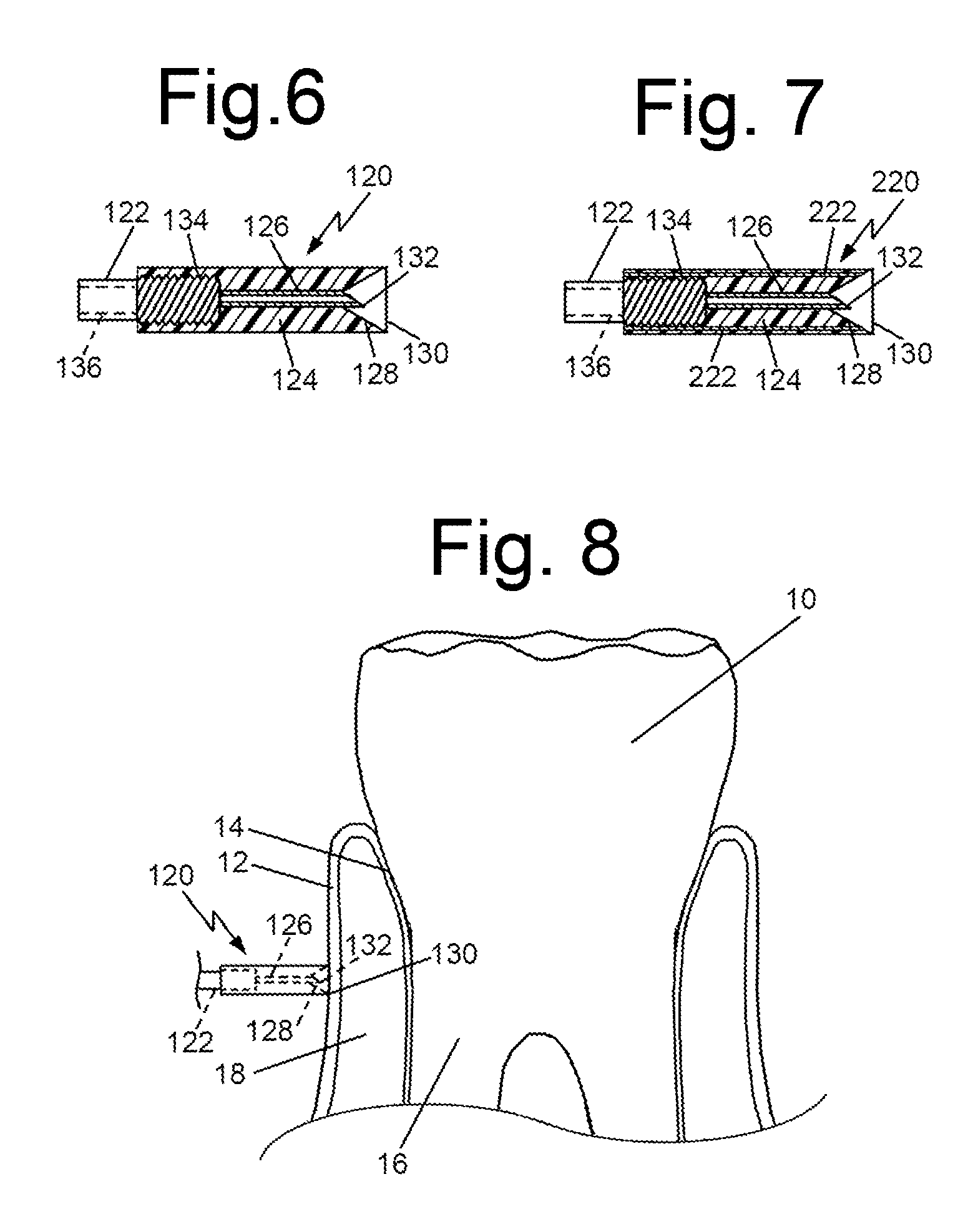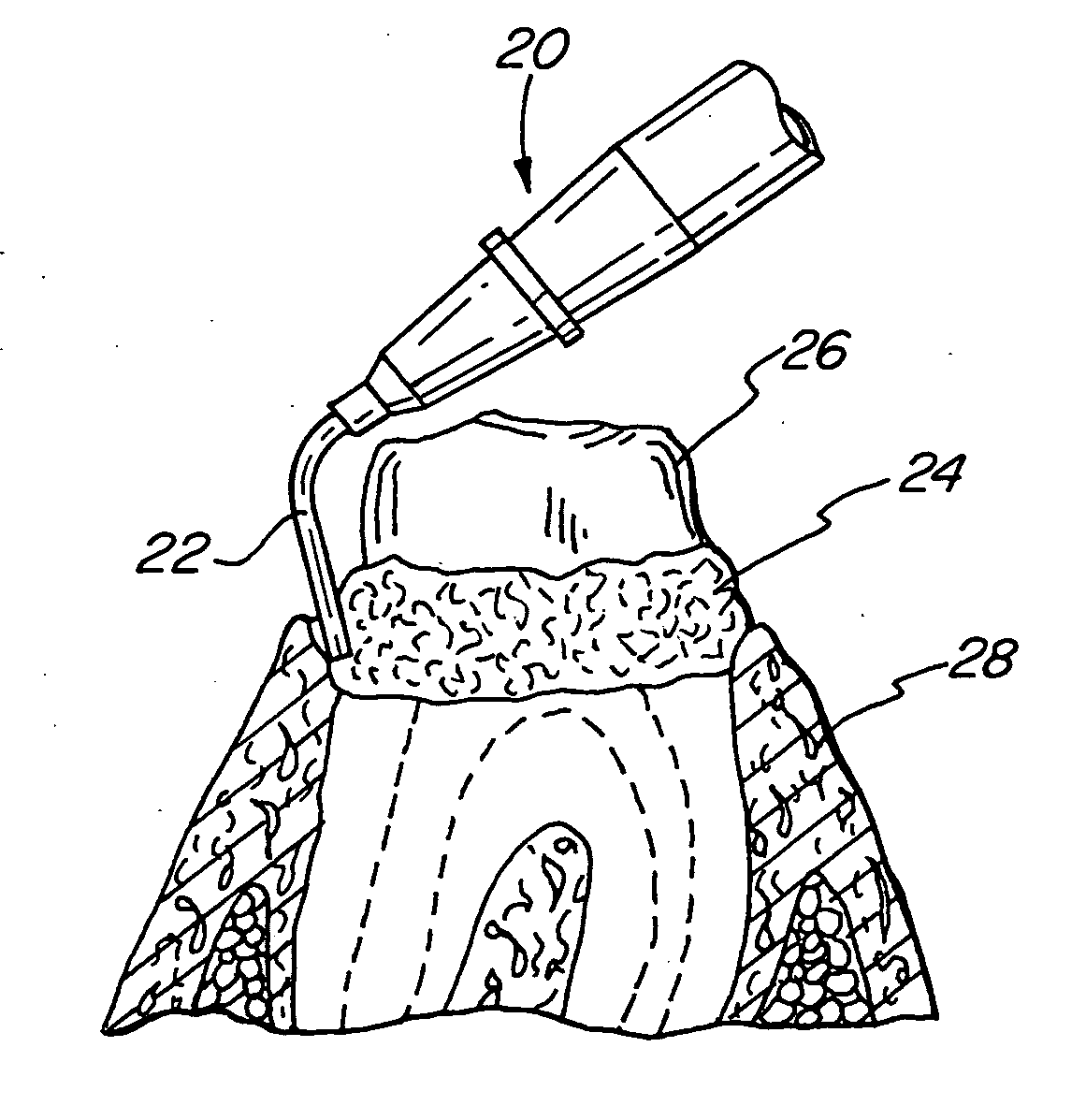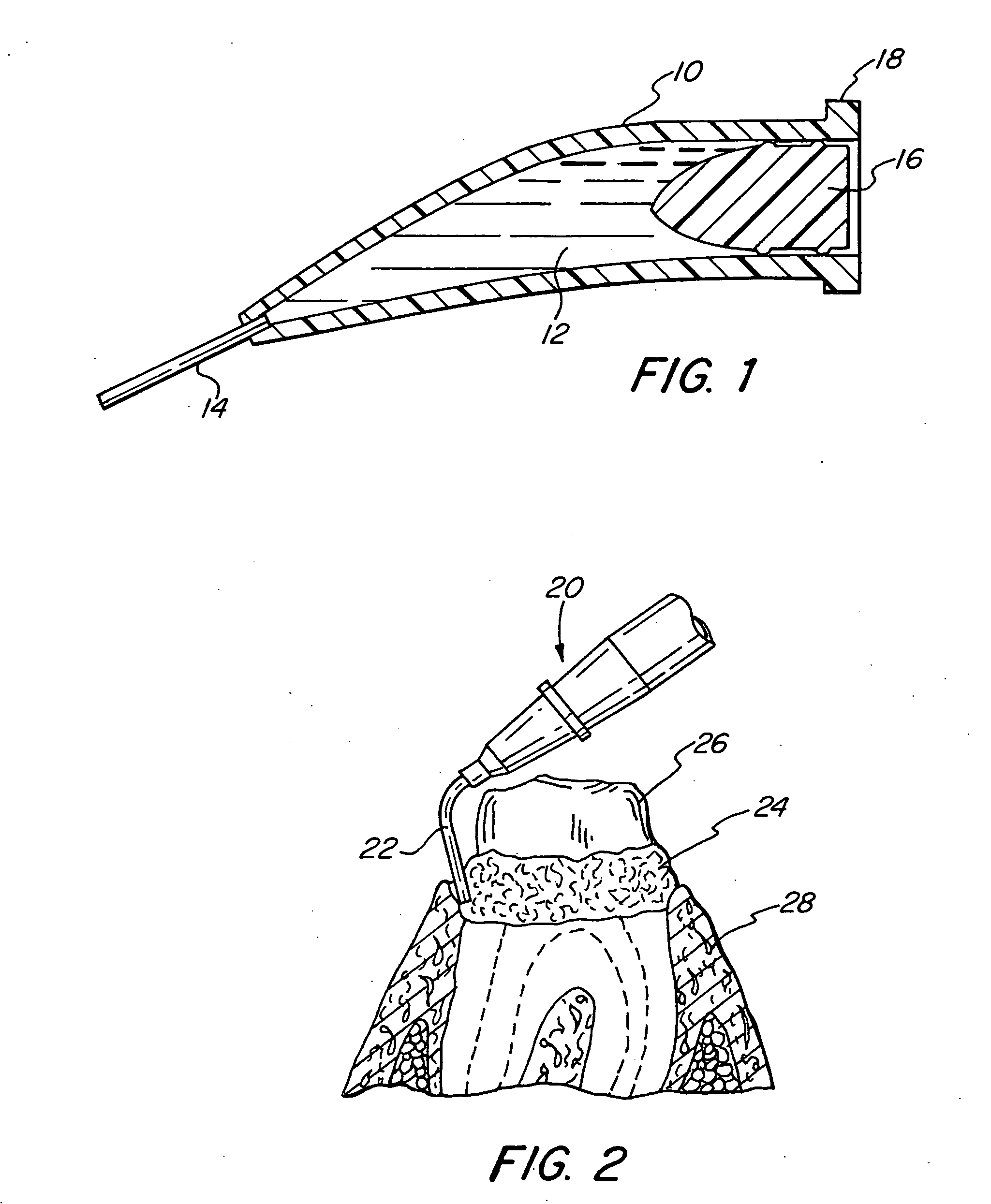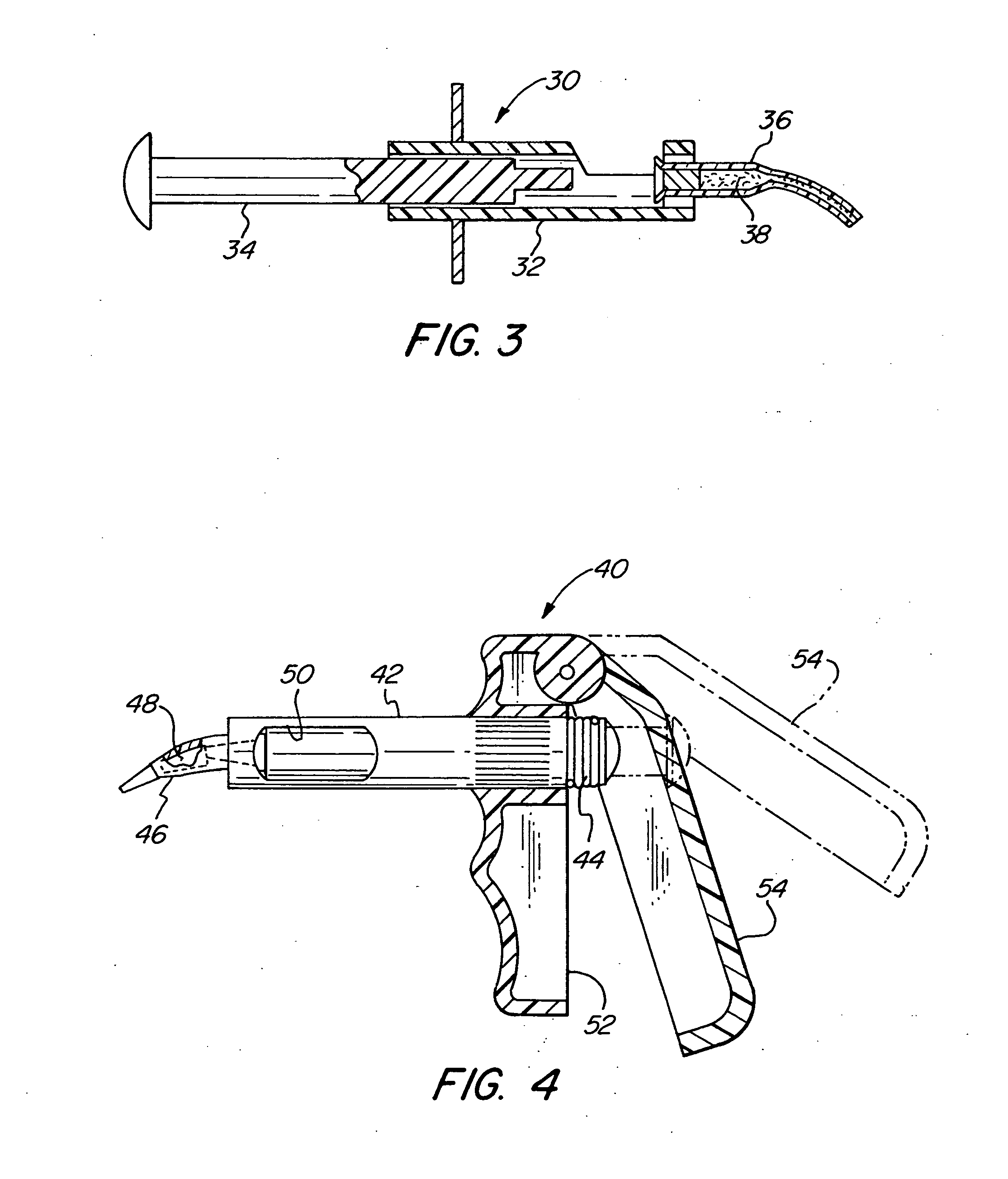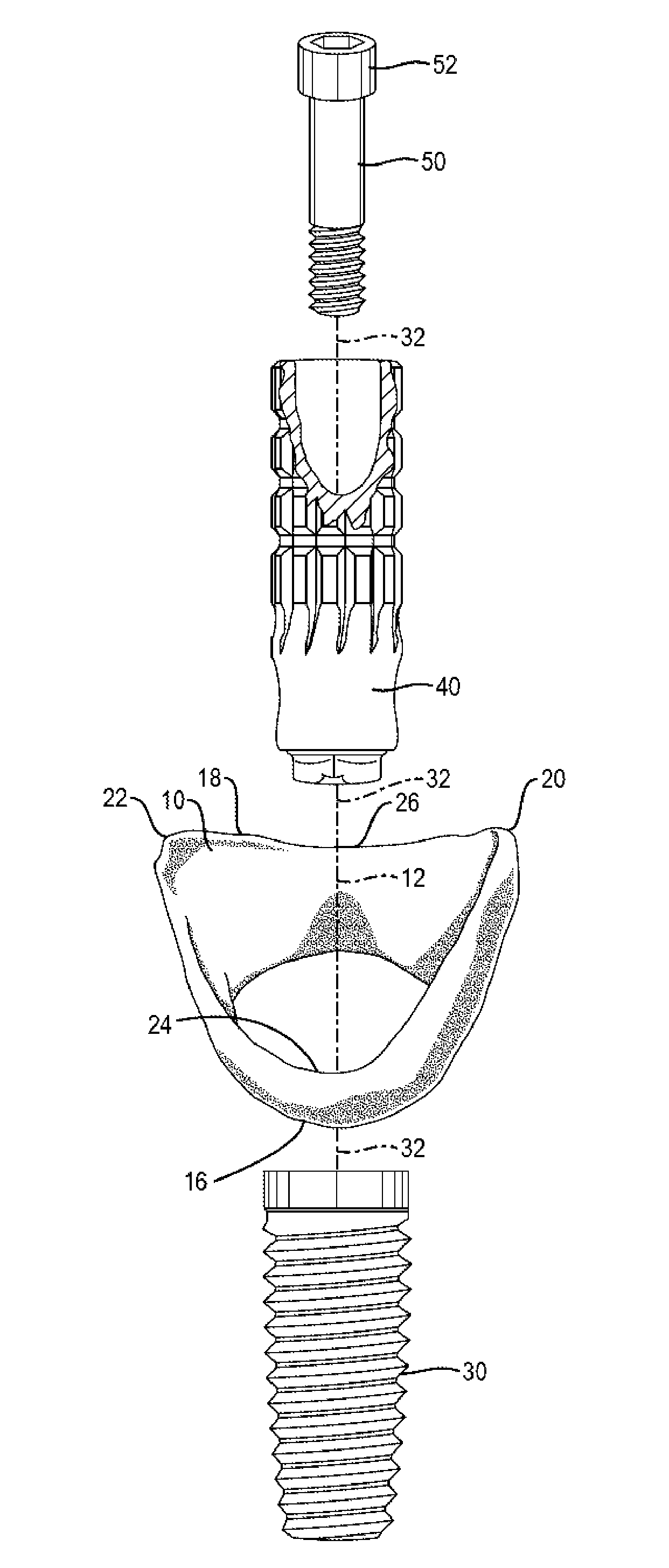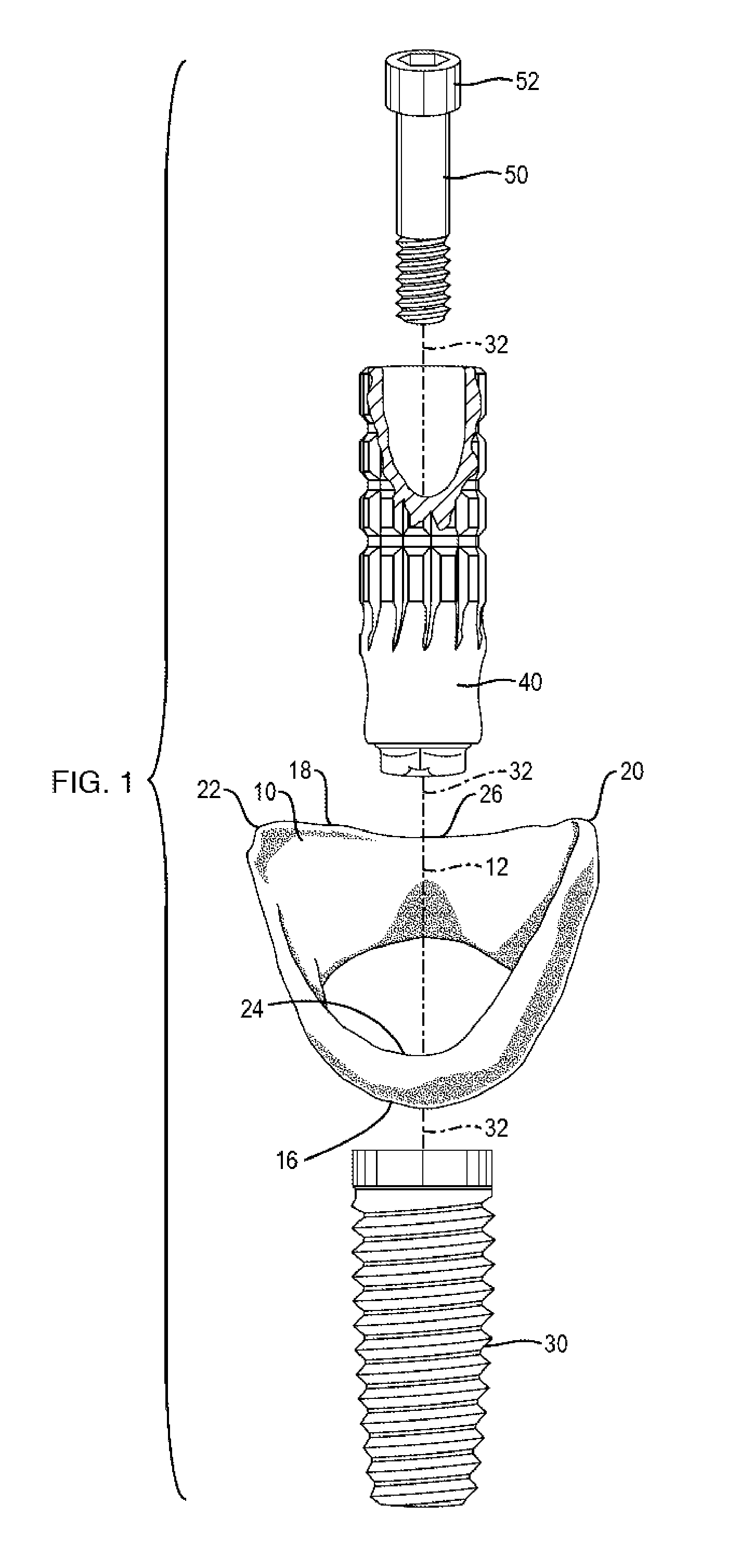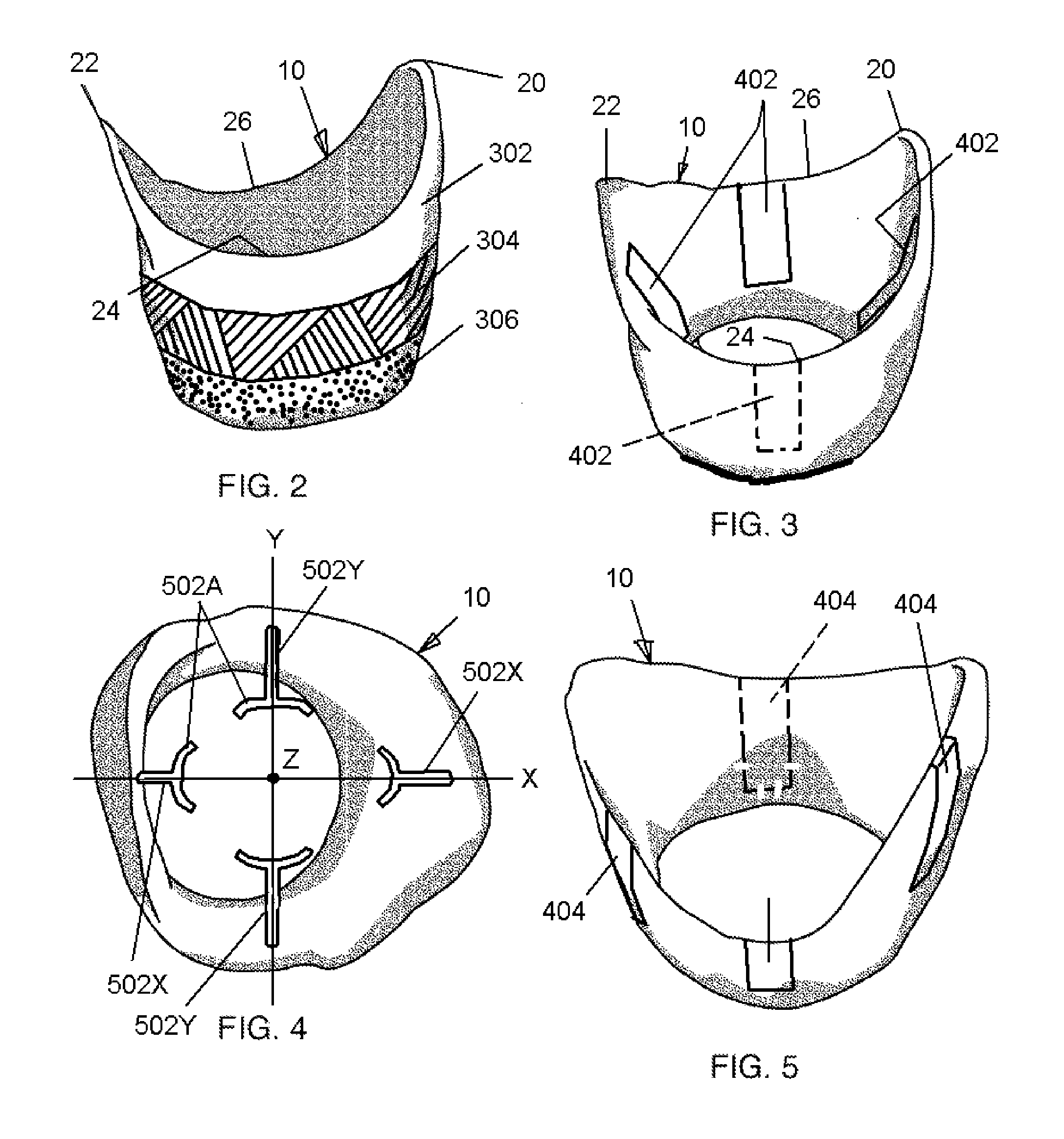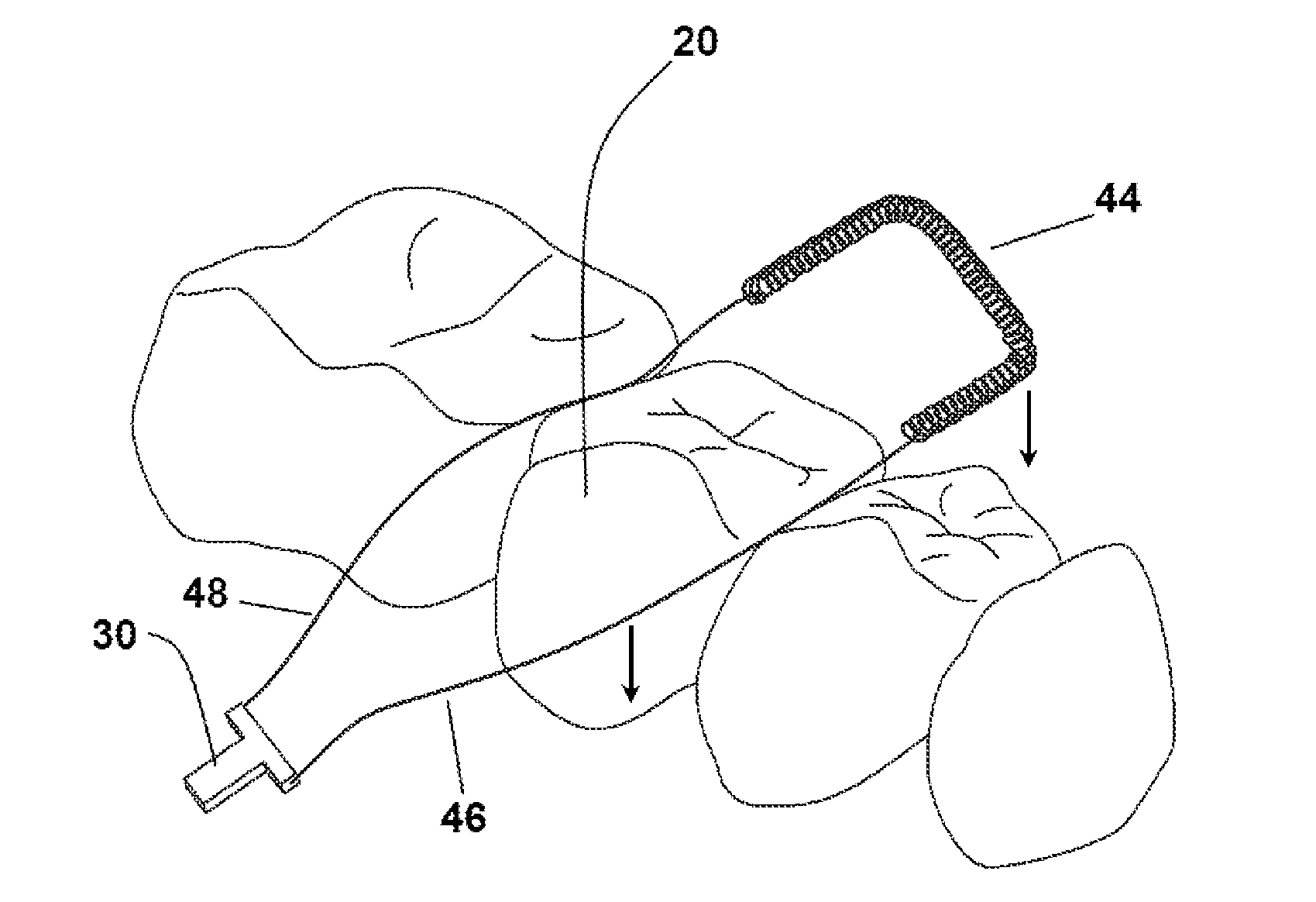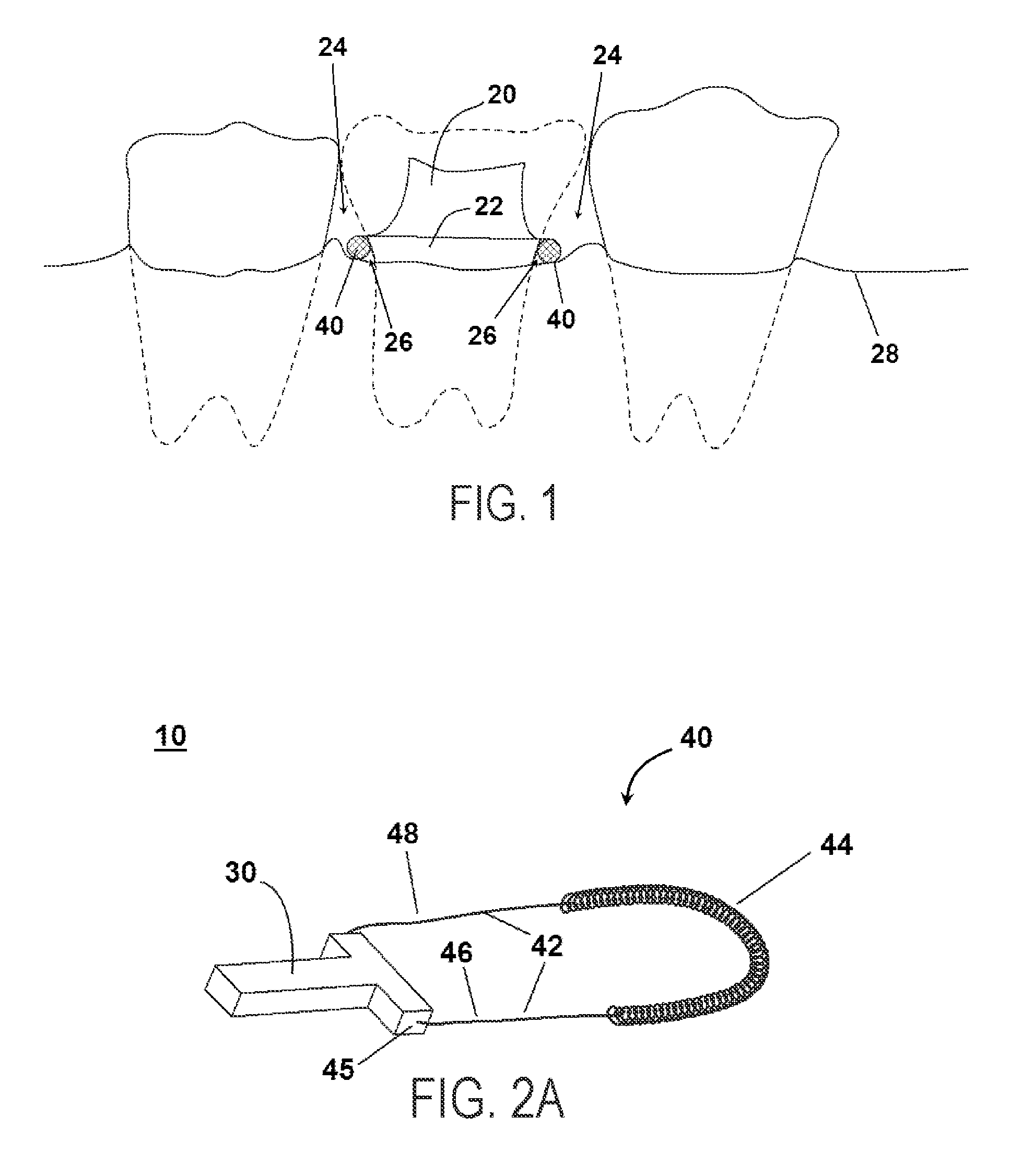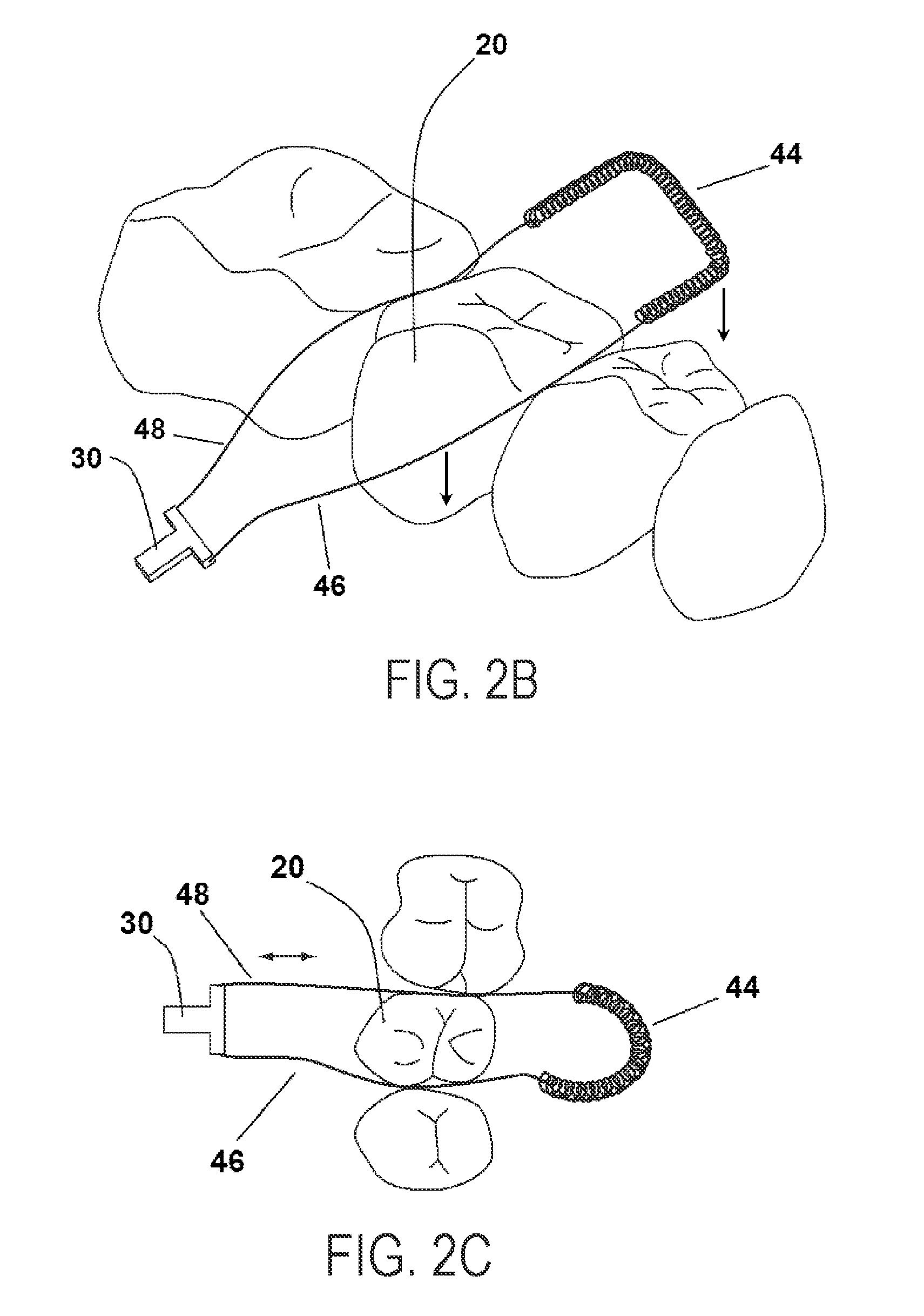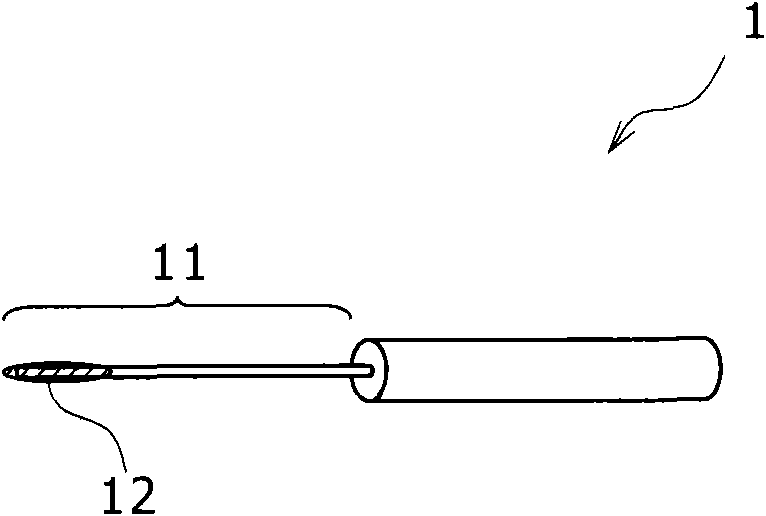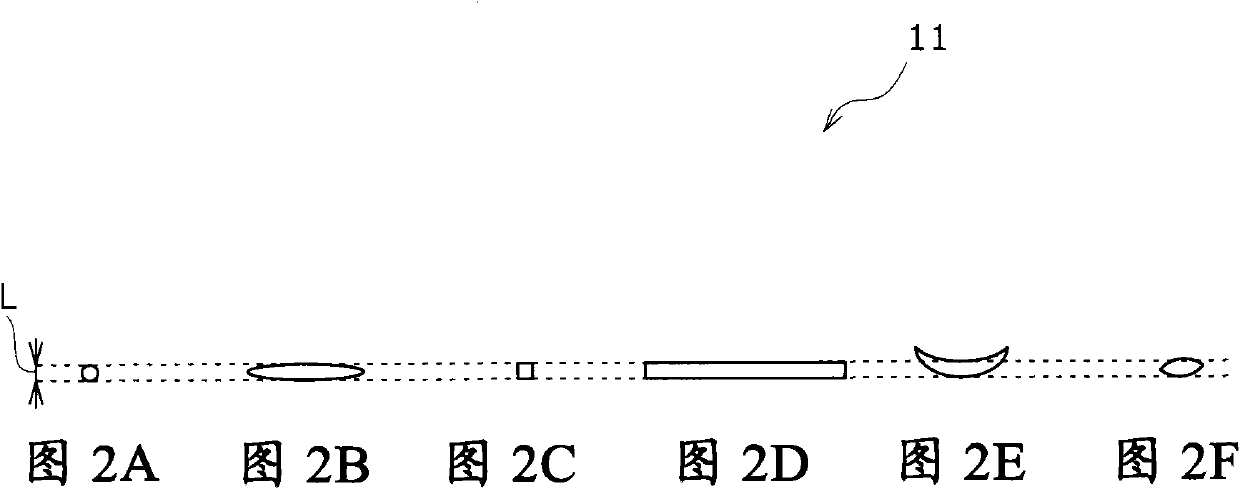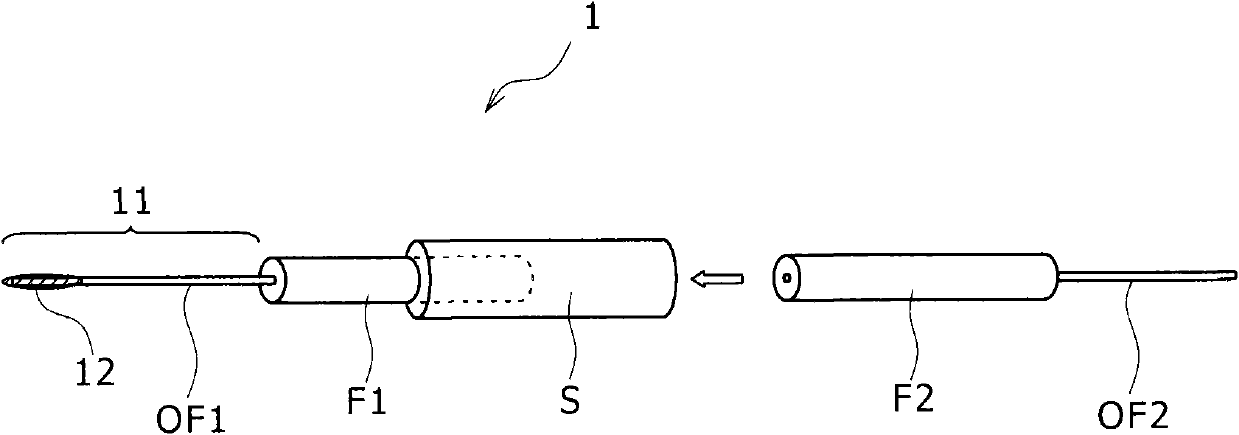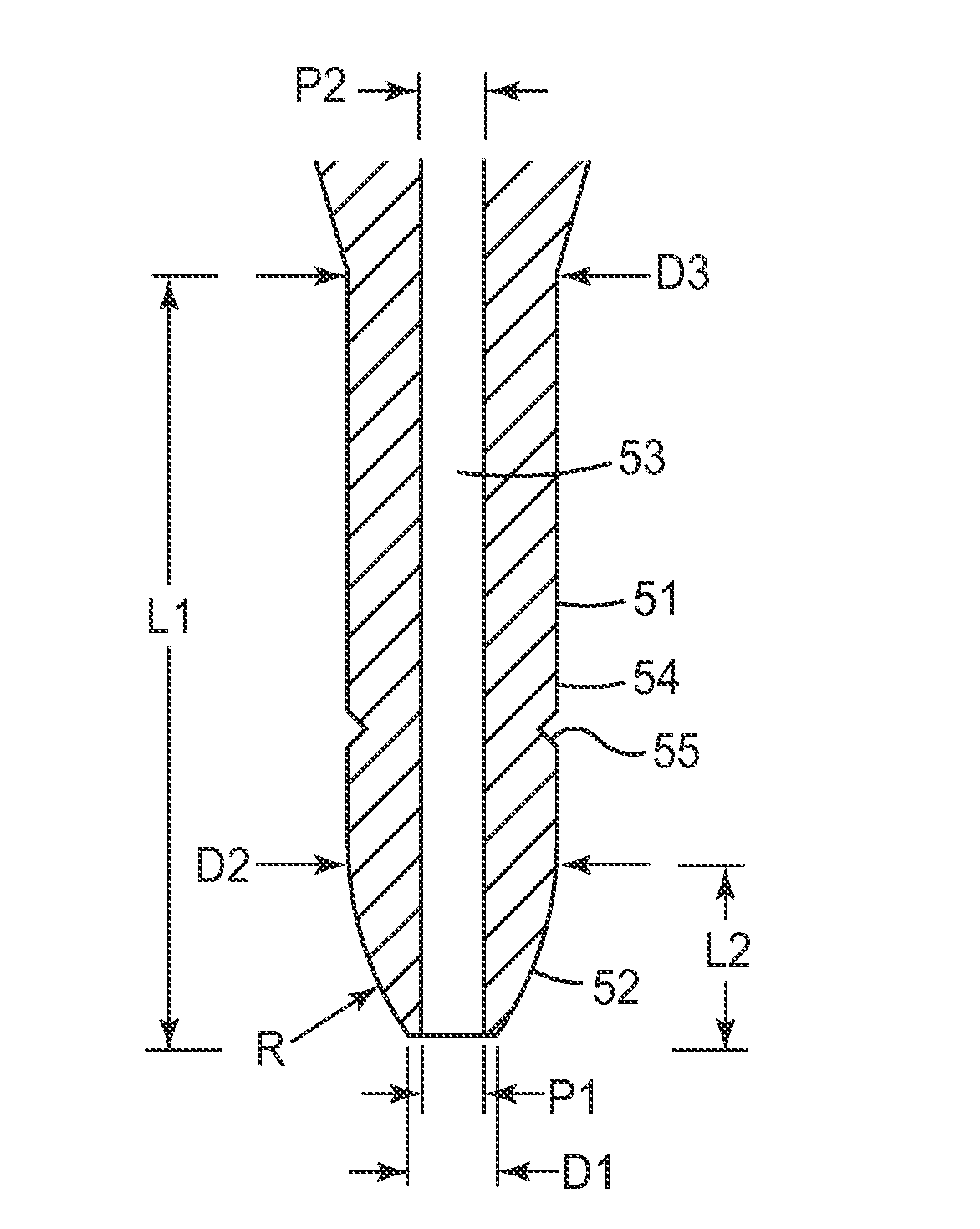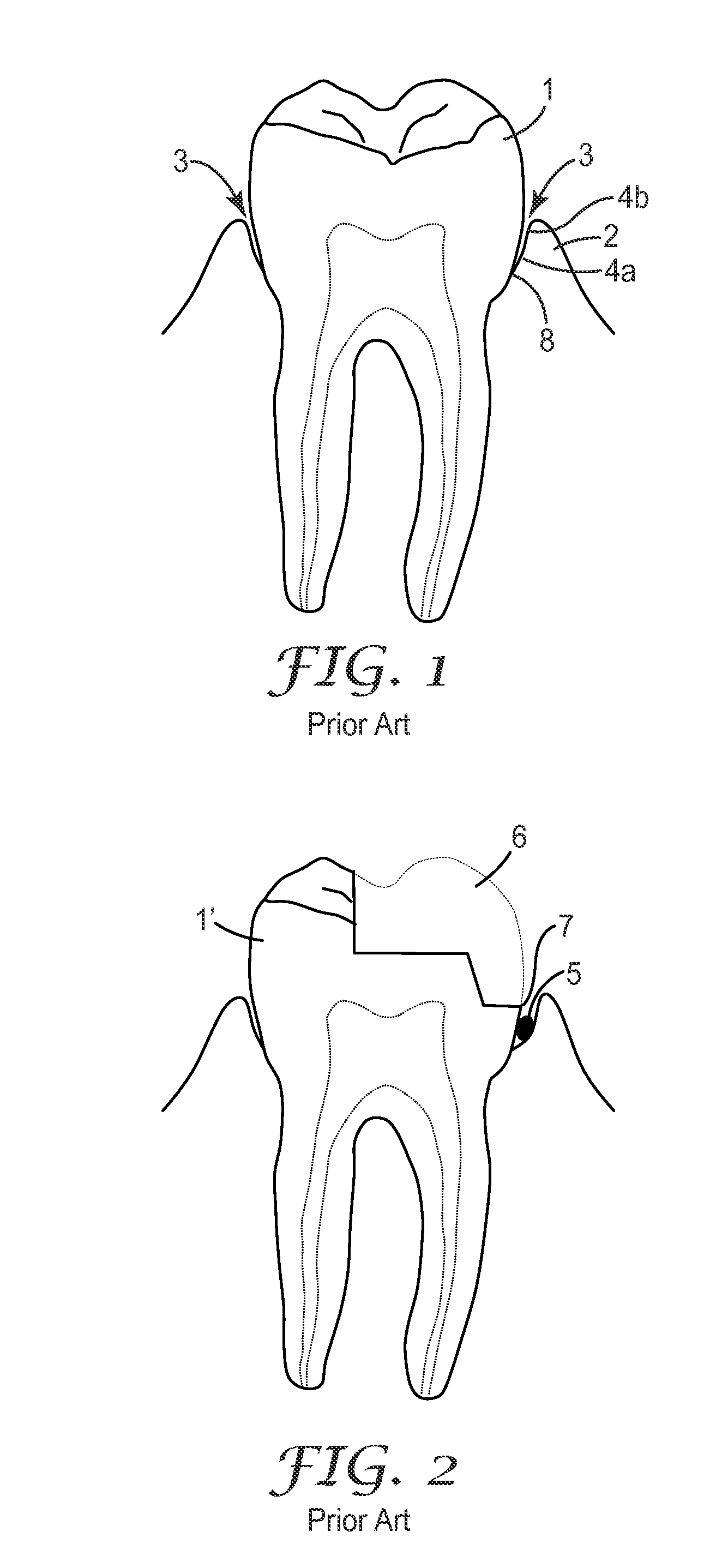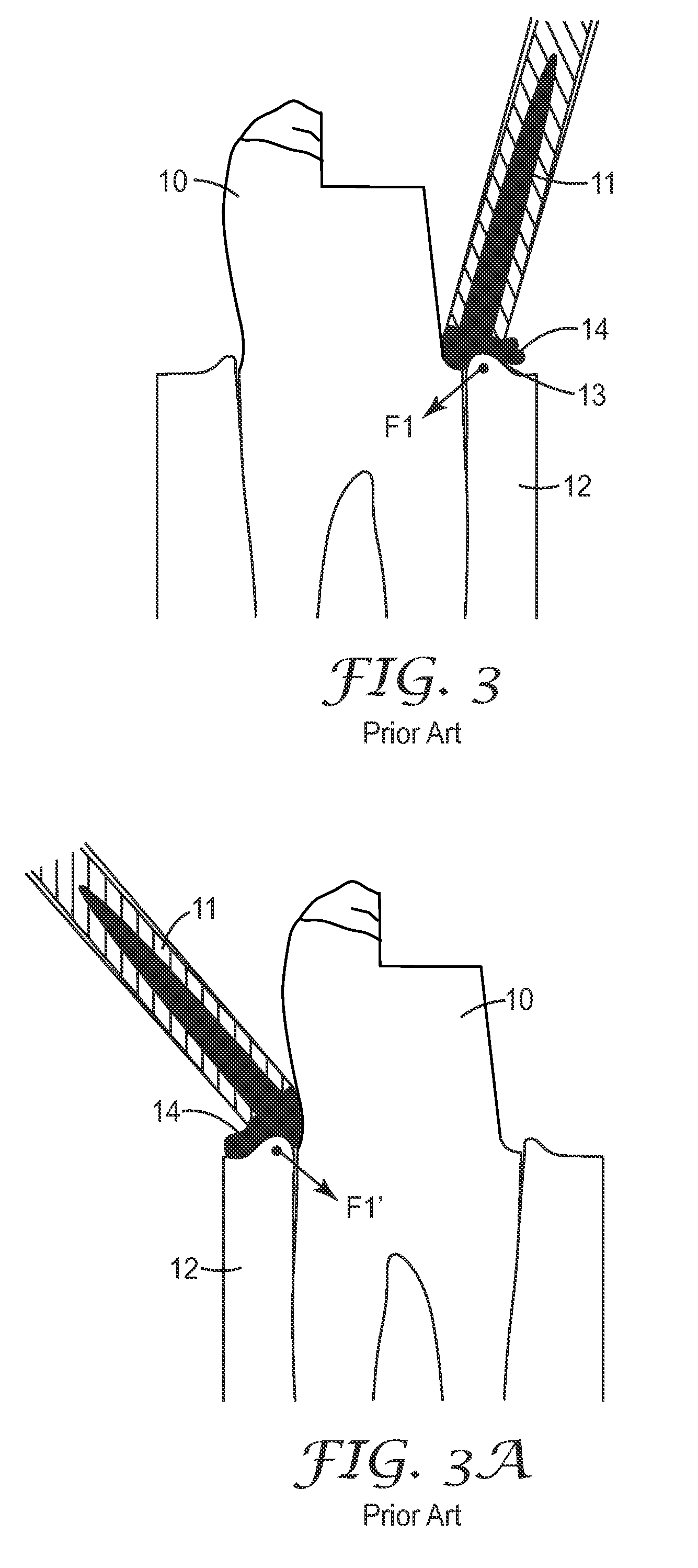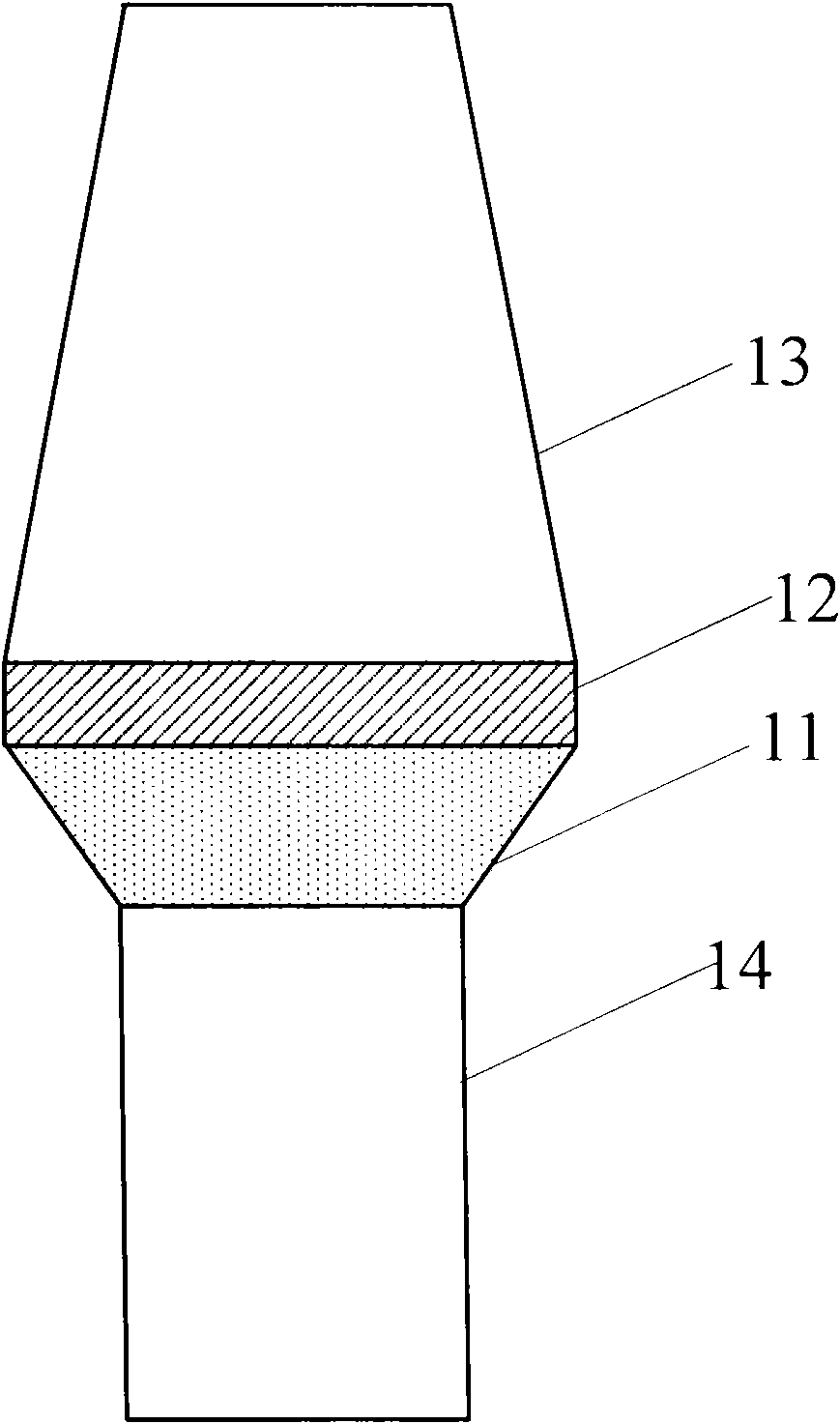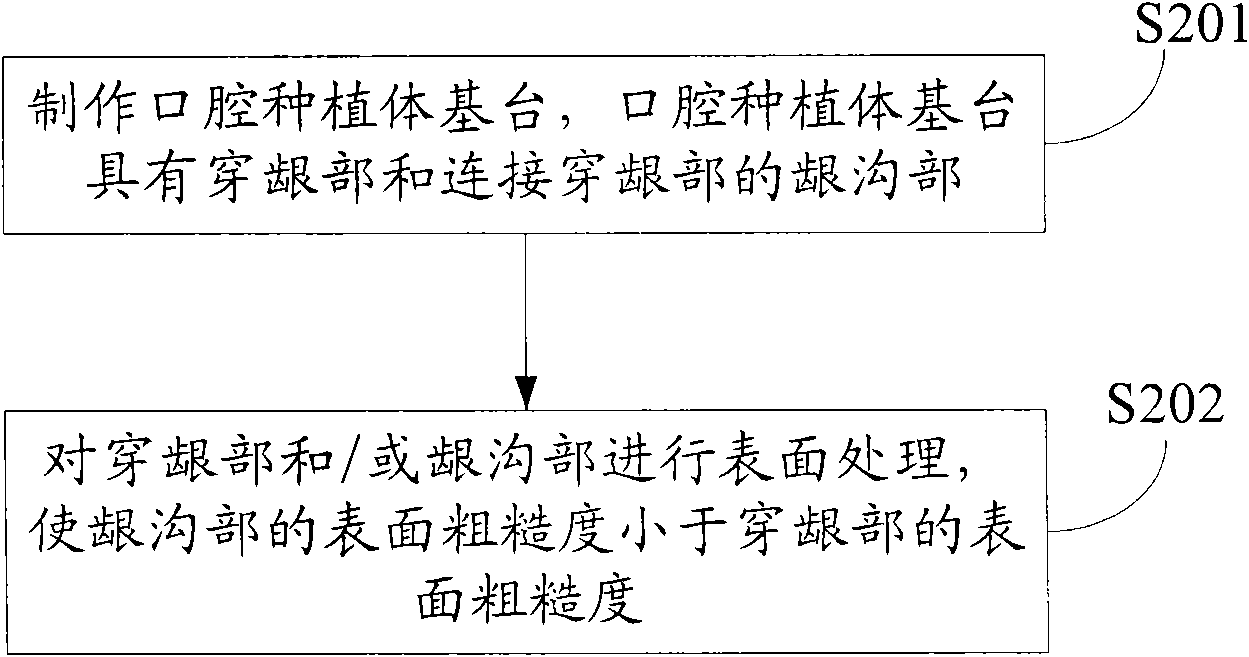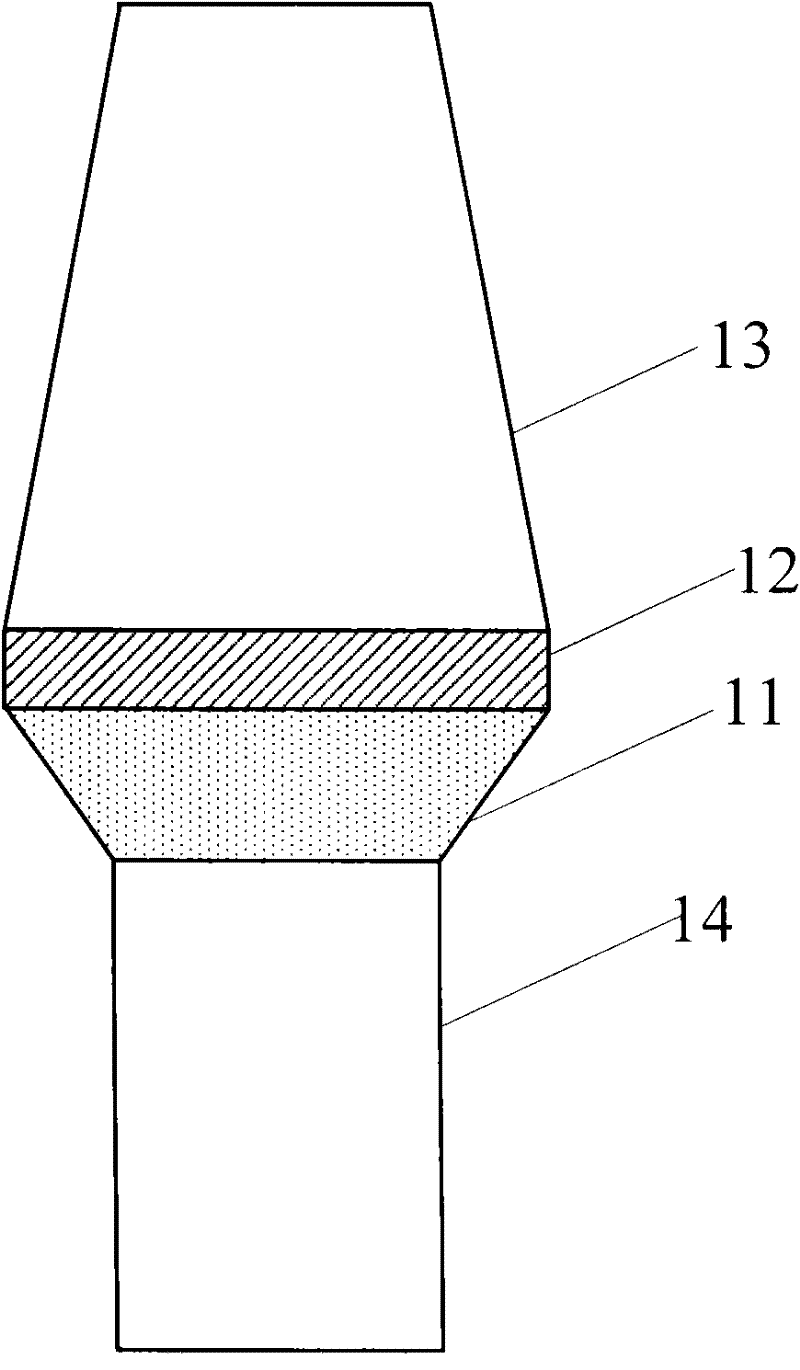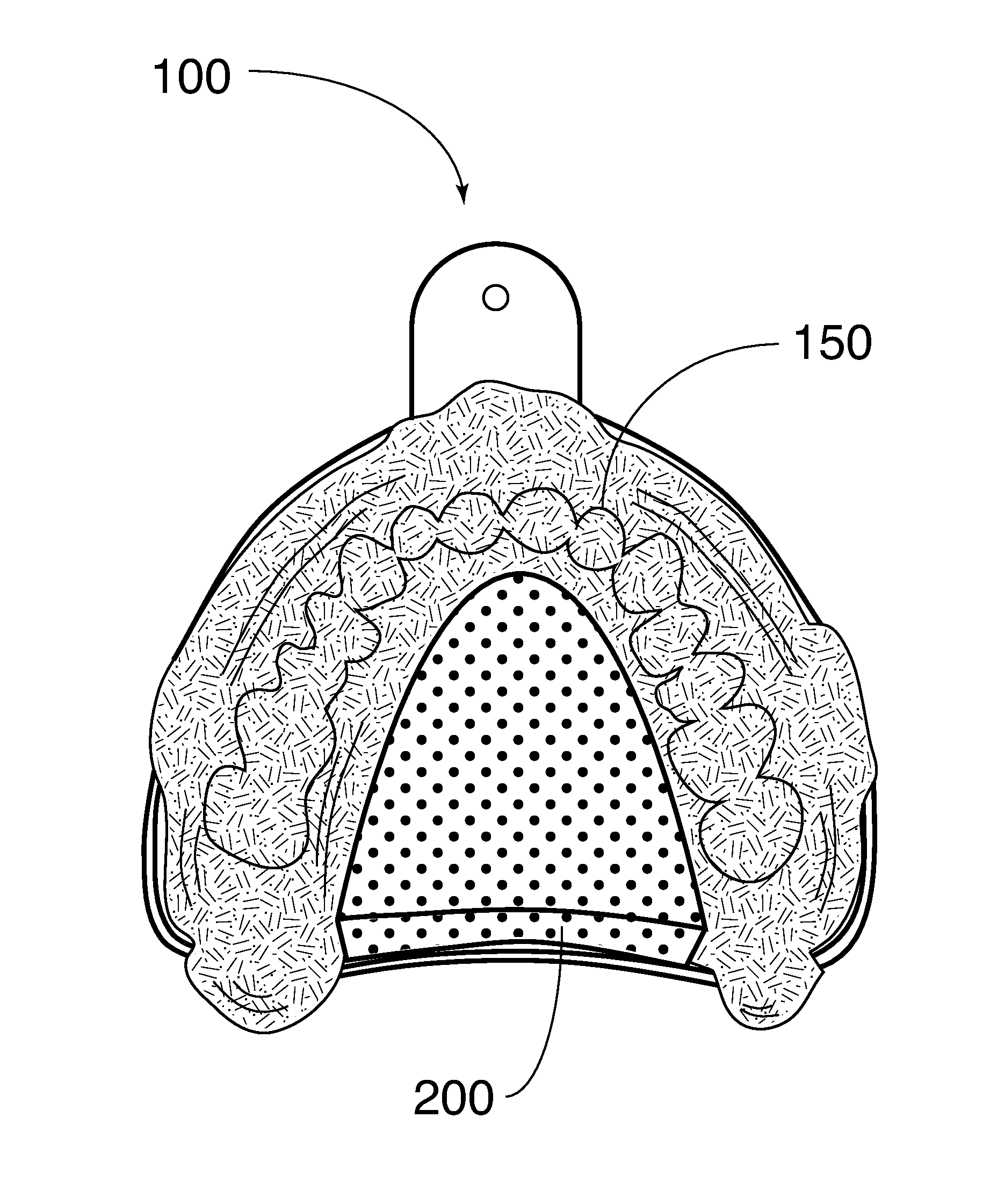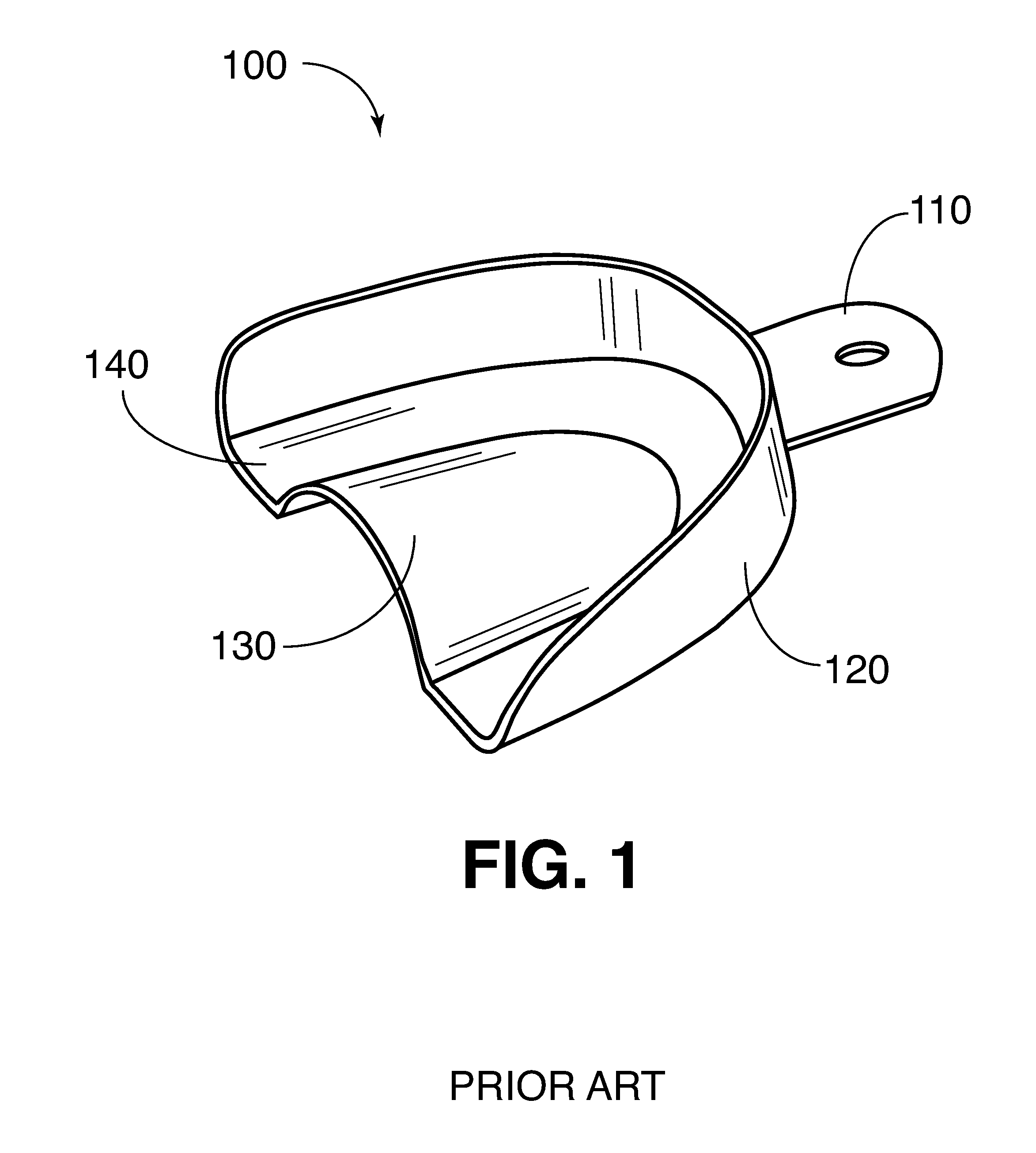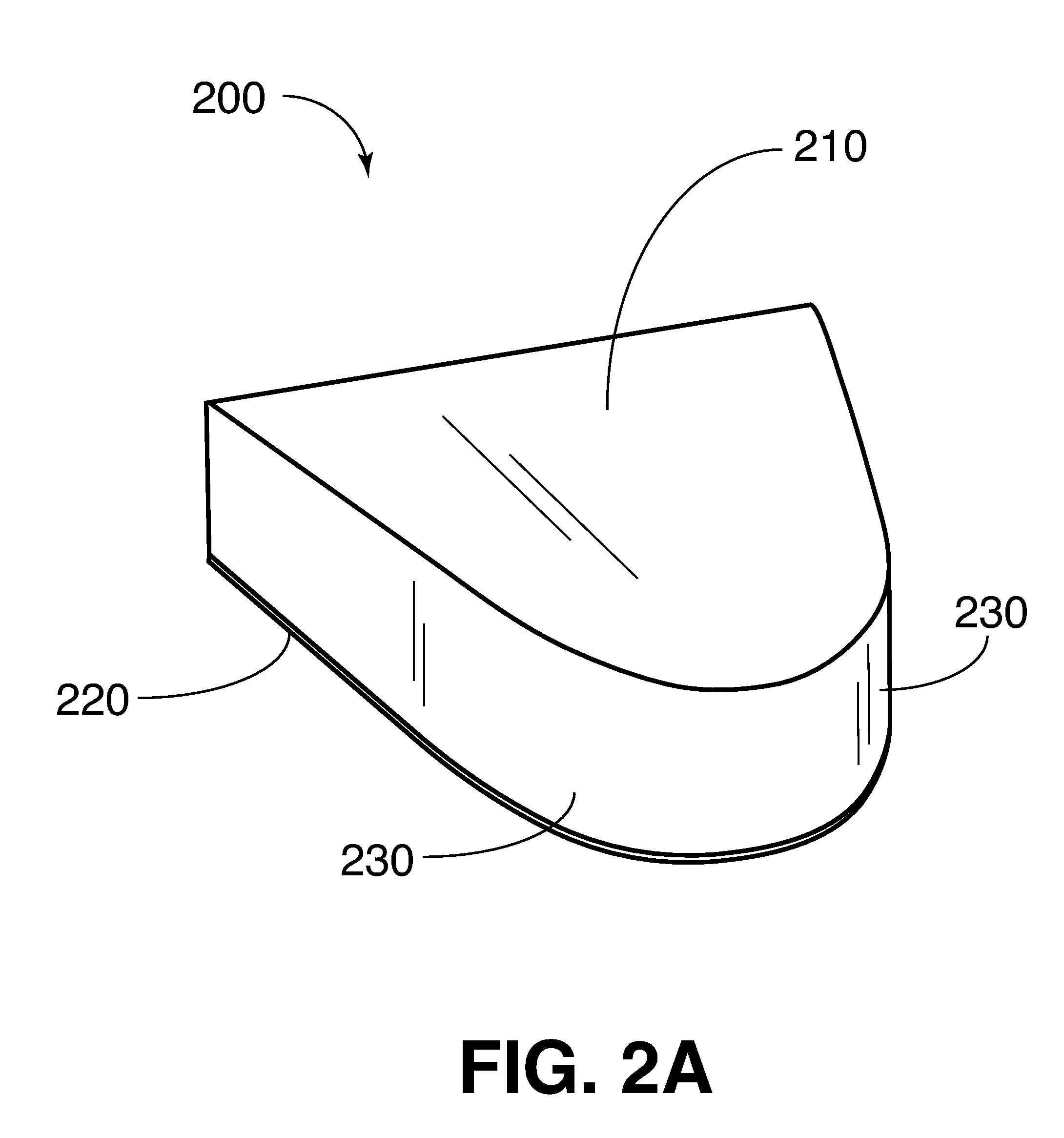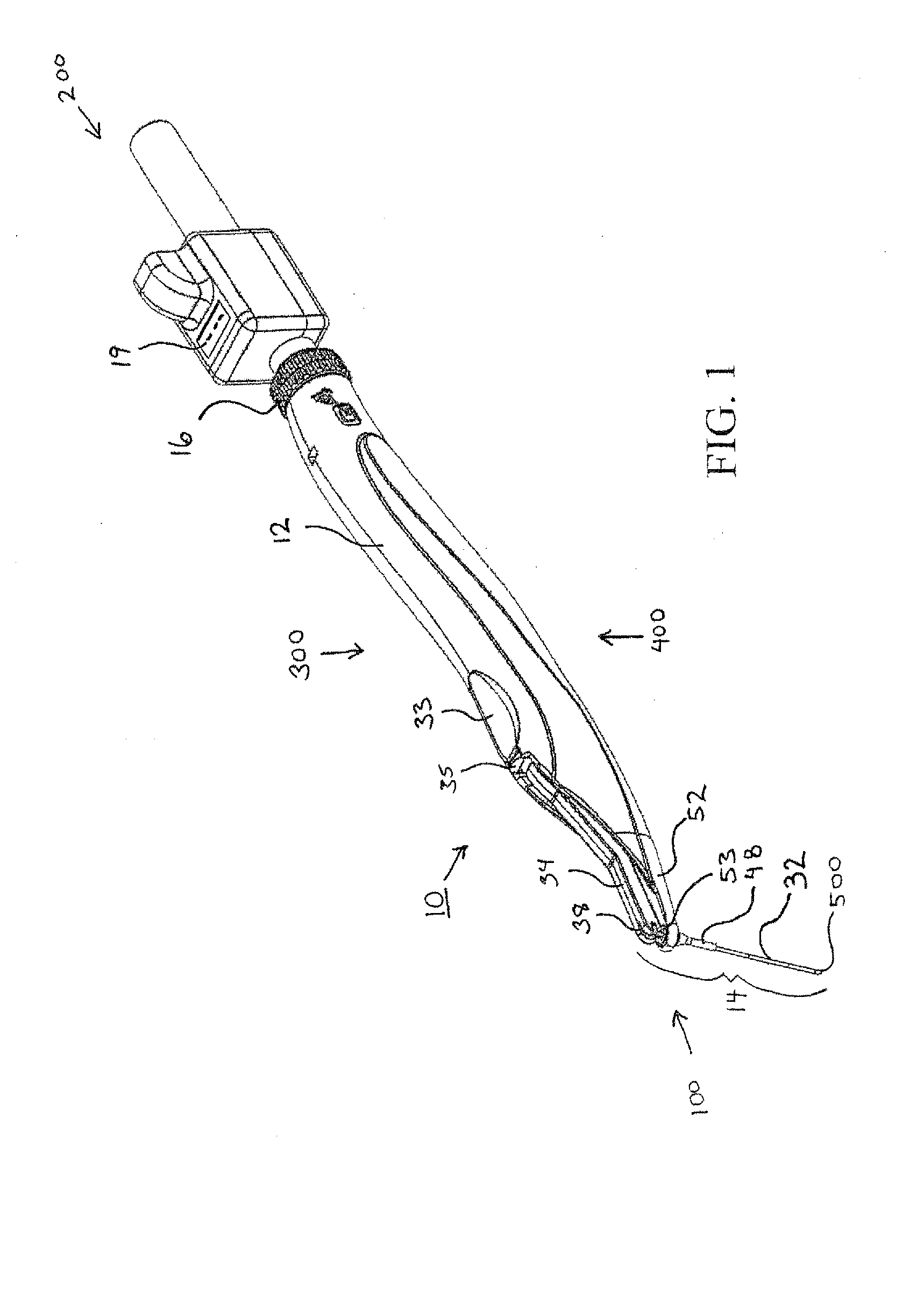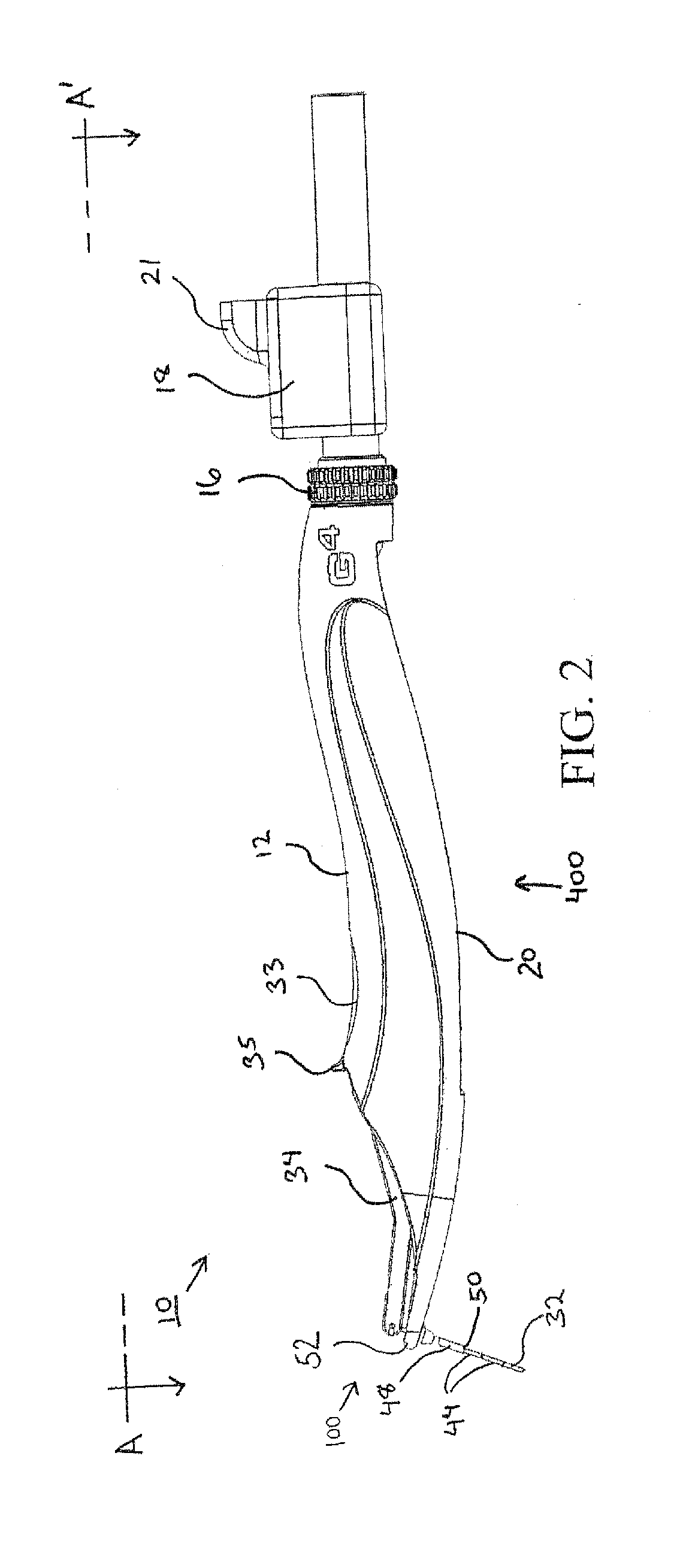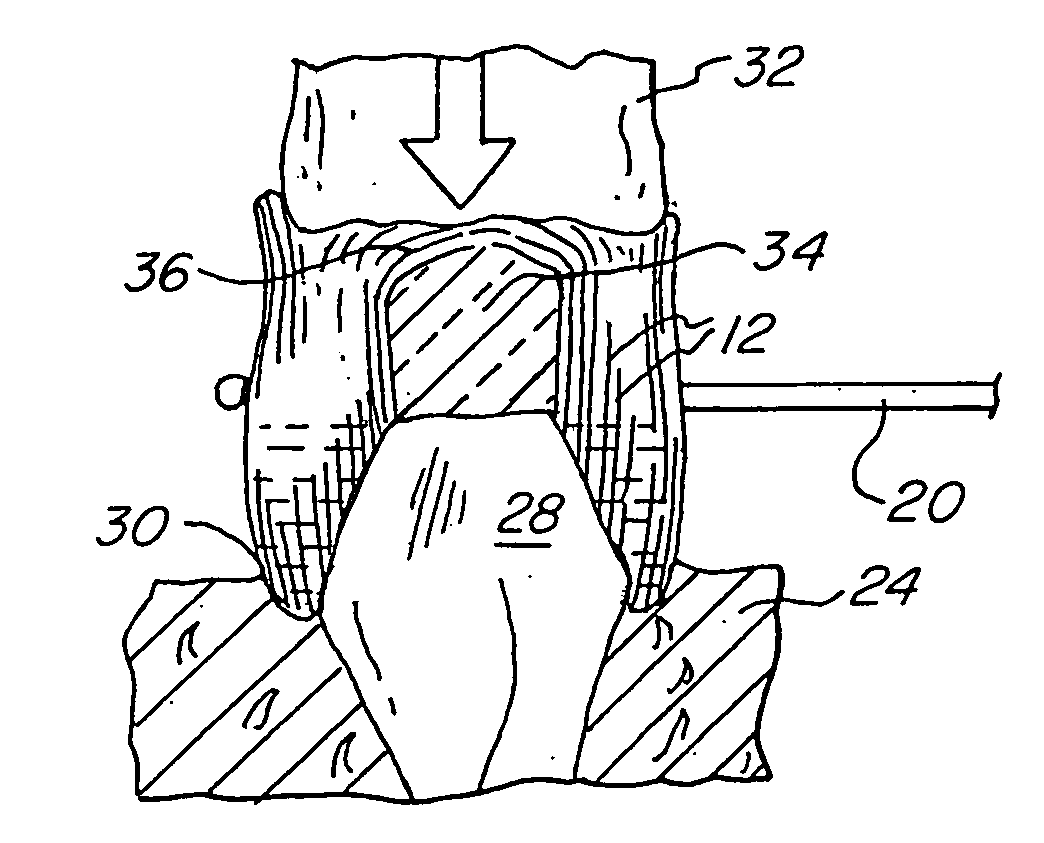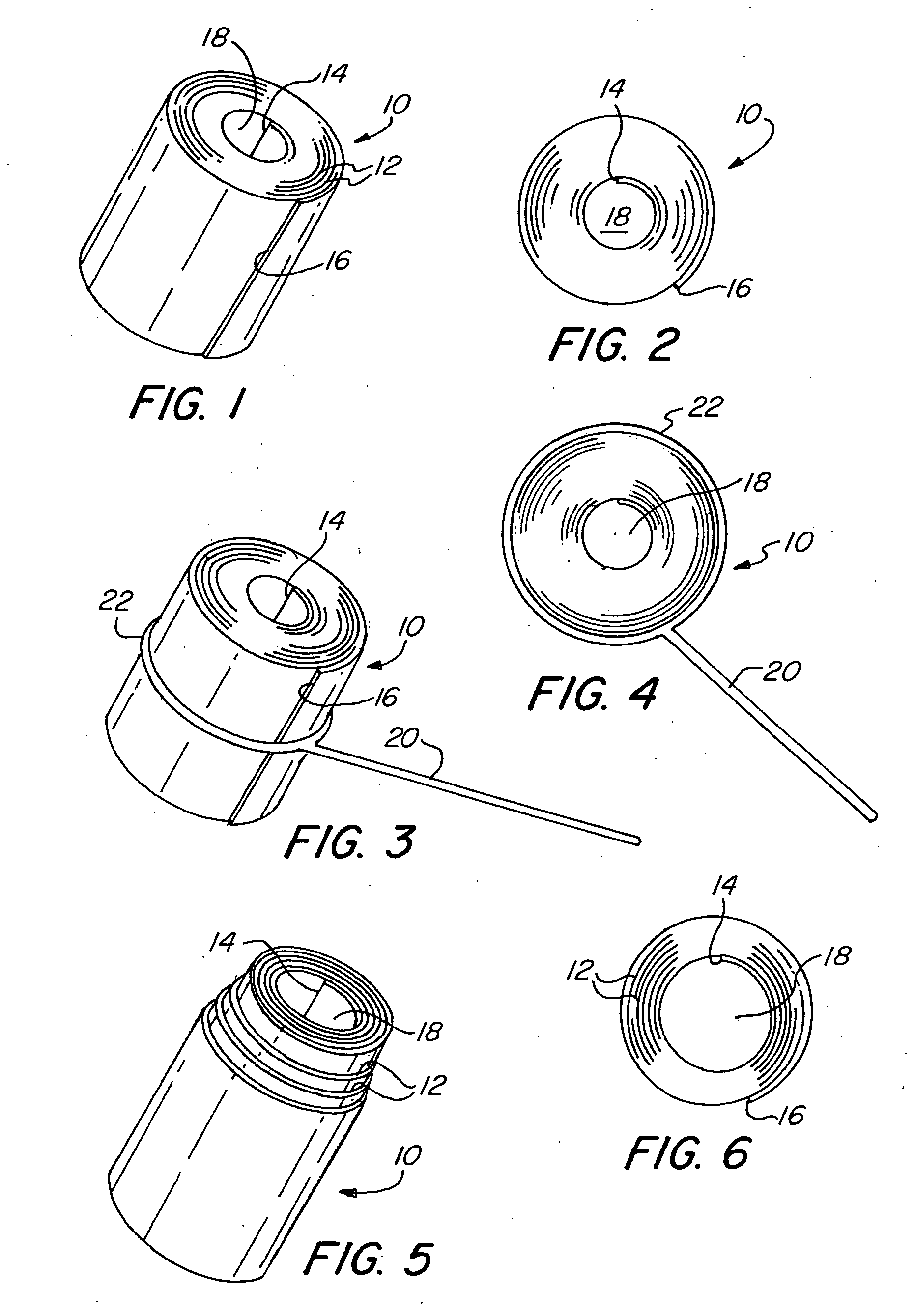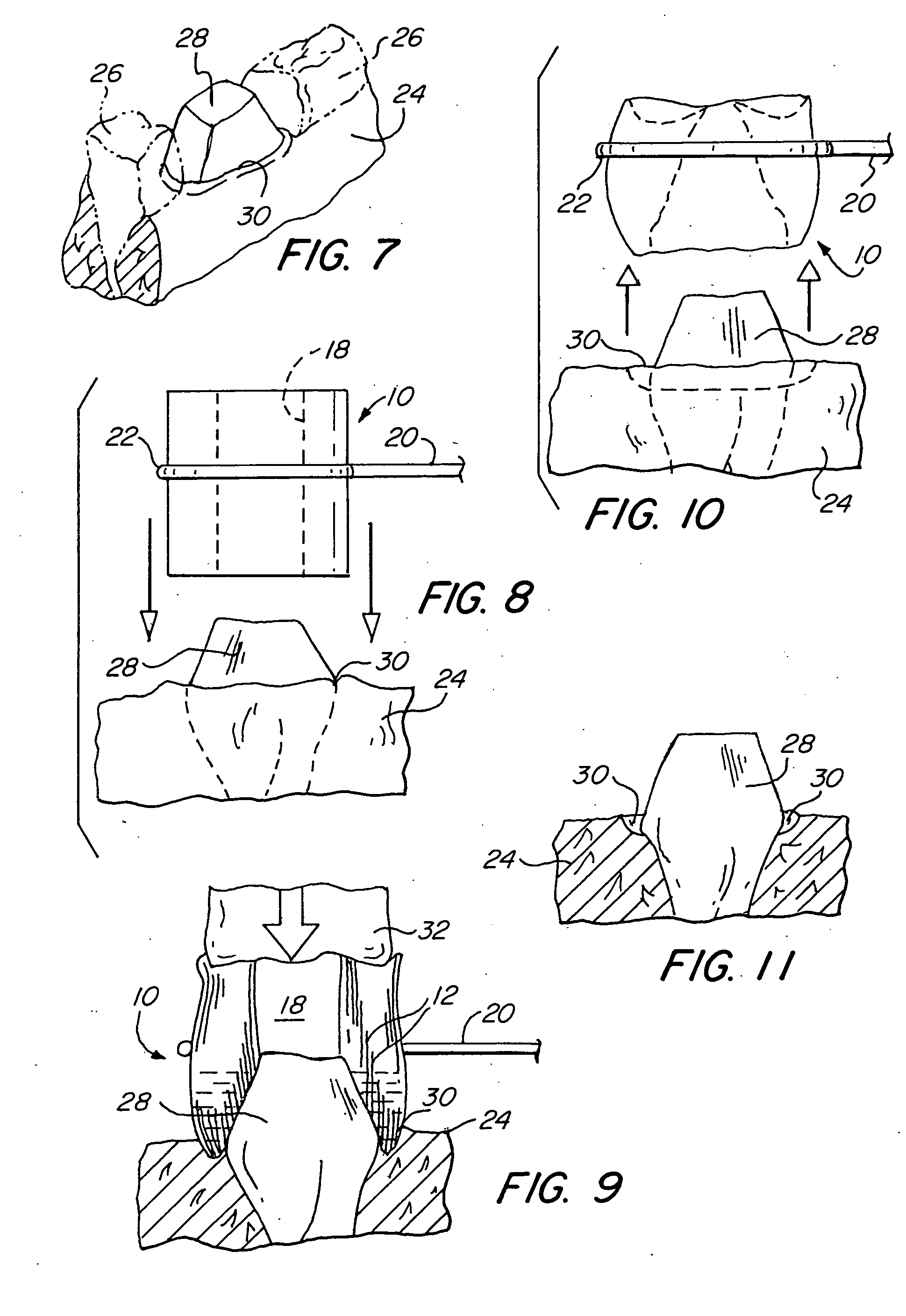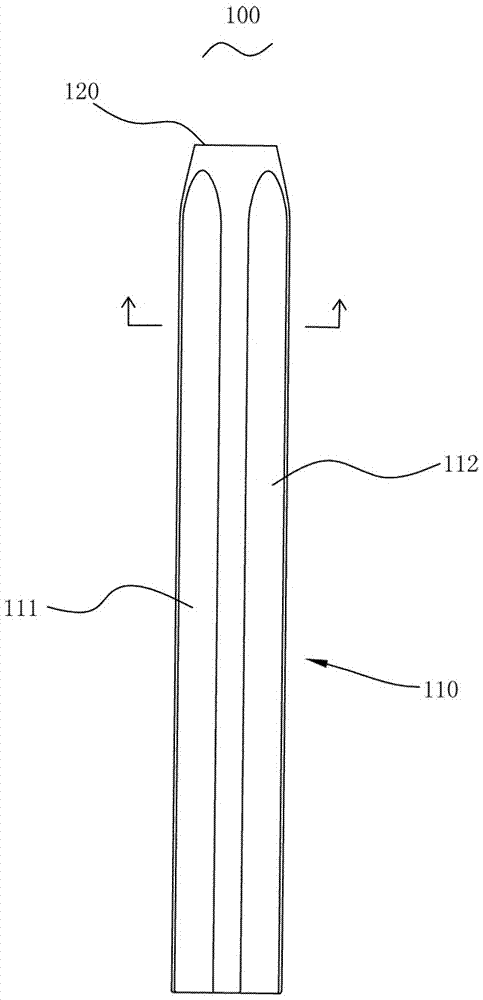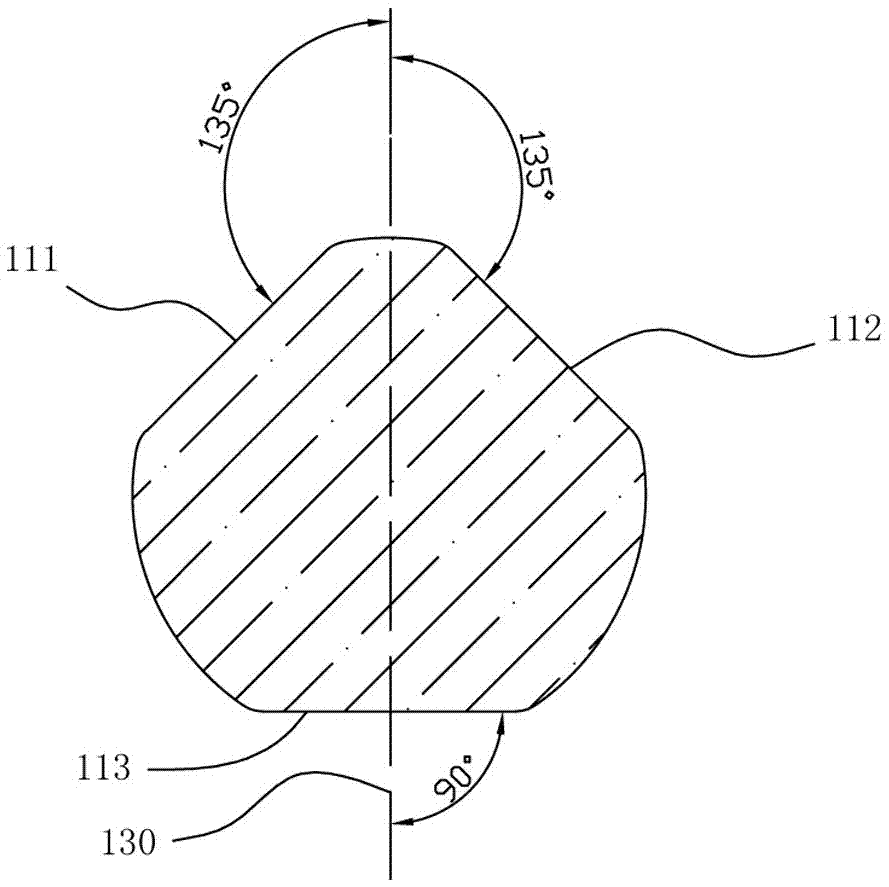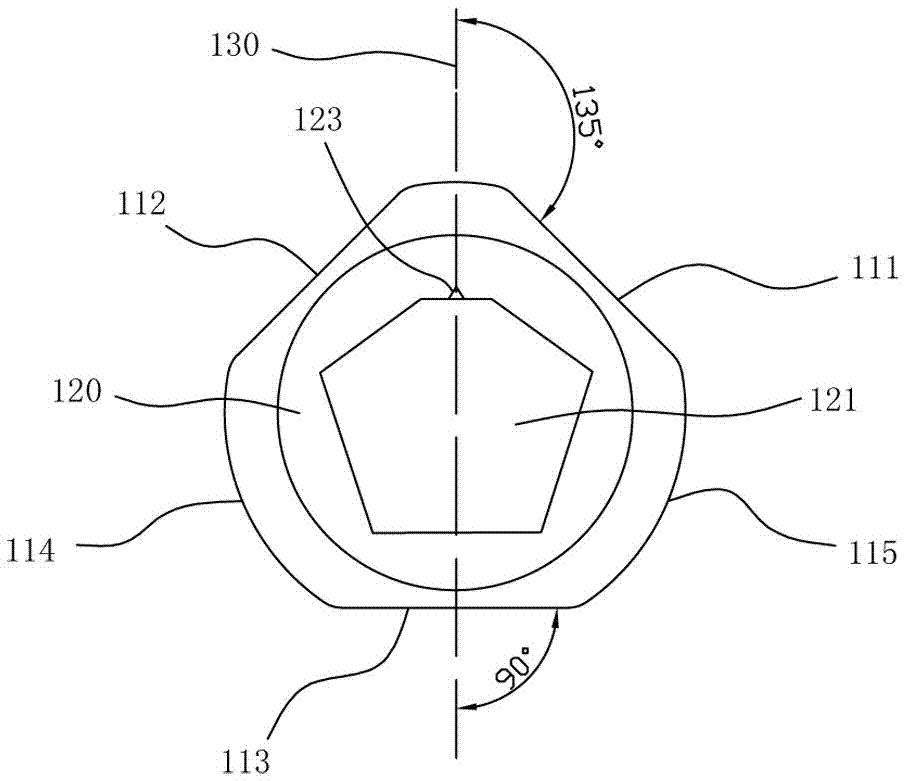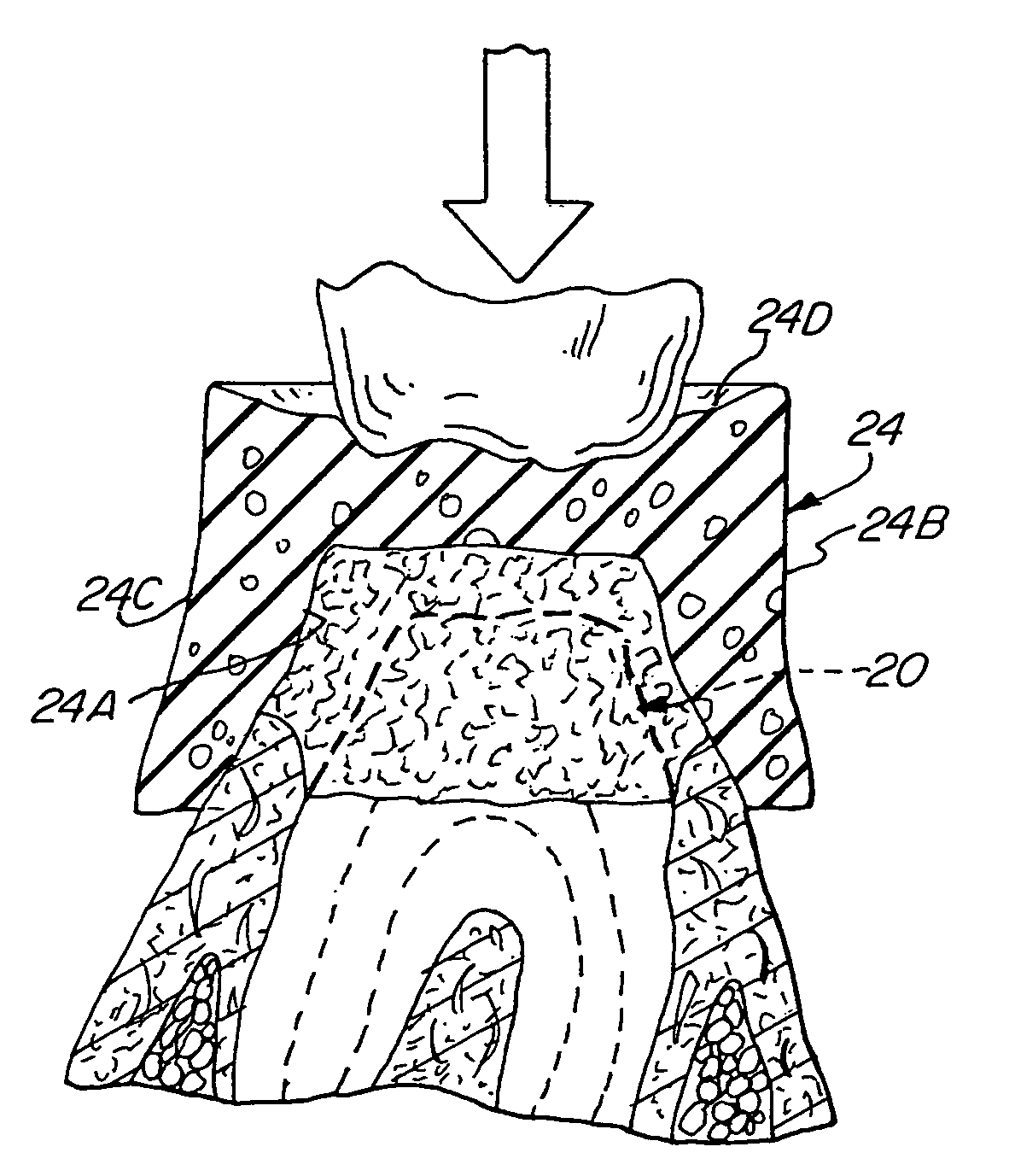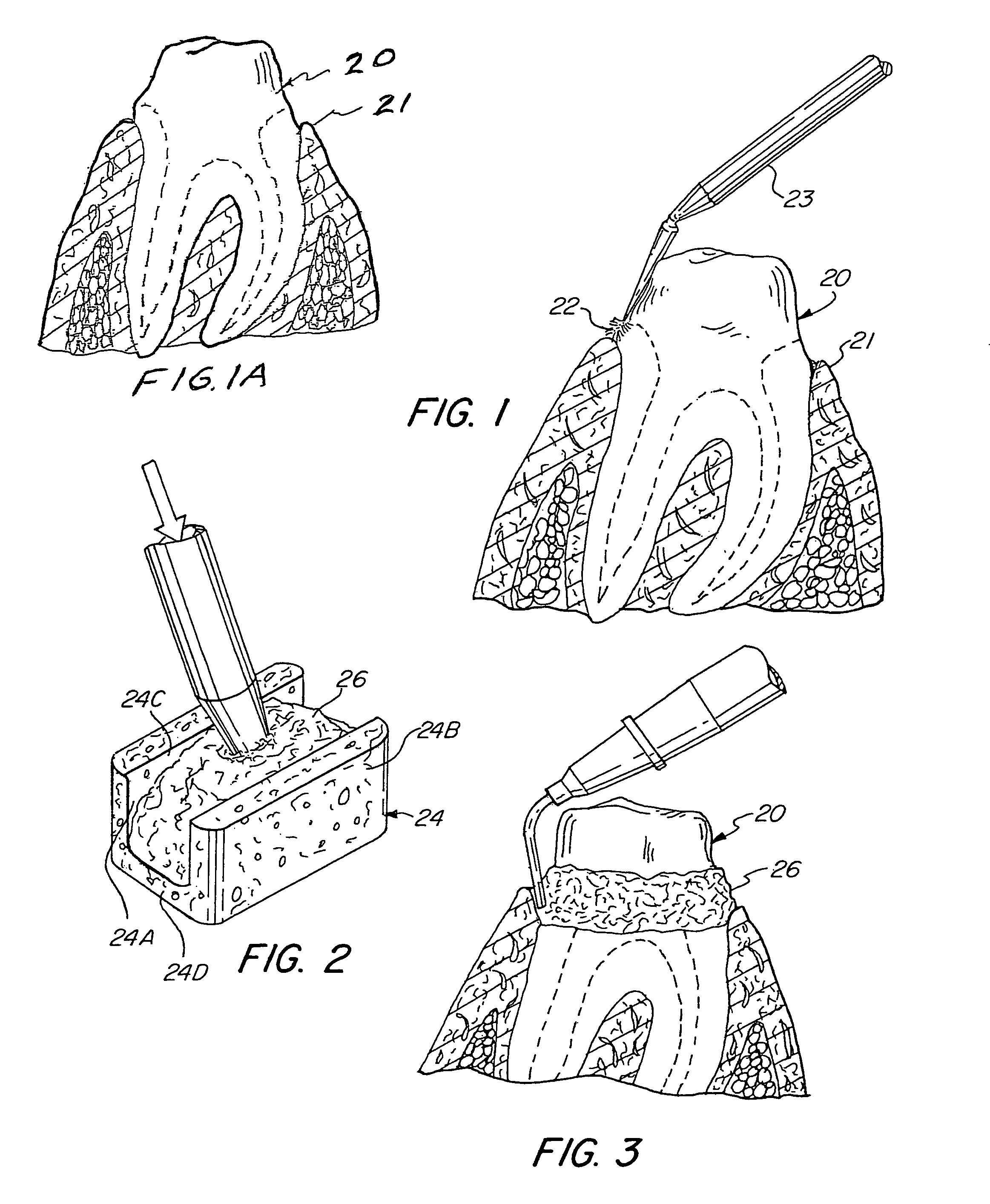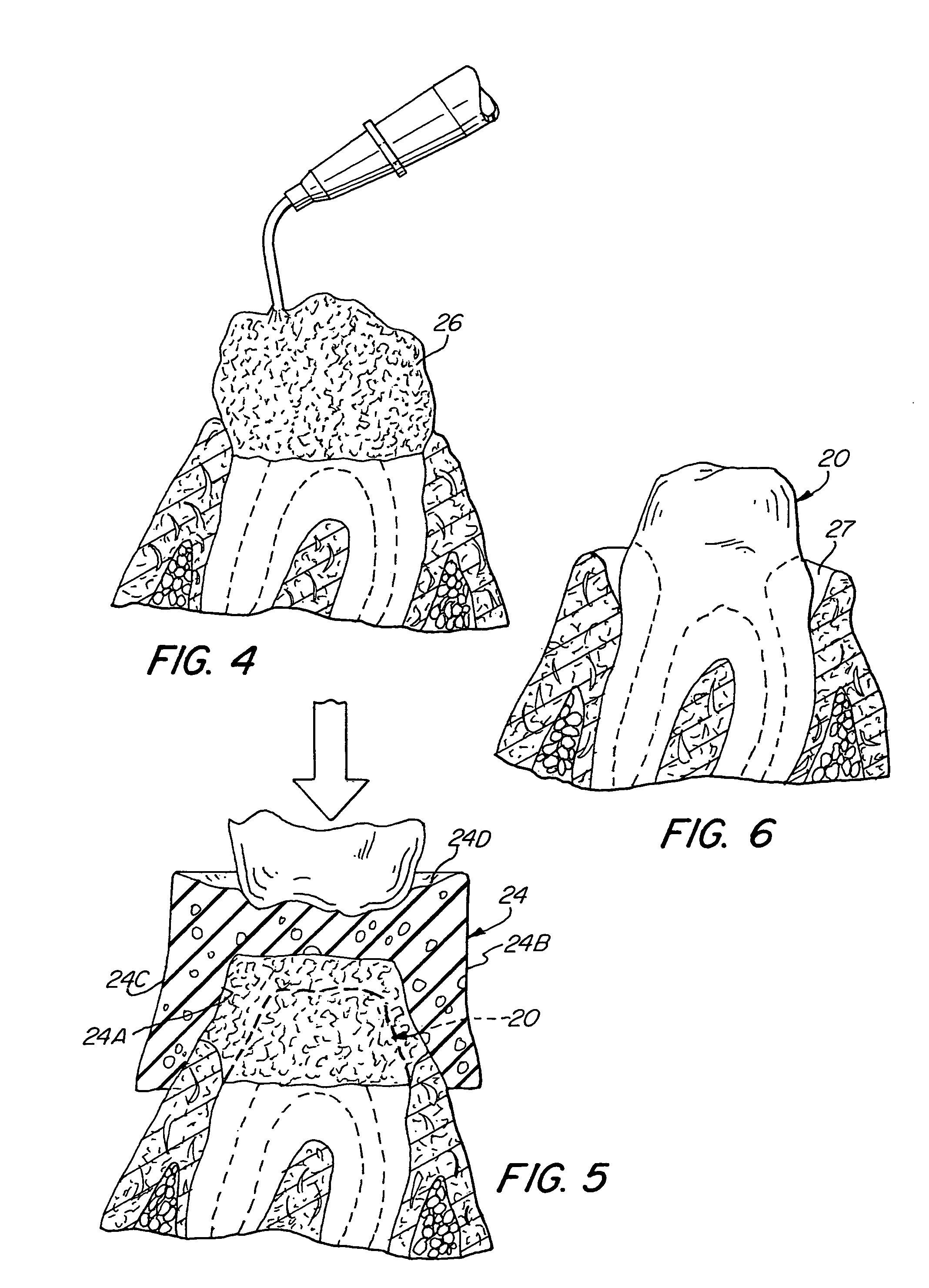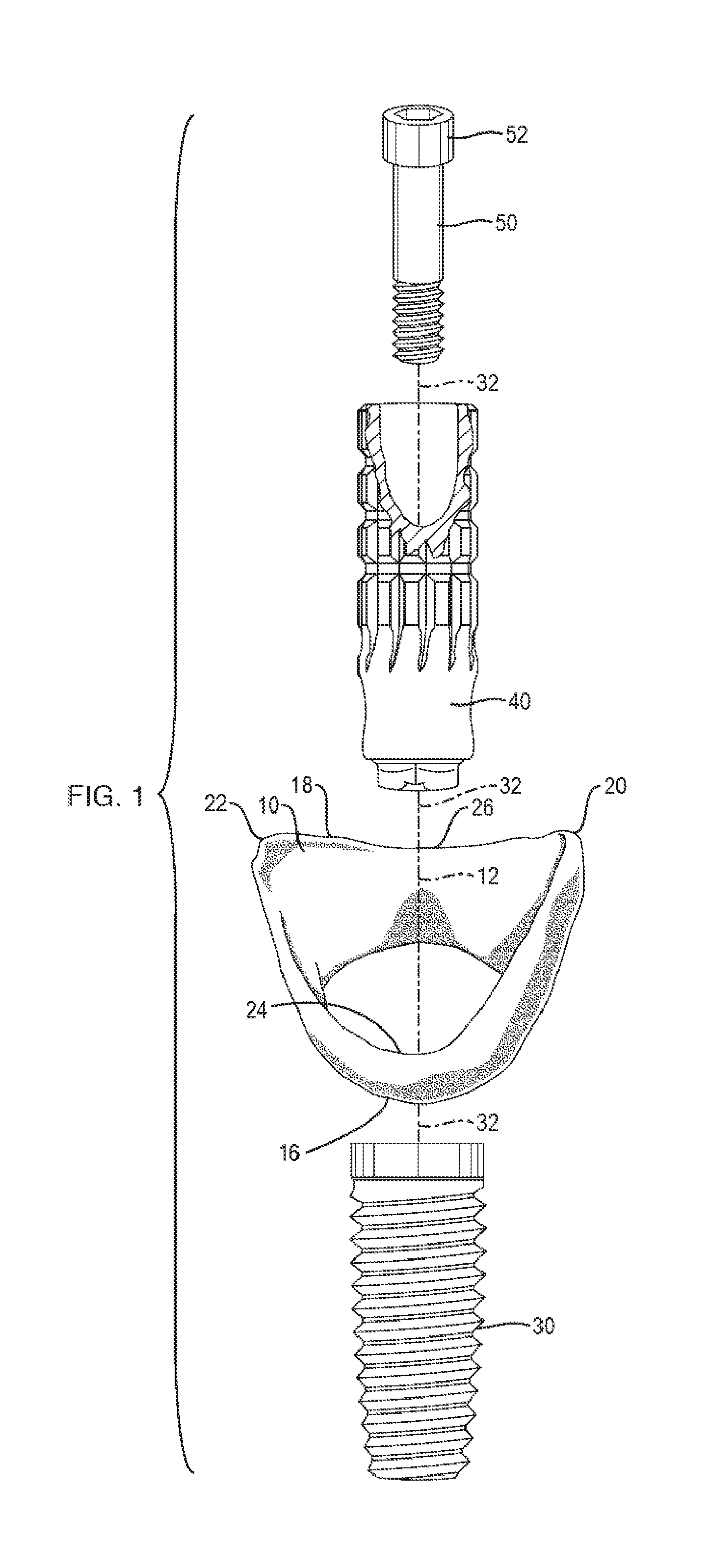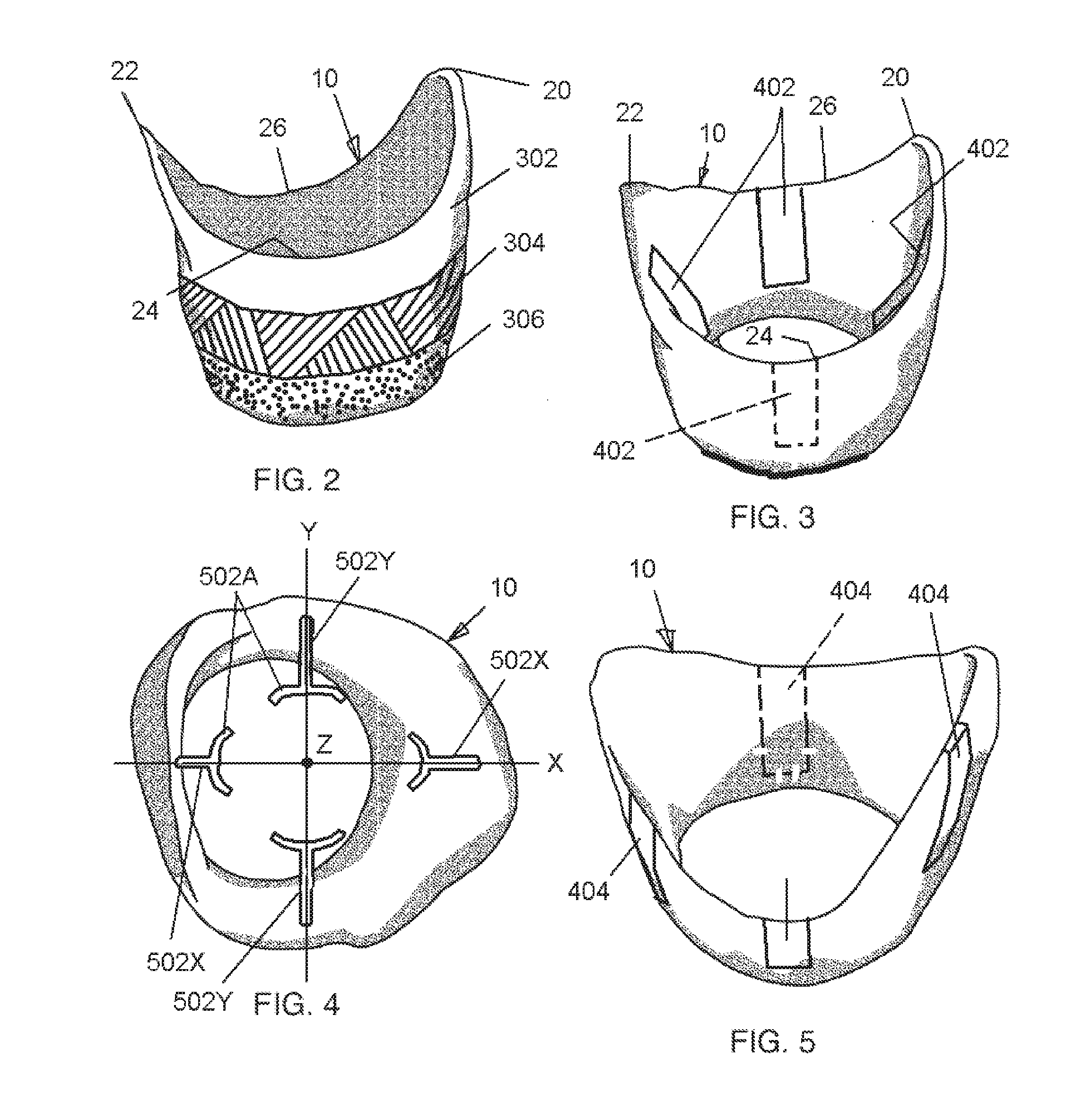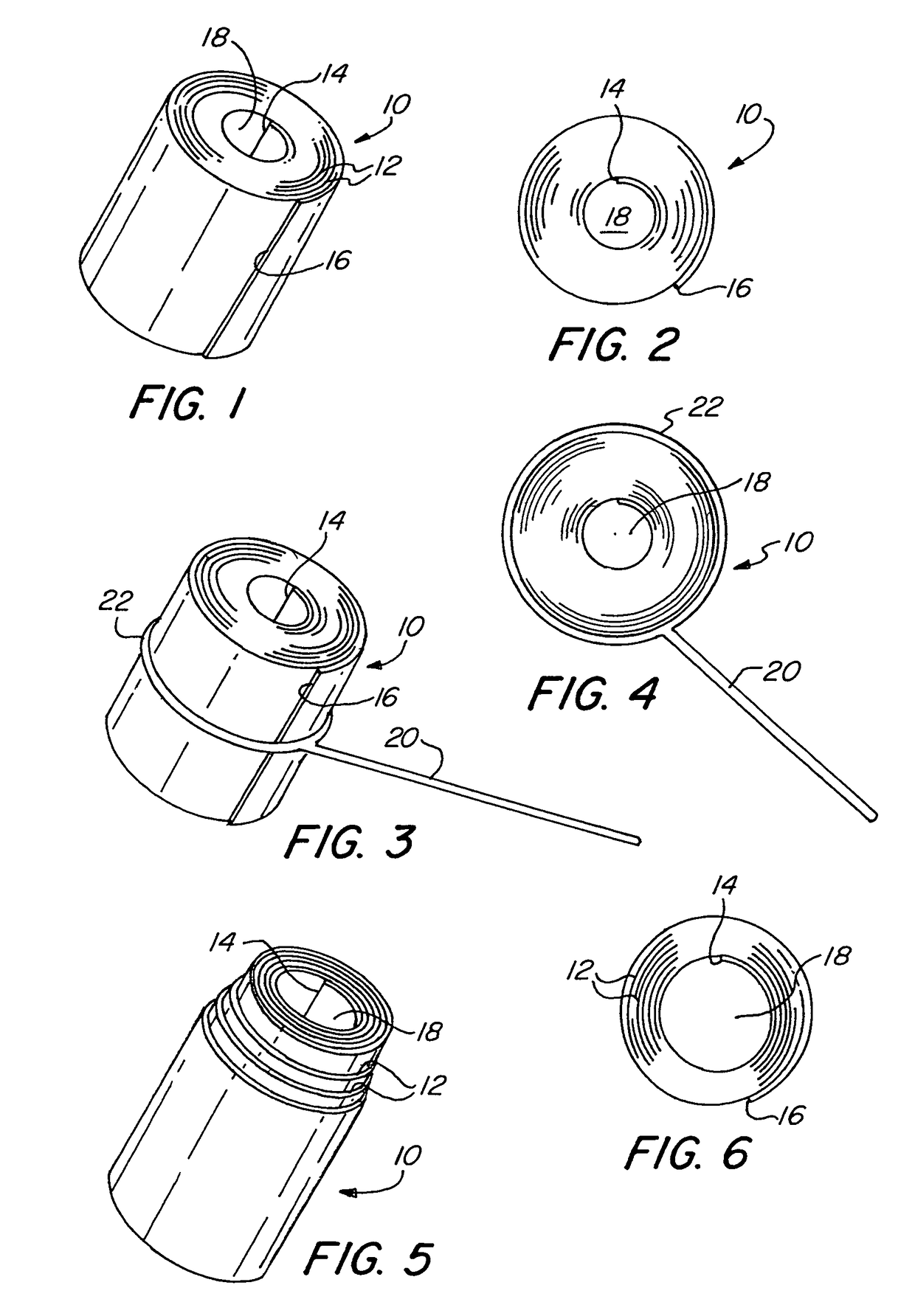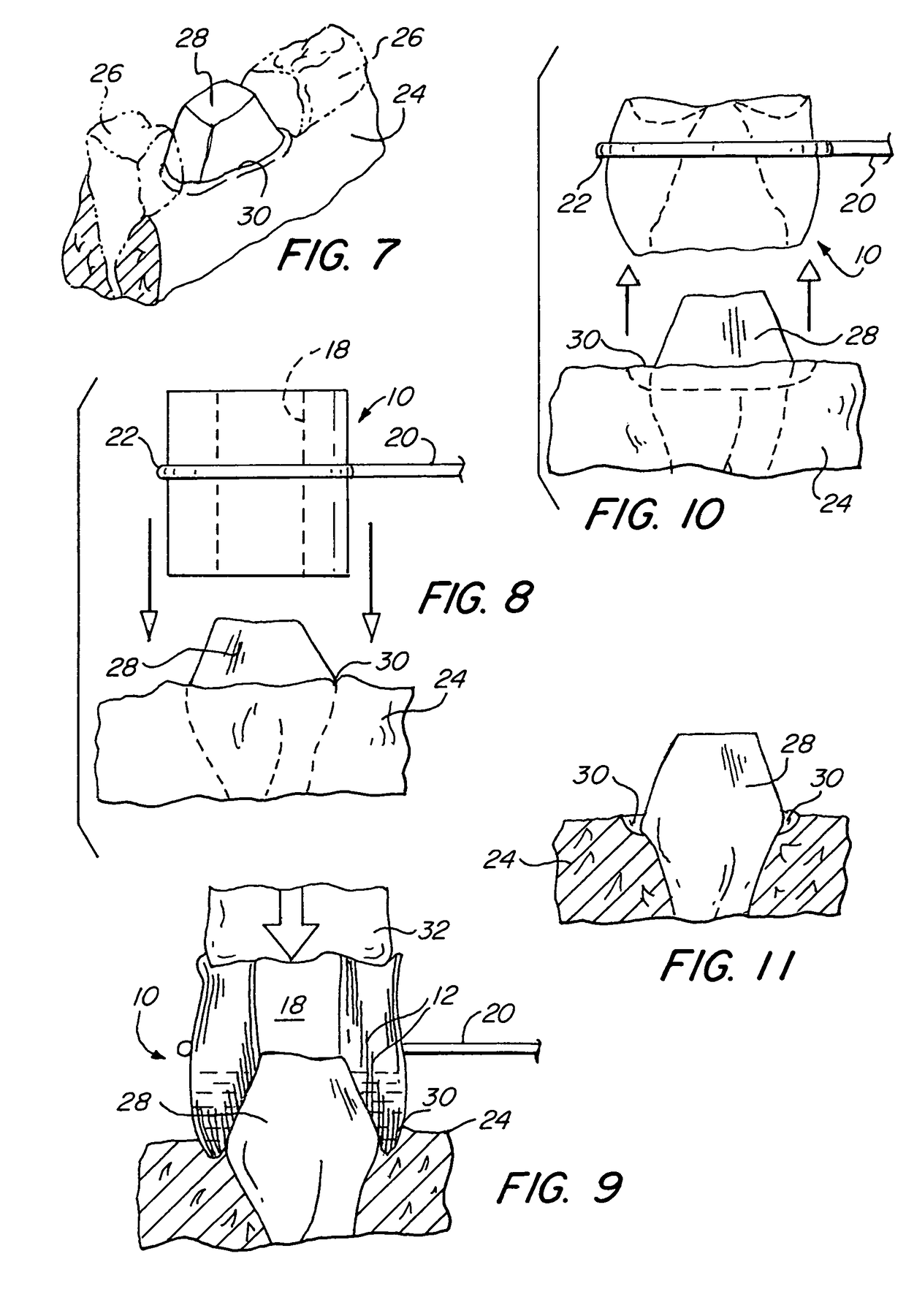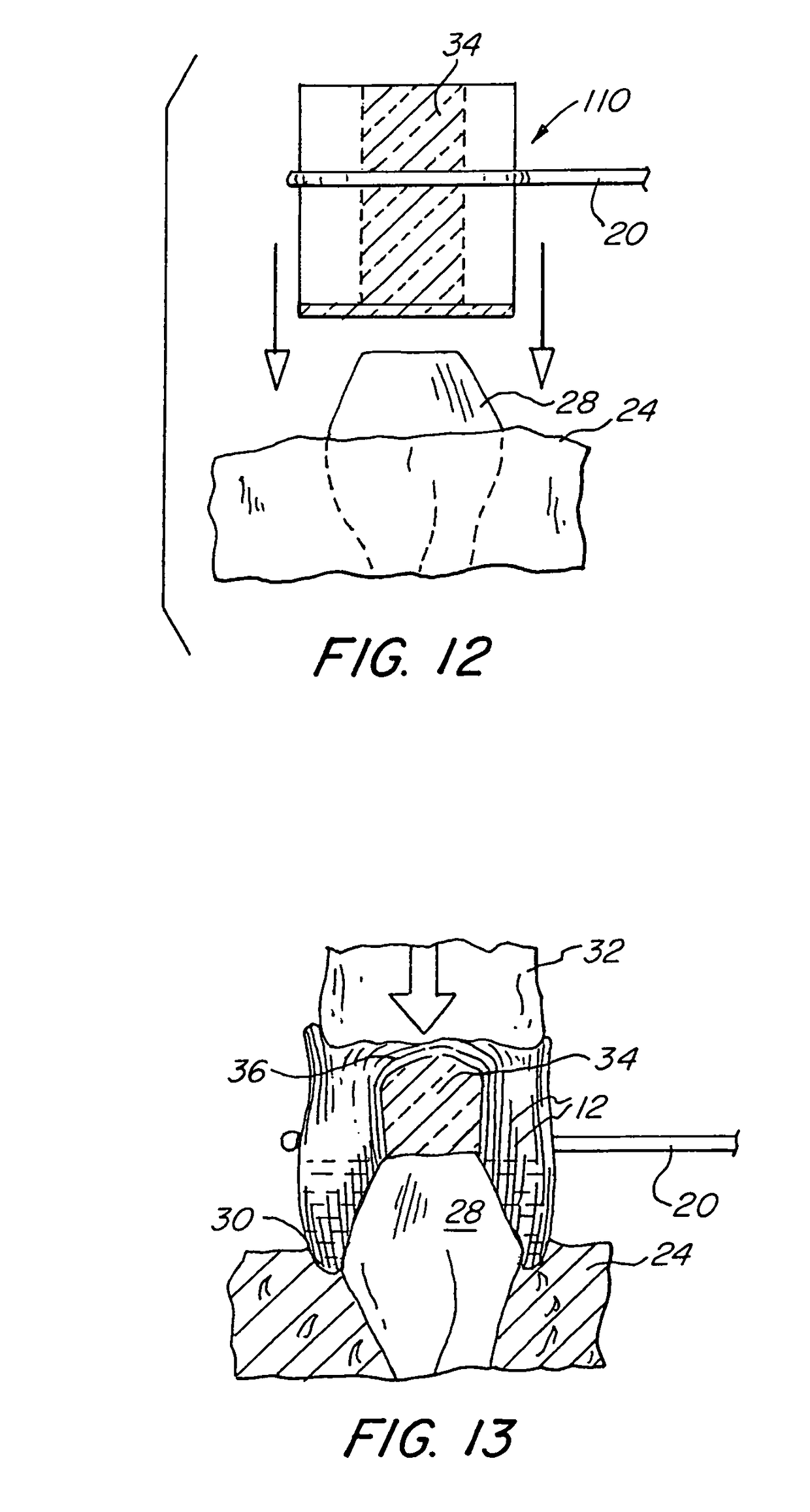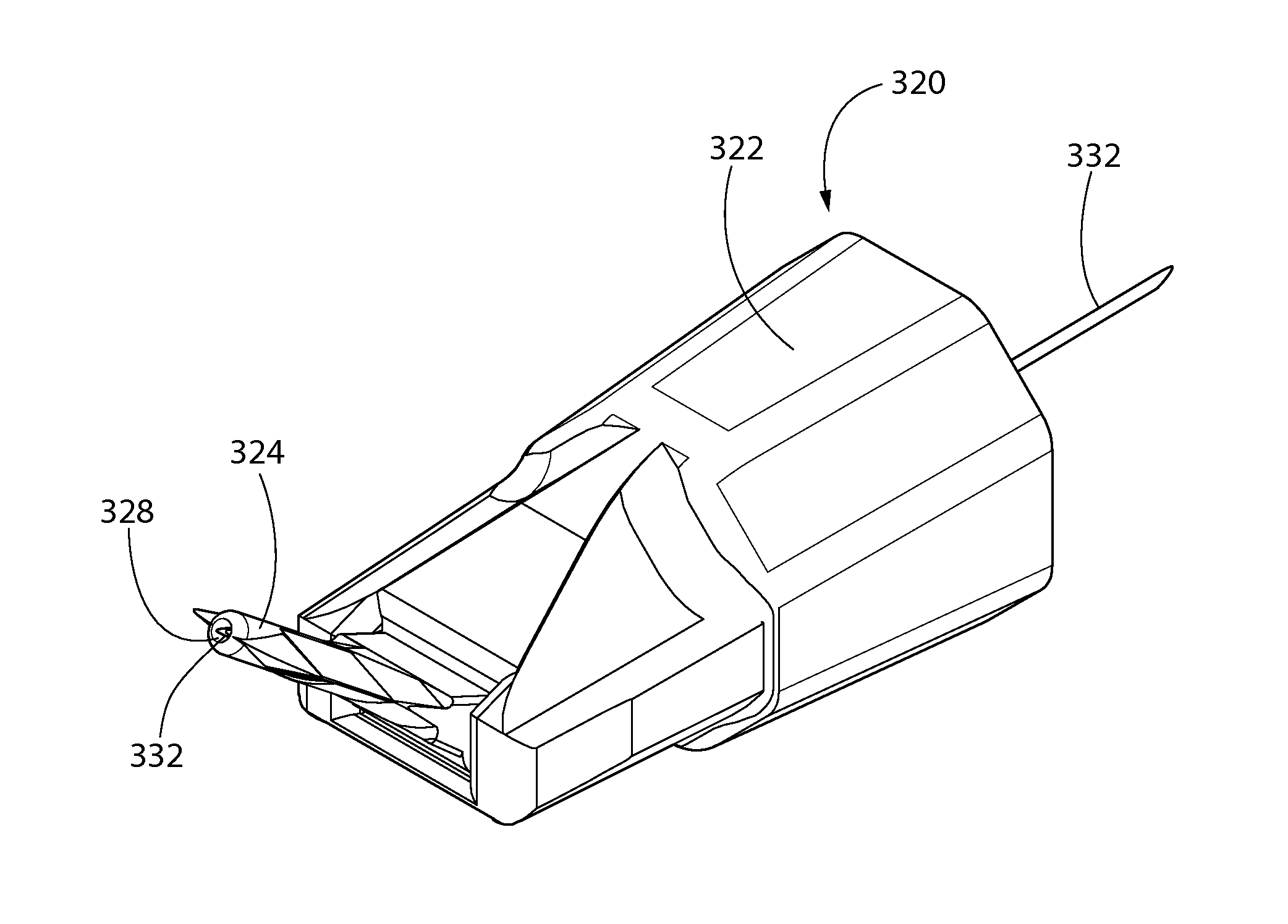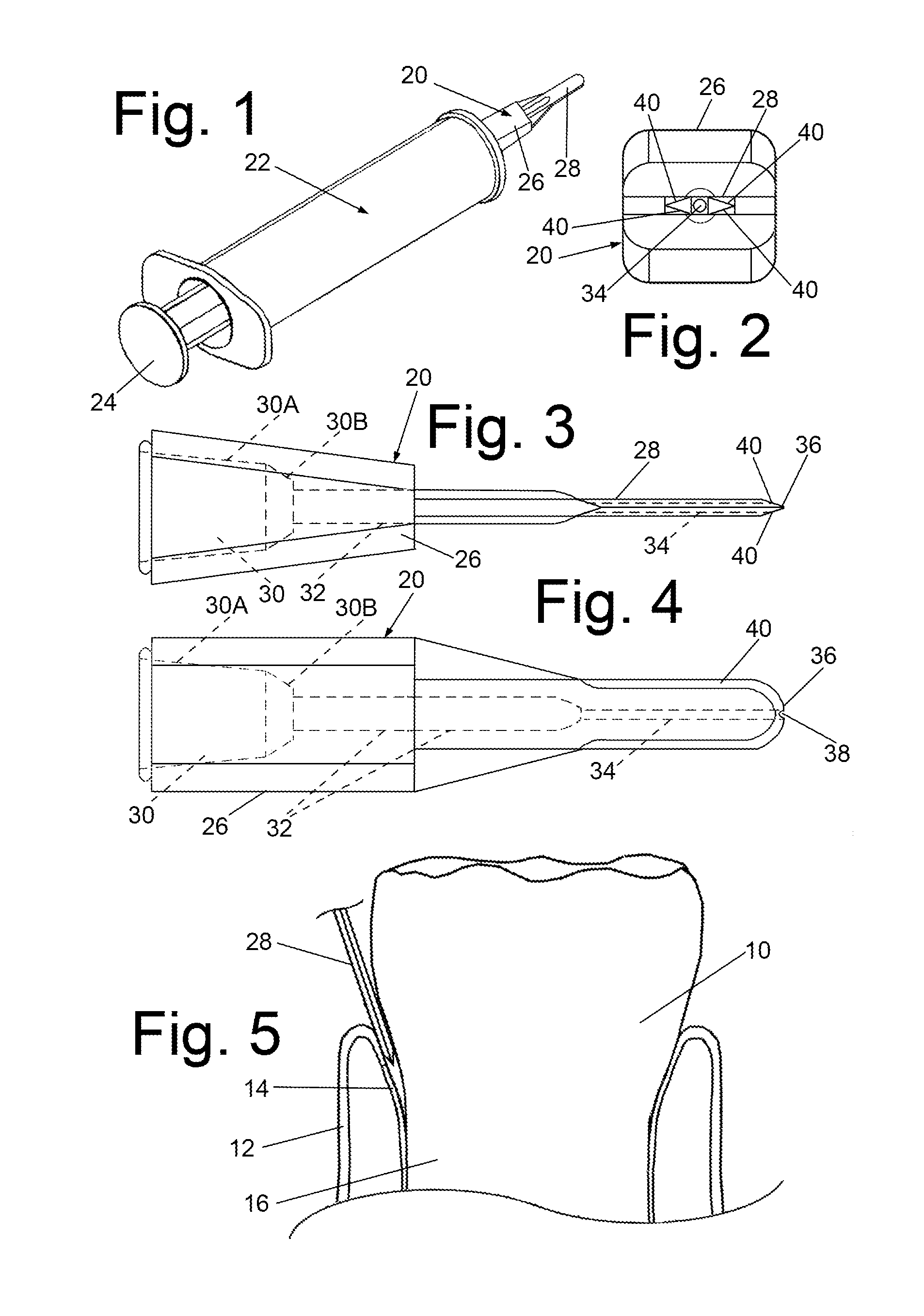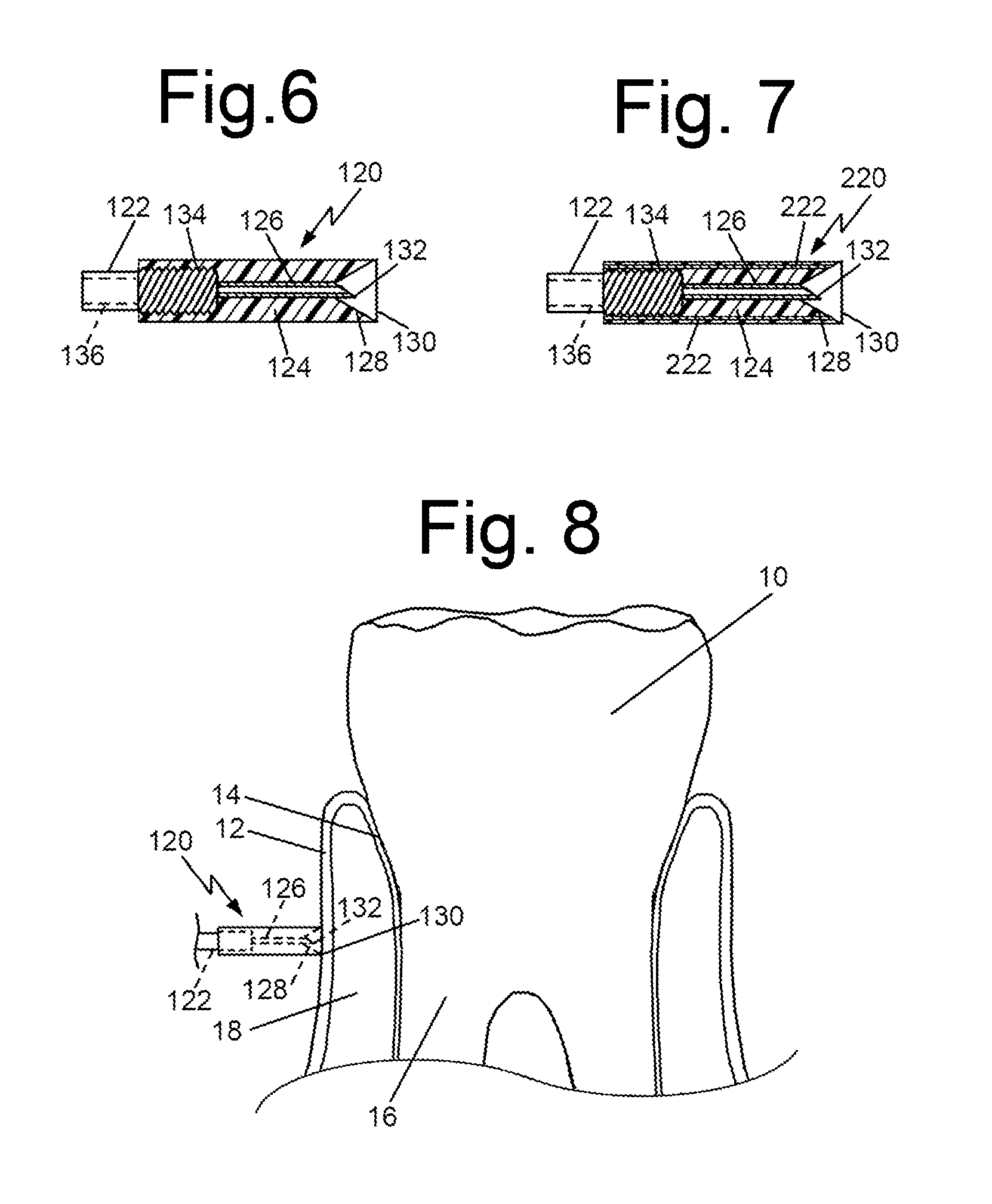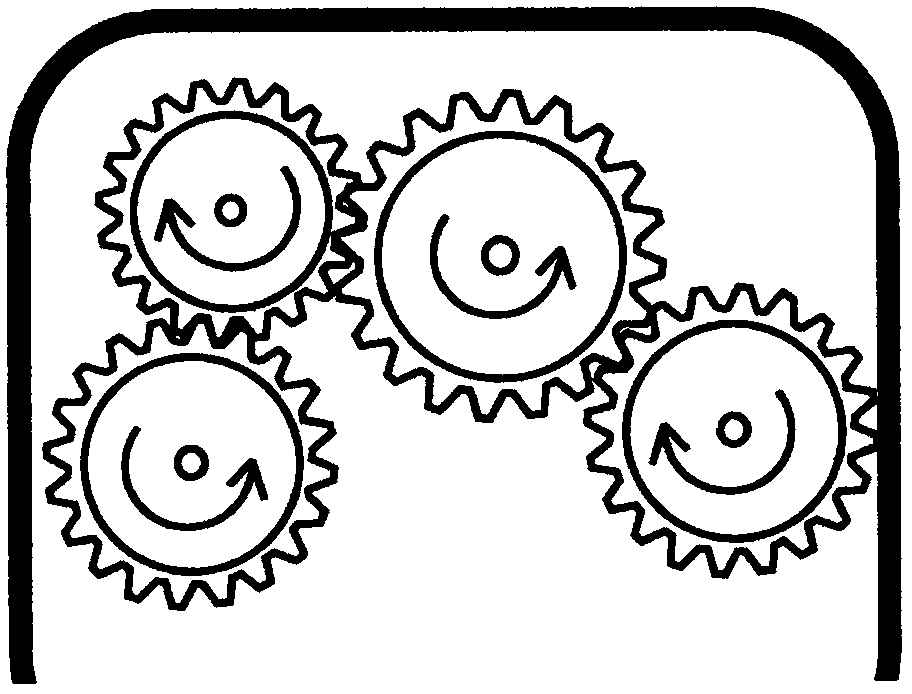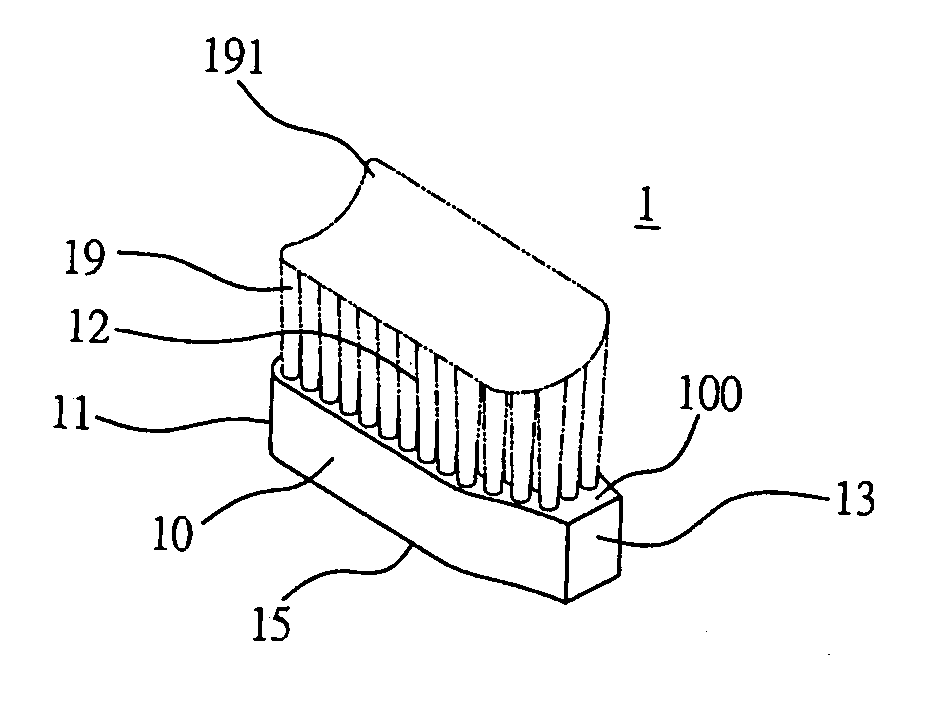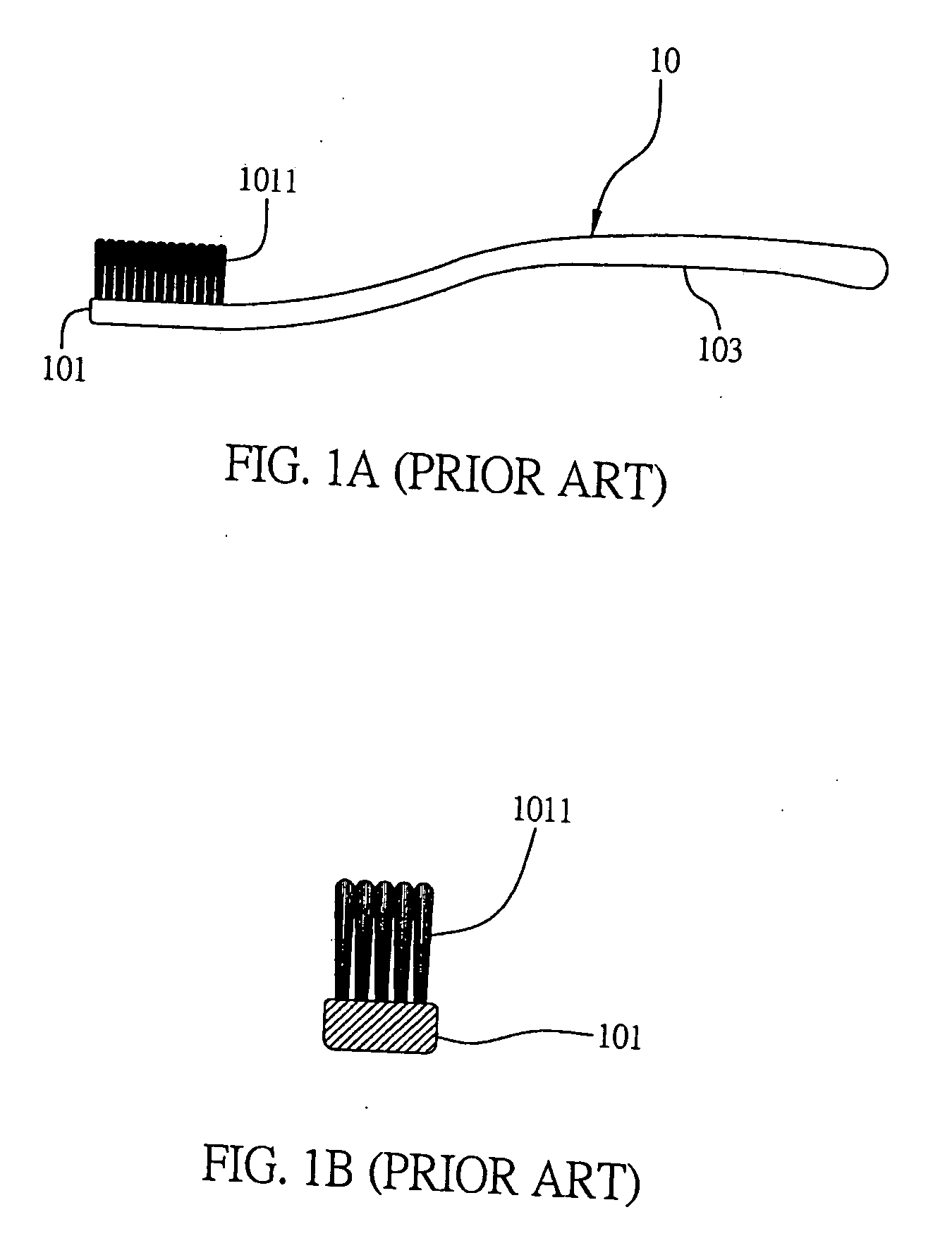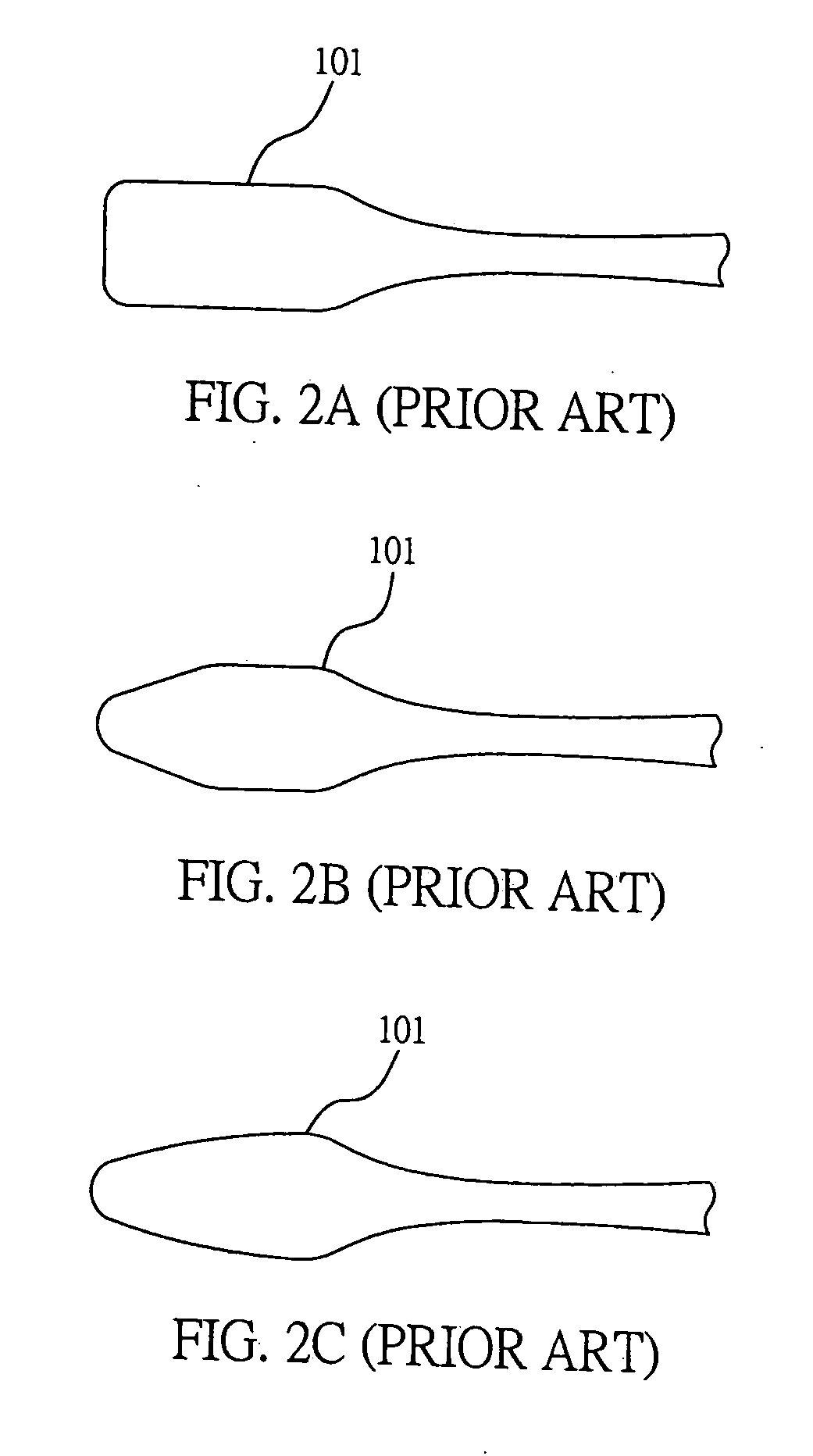Patents
Literature
54 results about "Gingival space" patented technology
Efficacy Topic
Property
Owner
Technical Advancement
Application Domain
Technology Topic
Technology Field Word
Patent Country/Region
Patent Type
Patent Status
Application Year
Inventor
The gingival sulcus is an area of potential space between a tooth and the surrounding gingival tissue and is lined by sulcular epithelium. The depth of the sulcus (Latin for groove) is bounded by two entities: apically by the gingival fibers of the connective tissue attachment and coronally by the free gingival margin.
Method and device for the retraction and hemostasis of tissue during crown and bridge procedures
InactiveUS6890177B2Positive in operationEasy to operateImpression capsDental aidsBite force quotientGingival space
A method and a device for effecting the cordless retraction of the gingival sulcus tissue prior to the taking of an impression of a tooth for making a crown or bridge which is attained by controlling any bleeding in the gingival sulcus area, and utilizing a dental dam preferably formed of a sponge or foam like material to contain an astringent fortified silicone impression material embedded about the prepared tooth, and using the patient's biting force to apply the necessary pressure onto the dam until the silicone impression material sets and adheres to the dam to enhance easy removal of the set impression material from the tooth. The dam is formed to accommodate either the posterior teeth or the anterior teeth.
Owner:CENTRIX
Gingival tissue retraction device and method
ActiveUS20070259313A1Easy to disassembleRetraction of the gingival tissue can be further enhancedImpression capsTeeth fillingGingival tissueGingival space
A method and a device for effecting the cordless retraction of the gingival sulcus tissue that includes a dam shaped to be fitted onto a tooth. In one embodiment, the well of the dam is pre-filled with a predetermined amount of a flowable retraction material having a heavy viscosity or putty consistency. The preloaded tooth dam is fitted to a prepared tooth so that when pressure is applied onto the tooth dam, the retraction material is displaced under pressure and forced into the sulcus, causing the gingival tissue to retract away from the tooth to enlarge the gingival sulcus. In another embodiment the cap is filled with a dilatant material. In another embodiment, the cap is filled with an impregnated compressible porous material. In yet another embodiment, the cap is pre-dosed with an astringent or hemostatic agent.
Owner:CENTRIX
Gingival retraction material
InactiveUS20050287494A1Drawback can be solvedHigh aspect ratioOrganic active ingredientsImpression capsFiberGingival tissue
A gingival retraction material is prepared using fibrillated fibers to improve viscosity and combining taste-modifying agent, color agent, and kaolin filler to form a paste-like structure having the viscosity ranging from 31.0×106 cP to 71.0×106 cP. The gingival material is injectable into the patient's gingival sulcus to provide a physical active force that widens the patient's gingival sulcus by means of the material viscosity and also to control gingival tissue fluid and hemostasis so as to keep the gingival sulcus dry for further mold impressions.
Owner:BIOTECH ONE
Device and a method for delivery of a dental composition
ActiveUS20110151403A1Reliably recognizeSave wasteImpression capsDental toolsGingival spaceTooth Supporting Structures
A device for use in retracting a gingiva from a human tooth by widening a gingival sulcus with a dental composition. The device comprises a cannula with a free end having an opening for dispensing the dental composition. The free end is shaped to be inserted with its front in the entry of the gingival sulcus, and to laterally displace the gingiva from the tooth as the cannula is moved in the gingival sulcus. The invention may help to achieve a reliable and cost effective gingival retraction treatment.
Owner:3M INNOVATIVE PROPERTIES CO
Soft tissue models and method of making for dental implant applications
InactiveUS20110262884A1Increase impressionAccurately indexedDental implantsGingival spaceEm coupling
The present invention relates to laboratory components that are used in the field of dental prosthesis and for dental implant fabrication and in particular to a spacer means such as a band, ring, or sleeve forming a soft collar which slips over the analog and slides up to the base of the set impression material near the collar of the impression coping as it emerges through the impression forming a uniform blockout around the impression coping which is recording the sub-gingival space over the top of the fixture and having a soft collar surrounding the neck of the analog insulates the top of the fixture analog from the hard stone where it couples with other components. The spacer forming the soft collar is particularly useful for orienting and indexing the modeling of dental implant restorations and to enhance and improve the fabrication process of soft tissue type models for conventional restoration techniques. It also enhances model techniques for digital scanning of cases in the laboratory. The soft collar spacer means forms a uniform blockout around the impression coping which is recording the sub-gingival space over the top of the fixture.
Owner:ZENA ROBERT +1
Preloaded dental dam and method for gingival tissue retraction
InactiveUS7241143B2Easy to disassembleRetraction of the gingival tissue can be further enhancedImpression capsDental toolsGingival spaceGingival tissue
Owner:CENTRIX
Method of using dental composition
InactiveUS20100248190A1High viscosityWidens the gingival sulcusImpression capsTeeth fillingGingival spaceGingival sulcus
A method for temporarily widening a gingival sulcus is provided using an uncured composition comprising a polymerizable monomer having at least one ethylenically unsaturated group, a photo polymerization initiator, a fine inorganic powder, and an astringent. The uncured composition is inserted within a gingival sulcus to be widened, and the composition is thereafter irradiated in situ to polymerize the composition. The result is a rubbery material that is easily removable from the widened sulcus.
Owner:THE KERR
Preloaded dental dam and method for gingival tissue retraction
InactiveUS20070087304A1Easy to disassembleRetraction of the gingival tissue can be further enhancedImpression capsDental toolsGingival tissueGingival space
A method and a device for effecting the cordless retraction of the gingival sulcus tissue that includes a dam shaped to be fitted onto a tooth. The dam having a peripheral wall defining a well. The peripheral wall may be either pervious or impervious to light rays and opened at at least one end. The well of the dam is pre-filled with a predetermined amount of a flowable retraction material having a heavy viscosity or putty consistency. The preloaded tooth dam is fitted to a prepared tooth so that when pressure is applied onto the tooth dam, the retraction material is displaced under pressure and forced into the sulcus, causing the gingival tissue to retract away from the tooth to enlarge the gingival sulcus. In one form of the invention, the structure of the dam enables the retraction material to mechanically bond or adhere to the internal surfaces of the dam, permitting the retraction material to be removed simultaneously with the removal of the tooth dam to leave behind a clean enlarged sulcus.
Owner:CENTRIX
Method and device for the retraction and hemostasis of tissue during crown and bridge procedures
InactiveUS20050260543A1Positive in operationEasy to operateImpression capsTeeth cappingGingival spaceSilica gel
Owner:CENTRIX
Device for local sub-gingival applications of dental medications
A device for use at least in conjunction with powdered, time-released, periodontal medication, with a view to improving at least upon problems associated with conditional applicators for such medications. Such a device may be in the shape of a hollow, half-cone with a tubular holding element attached to the top of the cone for rotational adjustments. The thin conical shape at the apex of the assisting device penetrates under the gum-line (into the gingival crevice) naturally. The device expands and maintains a sub-gingival space between the gingiva (gum-line) and the tooth. This allows the syringe tip to expulse the medication into the gingival crevice via at least three techniques.
Owner:MIGGANTZ RICHARD J
Anesthesia applicators/injectors for dental and other applications and methods of use
Disclosed are applicators and methods injecting of a liquid anesthetic into a dental patient with no or minimal pain. In accordance with one embodiment the applicator is for intraligamentary injection and includes an elongated, thin member having an open distal free formed of a resilient and somewhat conformable material suitable for producing a substantially fluid-tight interface with the anatomic structures at the gingival sulcus to inject the anesthetic therein. In another embodiment the applicator includes a flexible skirt surrounding a sharpened cannula, with the cannula being movable with respect to the skirt. The skirt is arranged to receive the anesthetic to anesthetize the gum, whereupon the cannula can then pierce the gum to inject the anesthetic into the underlying anatomic structure.
Owner:LAZAROF SARGON
Dental retraction material having enhanced fluid absorption
ActiveUS20100255443A1Efficient use ofPrecise applicationImpression capsAmalgam presses/mixersGingival spaceDental procedures
A retraction material promoting both retraction and drying of the gingival sulcus around a tooth. The retraction material comprises an astringent and an absorbing or drying agent. The retraction material is placed with a syringe and capsule around the gingival sulcus prior to the taking of an impression in a dental procedure.
Owner:CENTRIX
Soft tissue preservation temporary (shell) immediate-implant abutment with biological active surface
An immediate dental implant shell has outer, multiple zones for engaging a soft tissue socket left immediately after tooth extraction from a bone socket. The zones have combinations of different biologic agents, macro- or micro-geometric, or micro- or macro-morphology irregularities to better engage gingival sulcus, junctional epithelium and dento-gingival fiber zones of the soft tissue socket. The shell may also have various guide markings and projections to aide drilling of the implant hole in the bone socket. A dental implant is placed in the drilled implant hole before or after the shell has been placed in the soft tissue socket, and has an axis that is independent of the shell axis so the shell and implant both sit in optimum positions in their respective soft and bone sockets.
Owner:EVOLLUTION IP HLDG
Gingival retraction system
A gingival retraction system for retracting gingival tissue surrounding a selected tooth within the mouth of a subject is disclosed. In one aspect, the gingival retraction system has a gingival retraction cord and a handle. The gingival retraction cord has at least one lead portion and at least one retraction portion. Portions of the gingival retraction cord are positioned within the gingival sulcus surrounding the selected tooth. The handle can be used to tighten and shorten the portion of the gingival retraction cord positioned within the gingival sulcus surrounding the selected tooth.
Dental Crown Cementation Soft Tissue and Biologic Attachment Protective Membrane and Method of Use Thereof
InactiveUS20160030142A1Eliminate needFully coveredDental implantsTooth crownsTectorial membraneGingival space
A dental crown cementation soft tissue and biologic attachment protective membrane has a dental membrane and a membrane carrier. The dental membrane is attached within the membrane carrier for easy manual manipulation. The dental membrane is used during dental crown installation to prevent dental cement from leaking out from the interior cavity of the dental crown into the gingival sulcus and surrounding soft tissue. The dental membrane is placed atop a dental abutment onto which the dental crown is to be installed. The dental crown is pressed onto the abutment over the dental membrane, causing excess cement to be extruded from the interior cavity onto the dental membrane. The dental crown then has minimal excess cement. The dental crown is then removed as well as the dental membrane, the cement on the exterior crown surface is removed, and the adequately cemented dental crown is again attached to the dental abutment.
Owner:HAAS RONALD CRAIG
Probe for detecting substance in body and system for detecting substance in body making use of the probe
InactiveCN102028450AReal-time measurementDetermination of non-invasiveDiagnostic recording/measuringSensorsLight irradiationGingival Crevicular Fluids
Disclosed is a probe for detecting a substance in the body for detecting a substance in the body in gingival crevicular fluid. The probe includes a gingival sulcus insert section and a sensitive part. The gingival sulcus insert section can be inserted into a gingival sulcus. The sensitive part is arranged on the gingival sulcus insert section and contains a detection substance for permitting optical detection of the substance in the body. A system for detecting a substance in the body is also disclosed. The system for detecting a substance in the body includes the probe for detecting a substance in the body, a light irradiator for irradiating light onto the sensitive part in the probe, and a photodetector for detecting optical information from an inside of the sensitive part upon irradiation of light by the light irradiator.
Owner:SONY CORP
Device and a method for delivery of a dental composition
ActiveUS8882502B2Reliable fillingEasy to moveImpression capsDentistry preparationsGingival spaceTooth Supporting Structures
Owner:3M INNOVATIVE PROPERTIES CO
Oral implant abutment and manufacture method thereof
ActiveCN102525672BMeet functional requirementsReduce adhesionDental implantsArtificial teethGingival spaceSurface roughness
The invention provides an oral implant abutment and a manufacture method thereof, aiming at solving the problem that the gingival sulcus part of the existing oral implant abutment is easily adhered with bacterial plaque. The oral implant abutment provided by the invention comprises a gum-penetrating part and a gingival sulcus part, wherein the surface roughness of the gingival sulcus part is smaller than the surface roughness of the gum-penetrating part, and the gingival sulcus part is connected with the gum-penetrating part. In the technical scheme, the gingival sulcus part with smaller surface roughness is adhered with less bacterial plaque, so that imflammation generation probability surrounding the implant can be reduced; in addition, the adhesion of soft tissue can be reduced, the natural gingival sulcus can be formed, better aesthetics effect is achieved, and functional requirements on the gingival sulcus part are better met.
Owner:北京汇福康科技有限公司
Oral implant abutment and manufacture method thereof
ActiveCN102525672AMeet functional requirementsReduce adhesionDental implantsArtificial teethGingival spaceSurface roughness
The invention provides an oral implant abutment and a manufacture method thereof, aiming at solving the problem that the gingival sulcus part of the existing oral implant abutment is easily adhered with bacterial plaque. The oral implant abutment provided by the invention comprises a gum-penetrating part and a gingival sulcus part, wherein the surface roughness of the gingival sulcus part is smaller than the surface roughness of the gum-penetrating part, and the gingival sulcus part is connected with the gum-penetrating part. In the technical scheme, the gingival sulcus part with smaller surface roughness is adhered with less bacterial plaque, so that imflammation generation probability surrounding the implant can be reduced; in addition, the adhesion of soft tissue can be reduced, the natural gingival sulcus can be formed, better aesthetics effect is achieved, and functional requirements on the gingival sulcus part are better met.
Owner:BEIJING HUIFUKANG MEDICAL TECH
Systems and methods for obtaining dental impressions
InactiveUS20110129791A1Avoid flowPromote hydrodynamic flowImpression capsHard palateDental impression material
Certain embodiments of the present invention provide an apparatus to facilitate obtaining a dental impression including a compressible body. The compressible body has a top surface, a bottom surface, and an outer border. The bottom surface is configured to abut a maxillary dental impression tray. The top surface of the compressible body is configured to substantially contact and conform to a surface of a patient's hard palate. As the top surface contacts and conforms to the hard palate, it causes the compressible body to compress. The top surface forms a seal with the patient's hard palate. This seal discourages dental impression material from flowing into the patient's palatal vault. The seal may also discourage the dental impression material from flowing into the back of the patient's mouth. Consequently, the hydrodynamic pressure of the dental impression material may be advantageously increased and the patient's comfort may be reduced. Furthermore, the seal may promote a hydrodynamic flow of the dental impression material against the patient's teeth and into the corresponding gingival sulcus. When the compressible body compresses, the outer border may expand. This expansion may lead to further promotion of the hydrodynamic presser and flow of the dental impression material.
Owner:RABINOWITZ GARY
Single Use Periodontal Probe
ActiveUS20090298005A1Improve consistencyAccurate measurementTeeth fillingDental toolsMedicineGingival space
The subject invention provides single use periodontal probes. In preferred embodiments as described herein the probes of the subject invention can be used with a recording apparatus for simultaneously measuring and recording the depth of the periodontal pocket (gingival sulcus) and more particularly, to a unit employing a periodontal depth probe operably connected to a recording device, capable of producing a permanent visual record of the measured pocket depth. In further embodiments, the probes of the subject invention can be used to deliver and / or collect materials for prevention, treatment and / or diagnosis of periodontal conditions.
Owner:FLORIDA PROBE
Conforming gingiva retraction compression cap and method of retracting tissue around a tooth
InactiveUS20090075240A1Directly appliedEasy and inexpensive to manufactureImpression capsTeeth fillingGingival spaceMechanical pressure
A rolled compression cap having a central bore. The rolled compression cap has adjacent layers that slide or telescope to conform to the prepared tooth and to apply more direct mechanical pressure to the interface between the prepared tooth and the gingiva. The gingiva or gum retracts from the tooth forming or widening a gingival sulcus. This improves the preparation of the tooth for taking an impression and fitting a crown or cap. In one embodiment, a rolled compression cap is pre-dosed or soaked with an astringent material or retraction agent. In another embodiment, the central bore of the rolled compression cap is filled with a paste-like or gel material containing an astringent or hemostatic agent.
Owner:CENTRIX
Coated dental implants
InactiveUS20070122768A1Inhibition formationRisk minimizationDental implantsImpression capsGingival spaceDental implant
The present invention relates to coated dental implants which allow a sufficient take of the gingiva onto said dental implants, thereby preventing inter alia gingival sulcus and bacterial infections of the gingiva and methods of using said coated dental implants for preventing the formation of gingival sulcus and bacterial infection upon their implantation into a patient.
Owner:CELONOVA BIOSCIENCES GERMANY GMBH (DE)
Toothbrush handle and toothbrush
The invention discloses a toothbrush handle and a toothbrush. The toothbrush handle and the toothbrush facilitate gingival sulcus dental plaque cleaning by users. According to the technical scheme, a toothbrush handle comprises a base capable of being held by a user, one end of the base is provided with a connecting end for mounting an external brush head, and the holding surface of the base is provided with a first extending surface and a second extending surface; on the cross-section diagram of the base, the first extending surface and the second extending surface are fundamentally symmetrically arranged long the central line of the base, the obtuse angle formed between the first extending surface and the central line ranges between 130 degrees and 140 degrees., and he obtuse angle formed between the second extending surface and the central line ranges between 130 degrees and 140 degrees; when the external brush head is mounted at the connecting end, the central line is fundamentally positioned onto the brush hair symmetric surface of the external brush head.
Owner:深圳缇铭科技有限公司
Gingival tissue retraction device and method
ActiveUS7942669B2Easy to disassembleRetraction of the gingival tissue can be further enhancedImpression capsTeeth fillingGingival tissueGingival space
A method and a device for effecting the cordless retraction of the gingival sulcus tissue that includes a dam shaped to be fitted onto a tooth. In one embodiment, the well of the dam is pre-filled with a predetermined amount of a flowable retraction material having a heavy viscosity or putty consistency. The preloaded tooth dam is fitted to a prepared tooth so that when pressure is applied onto the tooth dam, the retraction material is displaced under pressure and forced into the sulcus, causing the gingival tissue to retract away from the tooth to enlarge the gingival sulcus. In another embodiment the cap is filled with a dilatant material. In another embodiment, the cap is filled with an impregnated compressible porous material. In yet another embodiment, the cap is pre-dosed with an astringent or hemostatic agent.
Owner:CENTRIX
Soft tissue preservation temporary (SHELL) immediate-implant abutment with biological active surface
Owner:EVOLLUTION IP HLDG
Conforming gingiva retraction compression cap and method of retracting tissue around a tooth
InactiveUS8118595B2Directly appliedEasy and inexpensive to manufactureImpression capsTeeth fillingGingival spaceMechanical pressure
A rolled compression cap having a central bore. The rolled compression cap has adjacent layers that slide or telescope to conform to the prepared tooth and to apply more direct mechanical pressure to the interface between the prepared tooth and the gingiva. The gingiva or gum retracts from the tooth forming or widening a gingival sulcus. This improves the preparation of the tooth for taking an impression and fitting a crown or cap. In one embodiment, a rolled compression cap is pre-dosed or soaked with an astringent material or retraction agent. In another embodiment, the central bore of the rolled compression cap is filled with a paste-like or gel material containing an astringent or hemostatic agent.
Owner:CENTRIX
Articulating applicators/injectors for administration of liquid anesthetic and other liquids
Disclosed are applicators and methods for injecting a liquid, such as anesthetic, into a patient with no or minimal pain. The applicator includes a coupling and a blade rotatably mounted on the coupling. The coupling is arranged to receive a cartridge in which a cannula is mounted such that the cannula extends through a proximal channel of the coupling and into a distal channel of the blade. The coupling is further arranged to secure the applicator to a source of liquid such that the liquid can be selectively introduced into and through the cannula into the tissue of the patient. The blade is thin enough for atraumatic insertion into a gingival sulcus of the patient.
Owner:LAZAROF SARGON
Forward tooth protecting electric toothbrush
The invention discloses a forward tooth protecting electric toothbrush. The forward tooth protecting electric toothbrush comprises a toothbrush body, batteries are arranged in a brush handle of the toothbrush body, the batteries are electrically connected with a motor through a lead, and a switch is arranged on the lead; an output terminal of the motor is fixedly connected with a rotation shaft, the other end of the rotation shaft is fixedly connected with a third plastic gear, and a left-end rotating shaft of the third plastic gear is fixedly connected with an upper toothbrush head; a fourthplastic gear is engaged with a lower end of the third plastic gear, and the left-end rotating shaft of the fourth plastic gear is fixedly connected with a left toothbrush head; the left-end rotating shaft of the first plastic gear is fixedly connected with a right toothbrush head, and a protection pad is fixedly connected with an outside part of a brush head of the toothbrush body. The design of the electric toothbrush is novel, three hairbrush heads are arranged, tooth, slit between teeth and gingival sulcus can be brushed through forward rotation, dead corner-free cleaning can be thoroughlyrealized, and the electric toothbrush can effectively prevent the gum from bleeding and protect teeth from being broken, and reduces oral diseases.
Owner:宁波正青创意产品设计有限公司
Brush head and toothbrush with the brush head
InactiveUS20070039112A1Improve cleaning efficiencyEasy to cleanBristle carriersBristleBristleGingival space
A brush head and a toothbrush with the brush head are provided. The brush head includes a body having a front end, a back end opposing the front end, and two opposite sides; and a brush member mounted on a surface of the body and being formed with a plurality of bristles, wherein the plurality of bristles define a brush surface that slopes in relation to the surface of the body. The brush surface of the bristles can closely abut against the teeth and the gingival sulcus, and the cleaning effect of tooth brushing is efficiently enhanced using the toothbrush with the brush head, thereby overcoming the drawbacks of the prior art.
Owner:KO YU MAN +1
Features
- R&D
- Intellectual Property
- Life Sciences
- Materials
- Tech Scout
Why Patsnap Eureka
- Unparalleled Data Quality
- Higher Quality Content
- 60% Fewer Hallucinations
Social media
Patsnap Eureka Blog
Learn More Browse by: Latest US Patents, China's latest patents, Technical Efficacy Thesaurus, Application Domain, Technology Topic, Popular Technical Reports.
© 2025 PatSnap. All rights reserved.Legal|Privacy policy|Modern Slavery Act Transparency Statement|Sitemap|About US| Contact US: help@patsnap.com
